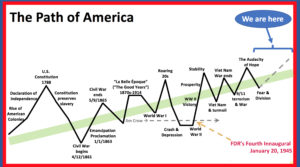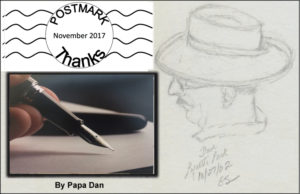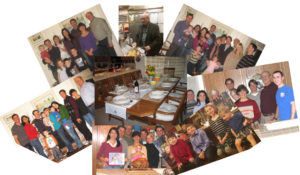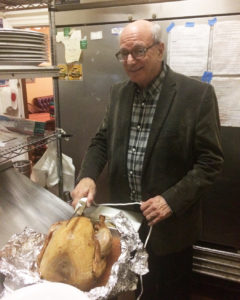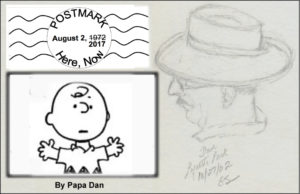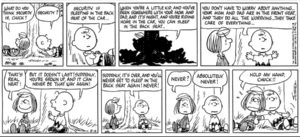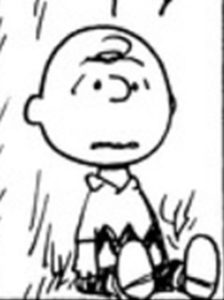Archive for Ideas
Did A Human Write This?
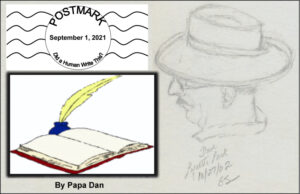
Last Fall
New York Times Columnist Farhad Manjoo
wrote a piece called:
Did a Human Write This?
Well?
Click here for a PDF of this post: Did_A_Human_Write_This_SEPT1_FINAL
= = = = = = = = = = = = = = = = = = = = = = = = = = = = = = = = = = = = = = = =
In the Fall of 2020, a columnist named Farhad Manjoo reported in The New York Times something that many of us have come to realize — that machines have been gaining in their ability to write for a long time now; and, he says, “they are getting terrifyingly good at it.” Many people and businesses have greeted this news with appreciation, for it can enhance our ability to do our work in many useful ways. So, why does Mr. Manjoo use the phrase “terrifyingly good” to describe this phenomenon? … (pause here a moment for internal reflection) … In another sentence, he nudges a bit closer to our real, human, concern — “I’ve never really worried that a computer might take my job because it’s never seemed remotely possible.” However, he goes on to introduce us to a relatively new piece of software, a “language model” called GPT-3 that seems to contradict this reassuring sentence. Apparently, you can “program” this software language model by providing a writing sample. It claims to be able to match the pattern and “learn to write” in the same style as a human writer would.
Hmmmmmmmmmmmm …
So, the subject of Mr. Manjoo’s piece, “Did A Human Write This?”, is intriguing in itself;
BUT here, in THIS piece of writing, I am asking a question that intrigues me much more:
–> “How Can You Tell?” <—
In other words, if we claim that we can tell that a human and not a computer wrote something, what is it about the writing that would enable us to make that distinction?
Let’s explore this question.
Human Attributes: “The Usual”
Over centuries, humans have identified a set of attributes that we claim for ourselves as distinctly human. Some of these capabilities are fundamentally cognitive, like these two:
• The ability to recognize and remember a set of sequential stimuli and complex patterns
• A high-level ability to generate and comprehend complex language.
Computer programmers and software developers attest that computers can certainly do these two things in ways that sufficiently imitate human performance. Even if that’s true, I don’t think these are the determining factors in recognizing a human source for a piece of writing.
There are other recognized human attributes that are much more closely associated with what we think of as our “humanity,” like these two examples:
• empathy — the ability to understand and share the feelings of others
• the ability to recognize and apply patterns of moral and ethical decision-making.
So, I ask: can these two examples of “humanistic” attributes be simulated or credibly imitated — heck, independently performed — by computer systems in ways that we would recognize? Can the resulting writings sound human? The makers of modern “language models” claim that they can. You and I might claim that we can tell whether attempts are genuinely human or computer-generated imitations. BUT, that would just lead to an argument between us and software engineers; and we might not win that argument. Once again, I don’t whether those are the determining factors either. So, let’s set that aside for a moment. So, let’s go back to Mr. Manjoo’s question in the New York Times: if computers could possess those abilities, does that mean that computers can take jobs being done today by our human writers? Can computers make human writers obsolete? I’ll give you my answer.
My Answer: I’m saying “No”
There are formulations I have seen in the work of human writers over centuries (and in my own writing) that demonstrate distinctly human patterns of thought. I insist that these patterns are evidence of our human-ness that we can all recognize in our own behavior, and in the behavior of others, as distinctly human. They are NOT, I insist, patterns that computers would generate on their own. Even if they could, after looking at some examples, one can’t help but ask, “Why would a computer want to intentionally imitate these human patterns of thought and expression? (It’s not an unreasonable question to ask why humans would want to exhibit these patterns, but we can leave that for another time.) What are they? Let’s examine three examples of traits that human writers have attributed to their human characters, both in fiction and nonfiction:
• The propensity for lapses in memory, and patterns of incongruity
• The potential of individuals to hold opposing and contradictory views simultaneously
• The habit of some individuals to act in ways that are contrary to their own best interests.
Well, now maybe we’re getting closer to answering our question. These are human behaviors that appear repeatedly in writing about human characters. I am not convinced that writing generated entirely by computer software would or could feature these behaviors unless guided by an interfering human. On further reflection, even if they could, I don’t think these are the most important features that could answer the question: can computers make human writers obsolete?
Below are what I claim are the three principal indictors that matter: human attributes that writers portray in their characters that exhibit the most common elements of our humanity. Without these examples (and I’m sure there are others), much of our literature would be deficient:
• Digression, also known as ‘stream of consciousness’ thinking
• Silliness
• Illogic
Perhaps there are other examples, but let’s look at these three.
The Three Human Indicators: What do we see in Human Storytelling?
ONE: Digression: A lot of great American literature is built, at least in part, by this feature.
“… but as I was saying when … “ or “let’s set that aside for a moment”
Literature is full of examples of “stream of consciousness” storytelling in which the “voice” of the story speaks to the reader directly and digresses from the telling to share seemingly random thoughts along the way — Jack London (“To Build a Fire”), Ambrose Bierce (“Occurrence at Owl Creek Bridge”), Edgar Allen Poe (“The Tell-Tale Heart”), Mark Twain (“Speech On The Weather” and many others), Kate Chopin (“The Night Came Slowly”), are impressive examples.
It is interesting to me that some of the best examples of digression are not just found in stories, but also poems. In one of my favorite pieces of distinctly human literature, Robert Frost uses digression to capture an important element of imaginative reminiscence. In his poem “Birches,” Frost imagines a boy bending the branches of his father’s birch trees. He retells an entire childhood scenario of the boy climbing the trees in a particularly stylish way while doing his chores — “as he went out and in to fetch the cows.” A boy’s entire world view is shaped by this imaginary process. BUT then we discover that it’s all a digression. We hear that the speaker in the poem IS this boy, and then, as the poem brings us back to reality, it turns out that the ice storm is what bends the branches into their particular shape; but he would rather imagine something else:
But I was going to say when Truth broke in
With all her matter-of-fact about the ice-storm
I should prefer to have some boy bend them
As he went out and in to fetch the cows—
For Robert Frost, in his own recollection … or maybe in his imagination … he IS that boy:
So was I once myself a swinger of birches.
And so I dream of going back to be.
It’s when I’m weary of considerations,
He goes on to describe what it means to be “weary of considerations.” His imagination allows him to escape “considerations,” “rise toward heaven,” but return to earth because:
Earth’s the right place for love:
I don’t know where it’s likely to go better.
So, reality wins out over imagination … but … he concedes that the life of his imagination is not a bad place to visit:
One could do worse than be a swinger of birches.
But … I digress (you knew that was coming, eh?)
To return to Mr. Manjoo’s question — No, a computer could not have used such a digression from reality to imagination and then back again to reality to convey important messages about being human. Only a human could do that.
Below is the full text of Frost’s poem (you were hoping for that, eh?) It’s chock full of examples that confirm that no computer program imaginable could tell a story that takes you inside the human mind and heart the way these words do.
Birches, By Robert Frost
When I see birches bend to left and right
Across the lines of straighter darker trees,
I like to think some boy’s been swinging them.
But swinging doesn’t bend them down to stay
As ice-storms do. Often you must have seen them
Loaded with ice a sunny winter morning
After a rain. They click upon themselves
As the breeze rises, and turn many-colored
As the stir cracks and crazes their enamel.
Soon the sun’s warmth makes them shed crystal shells
Shattering and avalanching on the snow-crust—
Such heaps of broken glass to sweep away
You’d think the inner dome of heaven had fallen.
They are dragged to the withered bracken by the load,
And they seem not to break; though once they are bowed
So low for long, they never right themselves:
You may see their trunks arching in the woods
Years afterwards, trailing their leaves on the ground
Like girls on hands and knees that throw their hair
Before them over their heads to dry in the sun.
But I was going to say when Truth broke in
With all her matter-of-fact about the ice-storm
I should prefer to have some boy bend them
As he went out and in to fetch the cows—
Some boy too far from town to learn baseball,
Whose only play was what he found himself,
Summer or winter, and could play alone.
One by one he subdued his father’s trees
By riding them down over and over again
Until he took the stiffness out of them,
And not one but hung limp, not one was left
For him to conquer. He learned all there was
To learn about not launching out too soon
And so not carrying the tree away
Clear to the ground. He always kept his poise
To the top branches, climbing carefully
With the same pains you use to fill a cup
Up to the brim, and even above the brim.
Then he flung outward, feet first, with a swish,
Kicking his way down through the air to the ground.
So was I once myself a swinger of birches.
And so I dream of going back to be.
It’s when I’m weary of considerations,
And life is too much like a pathless wood
Where your face burns and tickles with the cobwebs
Broken across it, and one eye is weeping
From a twig’s having lashed across it open.
I’d like to get away from earth awhile
And then come back to it and begin over.
May no fate willfully misunderstand me
And half grant what I wish and snatch me away
Not to return. Earth’s the right place for love:
I don’t know where it’s likely to go better.
I’d like to go by climbing a birch tree,
And climb black branches up a snow-white trunk
Toward heaven, till the tree could bear no more,
But dipped its top and set me down again.
That would be good both going and coming back.
One could do worse than be a swinger of birches.
TWO: Silliness
Illustrating another distinctly human attribute — here is a childhood ditty that got translated into something that endured for more than a century:
Mares eat oats and does eat oats and little lambs eat ivy
A kidd’l eat ivy too, wouldn’t you?
That ended up being translated by generations of kids into this human silliness:
Marsey-dotes and dosey-dotes, and little lambsey-divey
A kidd’ldey-divey-doo, wouldn’t you?
Literature throughout western civilization is full of enduring uses of silliness to demonstrate a host of human values and truths. Monty Python is a modern example. We can go back a bit farther to Don Quixote by Cervantes and some of the writings of Roald Dahl with his “vocabulary of made-up words.” Even the ancient Greeks made use of silliness to make people giggle many centuries ago. For more — take a look into a book by art critic Peter Timms Silliness, A Serious History, which looked at the ways we’ve been made to laugh in pursuit of serious themes through our literary history.
These examples affirm the assertion that a computer is not capable of using our innate human silliness to write something that is purely fun and ridiculous without resorting to some bit of logical sense. Only humans are sufficiently silly to reveal that aspect of our human selves.
THREE: Illogic: Spock’s breakthrough
The masterful writing of Gene Roddenberry in the TV series Star Trek, repeatedly illustrated the effect of combining human (i.e., Earthling) and nonhuman (i.e., Vulcan) attributes. In the episode “The Galileo Seven (co-written by Oliver Crawford),” Lt. Commander Spock illustrates, as always, the contrast between his Vulcan dependence on logic as the overriding guiding principle of all of his decisions and the more “human” decision-making typical of Captain Kirk, which sometimes utilized emotion and impulsive reliance on intuition.
In this story, Spock is commander of a landing spacecraft whose small crew launched from The USS Enterprise to land on a small planet and solve a life-threatening problem. When the expedition went awry and trapped Spock on the planet’s surface, the crew risked the safety of their ship to save Spock’s life. He had ordered them to take off without him to save the ship and crew (a logical order); but they disobeyed his order by applying their human compassion, risked their own lives, and went back to the planet to save him. Although he reprimanded them for their illogical decision, what followed was a decision he had to make to save them all from certain destruction.
For technical reasons, the Starship Enterprise was unable to locate the Galileo to beam them back to the ship. With fuel running out, the Galileo and all on board, appear to be doomed to fall and burn up in the planet’s atmosphere. Spock’s response was, for him, illogical — he launched and ignited the remaining fuel tank — ending their control of the ship — effectively sending up a flare. The slim hope was that the Enterprise, heading in a different direction, would see it and determine their location well enough to beam them aboard and save them all.
MCCOY: It may be the last action you’ll ever take, Mr. Spock, but it was all human.
SPOCK: Totally illogical. There was no chance.
MCCOY: That’s exactly what I mean.
At the last moment, as the ship begins to burn up, transporter beams lock onto the crew members and transport them safely onboard the Enterprise.
Back on duty, a bemused Captain Kirk questions Spock about his last-minute command decision:
KIRK: There’s really something I don’t understand about all of this. Maybe you can explain it to me. Logically, of course. When you jettisoned the fuel and ignited it, you knew there was virtually no chance of it being seen, yet you did it anyhow. That would seem to me to be an act of desperation.
SPOCK: Quite correct, Captain.
KIRK: Now we all know, and I’m sure the doctor will agree with me, that desperation is a highly emotional state of mind. How does your well-known logic explain that?
SPOCK: Quite simply, Captain. I examined the problem from all angles, and it was plainly hopeless. Logic informed me that under the circumstances, the only possible action would have to be one of desperation. Logical decision, logically arrived at.
KIRK: I see. You mean you reasoned that it was time for an emotional outburst.
SPOCK: Well, I wouldn’t put it in exactly those terms, Captain, but those are essentially the facts.
KIRK: You’re not going to admit that for the first time in your life, you committed a purely human emotional act?
SPOCK: No, sir.
KIRK: Mr. Spock, you’re a stubborn man.
SPOCK: Yes, sir.
Illogic is such an intrinsic feature of human behavior and understanding that only a human writer would be capable of expressing is convincingly. It is one of the clear qualities of human writing that cannot be successfully imitated by a computer. We humans recognize it when we see it.
So, no, the jobs of human writers are not in danger of being overtaken by computers. End of discussion. So says the human writer.
![]()
A Writer Tries to Emerge from a COVID Fog
Planning and Optimism
Click here to download a PDF of this post: Writer_COVID_fog_Jul18_ConVivio
I am sitting here at my computer screen, trying to do something that has been easy and familiar for a long time.
Before the COVID took over our collective consciousness in early 2020, I had kept myself happily engaged with my writing. To illustrate, during the twelve months of 2019, I wrote 21 stories and essays that I posted to my website at ConVivio-online.net. Prior to that, I had posted 20 pieces in 2018 and 18 pieces in 2017. I also wrote several chapters of my “long family story”; I wrote three chapters of “The Flying Pig Novel”; fabricated two time-travel pieces, and started thinking about writing Act Two of the one-act play I had written in 2013 called “Some Explaining to Do.” Friends of mine got to contribute their favorite poetry as guests to a series of ConVivio posts acknowledging “National Poetry Month.” In addition, each month during those years I prepared a piece of writing to read to the group at monthly meetings of The Whistlestop Writers at The Swirl — a wine bar in Livermore. So, my writing was humming along pretty well in 2017, 2018, and 2019 — and well before that — AND that writing had an audience.
But then, a dramatic change happened — COVID-19 arrived and took possession of us all. In all of 2020, and through July of 2021 — over the span of 19 months — I posted only eight (8) pieces of writing to my website and I wrote NOTHING for The Whistlestop Writers, which had been suspended because of the virus. I couldn’t count the number of times, I sat at my computer and stared at drafts of ‘next chapters’ and got nowhere. I guess we can say that was a dramatic drop-off, eh? In conversations with other writers, I have learned that this effect has become fairly common. So, what happened?
A Change of Venue
One big change was the fact that, because of COVID-19, the Pleasanton Public Library closed.
Over a couple of years, I had gotten in the habit of packing up my computer, driving across town, settling into one of the desks in the back half of the library, and spending an hour or two writing. It was, by definition, a quiet venue with few distractions and a comfortable place to sit. Perhaps being surrounded by thousands of books contributed to the stimulation that desk provided. I got a lot of work done there and was quite pleased with the results. Driving to the library had a familiar, and comfortable feeling of “going to work.” In that setting, I wrote three time-travel fantasies set in other times and places — Paris, San Francisco, and even my old home town of Antioch. I conjured up a fictional but plausible story in which my alleged fifteenth-century ancestor worked on Brunelleschi’s Dome project and then decided to leave his family’s marble business to escape the turmoil that engulfed Florence in the 1490s and moved south to a less prosperous but “safer” location in Calabria. While that story was 100% fiction surrounded by historical facts and some real characters, it set up a believable answer to a family question: how and why did members of my family end up in Southern Italy so, four centuries later, they could emigrate to America from the small town of Savelli in Calabria? In turn, that story led me to imagine that my grandparents, who traveled from the extreme poverty of Southern Italy in the first decade of the 20th century, certainly must have left behind family members in southern Italy whose descendants, 100 years later (right about now), might wonder what became of those relatives who got on ships and sailed across the Ocean to Ellis Island a few generations before. That library writing desk also brought to life stories of appreciation of the work of one fictional artist and one very real one (Gretta). That desk also provided a platform to write about our seven trips to Europe and the local connections Gretta and I made there.
I suppose I can’t give the library desk full credit for all of that, but it seems to have helped.
But then — the library closed and I found that the dominance of COVID in America caused me, and so many others, to focus unwillingly on some very unsettling factors: the very real dangers of the virus, the nearly complete shutdown of the social interactions that had mattered so much to us with friends and family and places (like libraries, bookstores, and restaurants) before COVID, and the frame of mind that came with all of those features that stimulated my writing, and that of other writers, prior to 2020. For so many of us, that pre-COVID frame of mind certainly contributed to our ability to focus on topics larger than ourselves and the “normal realities” that were driving our world. In 2020, many of us learned that “Zoom” and “Facetime” meetings were an imperfect substitute for REAL family gatherings and REAL meetings. During that time, crawling toddlers became walking, running, talking kids. Middle schoolers showed up remotely on laptop screens as high school students. One painful memory will stick with me for a long time — the day Gretta and I showed up at the home of two of our grandchildren to celebrate an important day. When we appeared at the kitchen window, the kids, aged three and five, were expecting us and were delighted to see us. They yelled:
“Papa! GG!” with big smiles on their faces. When we placed a gift on the front porch and left after just a few minutes without coming inside, they cried. While driving away I wondered: had we done something good by visiting today? I dunno.
So, many of the effects of the COVID life are emotional. Adam Grant wrote in the NYT:
“I started watching standup comedy specials, hoping to get a taste of collective effervescence while laughing along with the people in the room. It was fine, but it wasn’t the same. Instead, many of us found ourselves drawn into a dark cloud. Emotions are like contagious diseases: They can spread from person to person. Emotional contagion is when we are literally infected with other people’s emotions.”
AND it turns out that those emotions can be spread by the absence of other people, as we become accustomed to avoiding contact with others to avoid the COVID.
So, it seems that some writers have found themselves in a fog that had the effect of limiting the quality and quantity of our productivity. It was a COVID-induced partial Writer’s Block.
Progress?
Can we PLAN our way out of this? How about:
— mask up and go to a grocery store (and stop ordering delivery) — Done, done again √√
— go to a restaurant (Esin) in their outdoor tent (for their famous pot roast) — Done √
— go to a restaurant (Esin again) and (wait for it) sit INDOORS! — Done!! √
— visited Yosemite in April (√) scheduled to return in October — got reservations √
— plan to go to a Giants’ game — planned, scheduled, got tix √
— consider taking BART to game — considering … it’s a maybe … we’ll see …
— plan to spend time at the library desk — planned … when the time is right.
— write about it — got started, right here √
It turns out that one other factor, added to hopeful planning, becomes the key:
Optimism
It’s one thing to plan for a time when we can do things the way we used to do them, with the people we used to do them with, in the places we used to go. It’s another to believe that such “re-opening” (to use what is becoming a well-worn phrase) will become a sensible thing to do and will soon become a routine part of our regular lives. We’ve heard it before and now we’ve learned from real-live experience how important believing really is. During a very dark time, Eleanor Roosevelt taught us this (and, as usual, she turned out to be right):
“The future belongs to those who believe in the beauty of their dreams.”
So, it’s not that complicated. Even if the “dreams” are relatively simple. We know what life is supposed to be like — we’ve been around awhile. We just have to believe it will return.
So, will the progress we’ve made, and our belief in even more progress, help reduce the Writers Block? Will that optimism lead to more progress in other aspects of our real lives — the lives that stimulate writing and enable everything else we do? My first answer was:
We’ll see …
But I think, after exploring it further, the better answer that is emerging is, simply:
Yep … It’s coming back. We believe it. And THAT can help make it happen.
![]()
Did Anyone Else Get RAINBOWS?
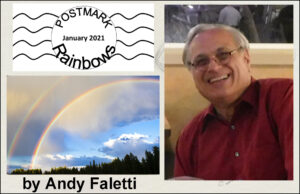
Did Anyone Else Get RAINBOWS?
— by Guest Writer Andy Faletti
And the Best thing about it?
The Pandemic could not do a Thing about it !
It had Not … One … Word …
to say about This…!
Download a PDF of this post: ConVivio_Rainbows_Jan_2021
= = = = = = = = = = = = = = = = = = = = = = = = = = = = = = = = = = = = = = = = = =
Call me weird but I love Rainbows.
At 5:00 today, I (and our puppies Jack and Bobby)
just saw the most
Beautiful
Double-Rainbow
The dogs like going for a ride.
So we happened to be driving down a big boulevard near us – on the wide curve
– next to nothing-but-fields of remaining open space East of Davis.
So the view was amazing.
Two Rainbow Legs on the South end – one a bit dimmer than the bold stark one –
– soared in a broadening arc, then lost their way above in the cloudy-dark sky.
I see a man taking pictures with his phone and realize I am not the only one who sees it.
Then the North end came into view, truncated, yet equally stark in hue.
So-o pretty – distinctive incredible color bands
“all the colors that you know…,”
don’t you know… : – )
And best … they went all the way to the ground – Right to where the pot of gold can be found
(not sure if the east end or west end has the fabled gold – the other surely has the leprechaun)
They usually do not touch the ground – this is only the second time I remember seeing that phenomenon.
Not even in Hawaii, when we have been struck by evanescent 5-minute evening-shower-rainbows…
To be completely accurate, I couldn’t see all the way to the ground, as
on the South end, there were some low white cloud wisps being stirred up.
Disturbed by the curving heavy boot of the rainbow,
as it dove and buried itself into the ground after its 180 degree journey from the North.
Families started coming out of their houses to view it, as it lasted at least 25 or 30 minutes.
(People perhaps were tipped off to it by neighbors posting on Nextdoor.com… ; – )
And cars going 50 mph both ways around the wide distended curve of the boulevard
were literally pulling over at the sight in order to (safely!) take in the view.
Whew.
I had to make a U-Turn instead of going to the Park (sorry, Jack and Bobby)
to see it again ! Then needed to finally get out and look…
And the Best thing about it?
The Pandemic could not do a Thing about it !
It had Not … One … Word … to say about This…!
… OK, so Andy’s lost it…
But anyway, it was amazing!
A harbinger of good, I’d like to imagine.
Wishing you a Double Rainbow where you are, too! … maybe tomorrow…
Andy Faletti
To Witness the Miracle
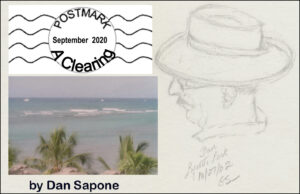
“We are here to witness the miracle.”
— Ray Bradbury
“So, what’s it all about?”
— An American college student in Florence
Since this year, 2020, has not been kind
to travelers (or anyone really); some of us
who have enjoyed the pleasures of travel,
pleasures that have been denied to us
during this COVID year, might want to remind ourselves
of some ideas that emerge from an important question.
= = = = = = = = = = = = = = = = = = = = = = = = = = = = = = = = = = = = = = = = =
Why Travel?
Kappa’a, Kaua’I, Hawaii — A taxi to the BART station, a train to the airport, a series of hurry-up-and-wait movements, and we find ourselves on an airplane, seatbelt buckled, ready to go. Hours later, a smooth landing, more rolling through another airport, a taxi, and a hotel — and here we are! A comfortable place to sit, a glass of wine overlooking the ocean, this was clearly a good idea. No question about it.
We have arrived. Now what? What exactly am I looking at? What should I think about?
— • —
A Clearing
In the 1950s, philosopher Martin Heidegger suggested that, if you can clear away all of the ‘stuff’ that you carry with you that clutters up your life, what emerges from that clearing will help clarify the world around you. He called it (among other things) “truth.” That sounded useful; so, I tried to do that — to make such a clearing — since, here on a beach on an island in the Pacific Ocean, I seemed to be in a place conducive to the making of clearings.
We were sitting at a small patio on the edge of the northern-most Hawaiian island: Kauai. Looking out at that vast ocean, it is easy to let go of things that usually clutter up your mind. The “clearing” that remains offers a lot of room for large ideas to appear, and even a few small ones.
So, what shows up in that clearing?
Surprisingly, the ideas that emerge are not complicated, but simple observations that might be obscured by the details we think about on “normal” days in more familiar places. OK, like what? Well, as I look out to sea, the scene is dominated by one thing: the horizon, just a line, really. I notice that there are no straight lines in this scene, just this one decidedly curved one. No doubt about it, the left and right “ends” of this line that forms the horizon are clearly lower than its midpoint. There can be no question that the complete object, of which this piece of horizon is a part, is not flat.
This observation argues clearly and simply for a round earth. OK, so the earth is round.
That was easy.
Since this “fact” is a relatively new one in human history, I marvel at the power of whatever must have cluttered up the minds of people only five hundred years ago that could have obscured the simple observation that emerges from the clearing I see here. Did nobody notice in all of generations that have walked the earth that the only truly straight lines in existence were man-made? Amazing! And to think that sitting here at the edge of this island made this historic piece of knowledge obvious — a round earth — knowledge that had escaped so many smart people for so long.
Setting aside my amazement for a moment, all the other wonders and beauties we can observe on this island lead eventually to other questions not as easily answered. They are not so much questions about the natural beauty we see around us, but … something else.
OK, so anyone who has tried to ask the “Why?” question knows that it’s never quite that simple. “Why what?” What are you really asking? Why is it round? Why does the water move the way it does? Why does the land occasionally rise above it? The “Why?” questions continue until you stop to consider that there is a question at the root of all of them:
“Why am I here making these observations and asking these questions?”
Of the many humans who have ventured an answer, one writer has held my attention for some time. On the day Neil Armstrong first walked on the moon, science fiction writer Ray Bradbury answered that question for Walter Cronkite: “We are here to witness the miracle,” he said.
–> We are here to witness the miracle. <–
Lots of writers have offered the opposite view that we human beings ARE the miracle — that all of creation has had the primary purpose of bringing human life to this planet. Bradbury’s very different view begs three further questions:
One: If WE are not “the miracle,” then what exactly IS the miracle?
Two: Why does the miracle need a witness?
and, of special interest to artists and writers,
Three: What are the responsibilities of beings created to witness to such a miracle?
While seeking answers to the large questions that emerge from ‘clearings,’ one might ask a smaller one: –> Where does one go to get a closer look at such a miracle?
So, we travel in search of it.
Writers have been telling us that for a long time, and they’ve identified different kinds of miracles. Thornton Wilder has a character who explains that for us in his play Our Town — and she was a character who spent a lifetime without ever leaving Grovers Corners. She observed: “It seems to me that once in your life before you die you ought to go see a country where they don’t talk in English and don’t even want to.” And why is that worth anything? Mark Twain answered this way: “Travel is fatal to prejudice, bigotry, and narrow-mindedness.” And he went on to say, “…nothing so liberalizes a man and expands the kindly instincts that nature put in him as travel and contact with many kinds of people. Broad, wholesome, charitable views of men and things cannot be acquired by vegetating in one little corner of the earth all one’s lifetime.” When faced with a contrary argument, Twain got specific in his book of travel stories, Innocents Abroad: “The gentle reader will never, never know what a consummate ass he can become until he goes abroad. I speak now, of course, in the supposition that the gentle reader has not been abroad, and therefore is not already a consummate ass. If the case be otherwise, I beg his pardon and extend to him the cordial hand of fellowship and call him brother.”
Back to “The Clearing”
If travel is a way of making ‘clearings,’ maybe Heidegger’s “truth” is too large a treasure to expect to find in any single clearing. Maybe the grand moments we expect — like standing before Brunelleschi’s dome in Florence or staring up at the ceiling of the Sistine Chapel in Rome — maybe they are not the most significant of the ‘humanizing’ moments that Twain spoke of. Perhaps more important are the small moments of connection that, when strung together, can add up to ‘truth,’ or some approximation of it. Maybe they can consist of fleeting moments that flash brightly and are then gone. Looking back on our years of travel, some examples emerge.
Humanizing Moments
I recall a weekday night during our first visit to Florence in 2001, we walked around the corner and dropped into a small neighborhood restaurant for dinner – Nello’s. It wasn’t busy, so we struck up a lively conversation with the waiter, who identified himself as “one of the owners.” He answered our touristy questions about Florence and we answered his about San Francisco. We talked about what it was like to live in these two similar places spread so far across the world. He spent a lot of time with us and, near the end of the evening he brought three glassed and we sipped Amarone together for a while before we left. It was delightful. We felt we had made a ‘connection’ with a ‘local’ and it felt good.
When it came time to find a place for dinner on the weekend, we remembered the nice time we had on Tuesday and decided to go back to Nello’s. What the heck, maybe that same guy will be there. That could be fun. So we did.
This time, a Friday night, a tour bus had unloaded and the place was jammed. The same guy was there again, but he was so busy we barely got a glimpse of him. We were lucky to get a table for two in the corner. We greeted him warmly and hoped for a moment of recognition but there was none. Were we ready to order? he asked. I mentioned that Gretta and I had spent the afternoon at Il Academia, which we had talked about with him on Tuesday, but he simply asked, “Some wine?” He took our wine order and left without a nod of recognition. We wondered, had we offended him? What happened to the ‘connection’ we thought we had made? Over the course of the meal, looks passed between us and the waiter indicating that something seemed missing but nothing was said. We decided, he’s just too busy. So, we lingered over dinner and waited until the ‘tourists’ had mostly cleared out. When he noticed that we were still here, he finally came over to us and asked if there would be something more. I tried again to engage him in conversation and commented, “this place is quite different when the tour bus unloads, eh? It was really quiet on Tuesday.” He said, “If you were here on Tuesday, you met my identical twin brother.” He and I looked at each other for a long moment and realized what had been missing. He smiled. “Oh, so we HAVE met. Or so it seemed.”
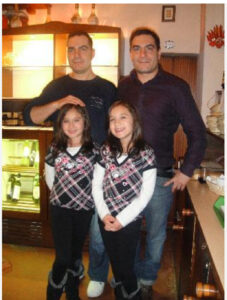
Yes, another connection.
Twin brothers at Nello’s in Florence
Such connections can happen in surprising places. One foggy Spring day, on our last day in London in 2003, we got all dressed up to have “High Tea” at the world-famous Savoy. I wore my best Fedora — a “Sinatra-esque” hat like the one my Father wore when he wanted to look dignified. In the restroom of all places, a distinguished-looking gentleman, dressed in a three-piece suit was standing at attention in his role as the restroom attendant. When he handed me a towel, I asked him with mock gravity, which he seemed to understand, “Tell me, sir, is mine the only Fedora in all of London?”
Yes, sir,” he replied returning my serious expression.
“So, does that mean that all of my efforts to bring Fedoras back into fashion have failed?”
“Yes, sir.”
The momentary grin we exchanged as I tipped my hat to go and dropped a few bills in his jar was worth every bit of the price of afternoon tea at the Savoy.
Finally, on a sunny day in Paris, we were sitting at a shady spot overlooking the Luxembourg Gardens. Gretta was drawing the scene of Parisians enjoying one of their unique spots of civic beauty and I was sitting with my notebook, trying to look like a writer. An older couple walked up and leaned on the stone wall in front of us and we struck up a conversation. They showed an interest in what we were doing — “Gretta paints with watercolors,” I said, stating the obvious.
“And you are a writer?” she asked, pointing at my notebook.
“Oui,” I grinned.

As if in reply, she said, “Let me tell you a story.”
So, sensing an opportunity, I pointed my iPhone and pushed the record button, surreptitiously, I thought. Turns out that they had met as teenagers here in Paris a very long time ago, fell in love, but went the separate ways that life took them — he to the army and she to marriage and children. After many years she returned to Paris — now a widow — and, at the suggestion of her grown son, looked him up on Facebook. And now, here they are, they live in Paris together, where they belong, and were clearly celebrating that fact. As she told her story, the gentleman and I exchanged glances at each other and at my iPhone and he nodded approval. When she was done, I said, “With your permission … “ and I gestured to the iPhone to admit my intrusion. She interrupted me, “Yes, I noticed. It’s a good story, isn’t it? Perhaps you’ll write it down.” We bid each other good day and they were off.
A good story.
The small moments of connection never seem to stop, if you look for them: a woman from the East Bay we met on a boat on Lake Annecy … a bottle of homemade wine gifted to us at the end of a stay at Pomerlo Vecchio in Umbria … an American college student in the Academia in Florence, looking up at Michelangelo’s David, who asked me, “This David is supposed to be a big deal. What’s it all about?”
So, I told him a story that had been told to me — about an inspiring mythical character and a story told in stone by a sculptor more than 500 years ago — “and here we are still looking at it with admiration.” I think he “got it.”
There are many small miracles to witness when clearings are made.
![]()
Falling Down
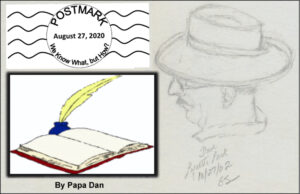
Let’s take a look at an old joke,
an old, crude and insensitive little joke,
and see if it applies to a current feature
of our American Democracy.
Falling_down_FINAL_BREL_Aug272020
= = = = = = = = = = = = = = = = = = = = = = = = = = = = = = = = = = = = = =
An Announcement
The scene is a large office building — the headquarters of a large national corporation. We see one, wide, uninterrupted floor of this office building containing several dozen cubicles and desks where people are working at their jobs. A voice comes over a loudspeaker and fills the room:
“Ladies and gentlemen, may I have your attention please? It has come to the attention of management that some employees who are dying on the job are failing to fall down. As a result, given the nature of our workforce, it has become difficult for management to distinguish between employees who have died and those who are still working. Therefore, beginning immediately, employees who die on the job are instructed to fall down. This action will contribute significantly to our ability to assess our productivity and make necessary management decisions. Thank you. That is all.”
Applying the “Joke”
So, what does this rude and insensitive little story, have to do with the state of our American Democracy?
Since the early history of our “great American experiment in democracy,” the United States of America has organized itself into political parties. The Founders did not intend it to be so — parties are not mentioned in Hamilton’s “Federalist Papers” nor in the Constitution — but it happened anyway. They haven’t always been the same parties — some parties have come and gone as they became irrelevant (remember the Whigs and the Tories?); some have changed their names (recall the “Federalists” and the “Democratic Republicans?”); and throughout our history some citizens have declared themselves to be independent of those parties. But over my lifetime, American politics and government have been structured predominately by two competing political parties that have populated most of the positions of power and influence in our national decision-making. One is called The Democratic Party and the other is called The Republican Party. Both parties have long stood for a common set of values, broadly recognizable as American values, as initiated by the Founders, values that have kept the nation together over the past century or so since the Civil War. In that respect, the two parties have a lot of historic similarities. The differences between those parties have largely centered on the policies and strategies they have preferred in pursuit of those values. Most often, national decisions have been made with more-or-less respectful debate, persuasion based on regional interests, compromise (only possible because of the common values I mentioned), and voting.
Today in America, however, the party that calls itself The Republican Party has died. It has died, but it has failed to fall down. As a result, there are still large numbers of citizens who believe that The Republican Party still exists. But it does not. It has died.
Growing up, I accepted my father’s assertion that “We are Roosevelt/Kennedy Democrats”— and I still do. However, well into my thirties, he and I knew and respected a number of Republicans. For them, if they are still alive and remember, their party has died. There was no funeral and some Americans mistakenly believe that it still lives.
OK, so that is a dramatic assertion, which some may not accept. I understand that. So, how do we test that assertion? How does a person notice that The Republican Party has died? All my life, certainly since I was in high school, the Republican Party has stood for at least these 7 consistent values:
1. preserving American institutions,
2. supporting fiscal conservatism, defined as a federal budget balanced between income and expenditures (i.e., opposition to “deficit spending”),
3. supporting small business (evident in consistent support for local Chambers of Commerce),
4. maintaining strong international alliances in support of global economic strength and American foreign policy objectives like reciprocal trade and fierce opposition to foreign dictators (especially those in Communist Countries) all in support of international peace and stability,
5. basing policy decisions on science and academic excellence by supporting and consulting experts,
6. supporting reliable safety-net programs to ensure a minimum, decent standard of living for Americans
7. actively promoting the value of common sense.
Those have been the fundamental values of the Republican Party since I was in high school, as confirmed repeatedly by spokespersons for that party. Those have long been called “Conservative” values. An observer will notice that those who claim to speak for the Republican Party today no longer stand for those values. Consider these observations on those topics — members of the Republican Party have advocated for the following things in very recent years:
1. They have worked very hard to diminish the effectiveness and credibility of long-standing government institutions such as the Justice Department and immigration authorities, criticized “so-called judges” of the federal courts who have ruled against Republican policy decisions, and depleted the ranks of long-standing institutions that have provided policy stability such as the State Department, Environmental Protection Agency, Postal Service, and Department of Energy.
2. They have proudly and repeatedly handed out large tax cuts for the wealthy blatantly causing budget deficits.
3. They have openly supported interests of the largest corporations, knowingly endangering the viability of small businesses, with tax policy and a willingness to renege on legitimate debts and agreements.
4. The current Republican Administration has repeatedly demonstrated deference and support for foreign dictators (e.g., Russia) who have shown a disregard for established national boundaries and attempted to undermine American elections. Republicans have resisted efforts to defend against those threats, undermining investigations and weakening alliances the nation has relied on for decades.
5. They have rejected science, denying well-established scientific knowledge like the effects of our energy choices on destructive changes in the global climate — actually subsidizing corporate polluters! Under the current Republican administration, America is the only nation to withdraw from the Paris Global Climate Agreement.
6. They have slashed long-standing safety-net programs, cast dozens of votes attempting to take away health insurance from ordinary Americans, resisting and demeaning long-standing progress in the rights of women, and unravelling campaign finance regulations to give billionaires outsized influence over all government decision-making, while systemically attacking voting rights to make it harder for the young people, minorities, and the poor to vote.
7. They have thrown common sense to the winds by embracing wild conspiracy theories, like the health threat from windmills, widespread voter fraud, the fabrication of climate change by the Chinese, the credibility of certain birth certificates, (and more), despite public evidence to the contrary.
As former President Obama summarized in a speech in 2018, this Republican behavior is “not conservative. It sure isn’t normal. It’s radical. It’s a vision that says the protection of ‘our’ power and those who support ‘our’ party is all that matters, even when it hurts the country. It’s a vision that says the few who can afford a high-priced lobbyist and unlimited campaign contributions set the agenda. And over the past two years, this vision is now nearing its logical conclusion.”
The conservatism that guided the Republican Party of my youth is gone. Yes, the Republican Party has died. Believe it or not, the seeds of that death were planted during the first term of the Reagan administration (check out his huge budget deficits: $195 billion in 1983, $180 billion in 1984 – look it up). Reagan’s “Conservative” administration also undid restrictions on Saving and Loan institutions, leading directly to the S & L crisis and slashed federal mental health funding precipitating today’s homeless problem.
So, what has replaced this now-deceased political party? Those who currently call themselves Republicans have embraced the politics of “resentment, division, and paranoia” instead of what we used to understand to be “conservatism.” Fiscal conservatism, of course, has become an often-invoked myth. The values to be preserved are power and influence.
What To Do
The dead-but-still-standing Republican Party, needs to be replaced by a large group of people who have a genuine interest in governing. I suppose, the problem could be described simply as a vocabulary issue. It seems that Republicans no longer understand the word “govern” to be a verb — that is, something that you DO. For some time, they have only recognized the word “government” — a noun that they utter bitterly as if it were a cuss word, pronounced either before or after spitting, as in “government regulation, ptieuuw!” They failed to learn (it was in the fifth grade), that the phrase “government regulation,” was one of the central purposes of government, as established by the Founders, to protect citizens against threats that they cannot fight individually. Over thousands of years, that phrase, “government regulation,” has been the single dominant characteristic that has distinguished uncivilized disorderly collections of people from what historians and anthropologists call “civilization.” To answer the “what to do” question, there are three steps (there are always three):
Step One: the election of 2020 — A large Democratic Majority must be elected in both houses of Congress and in State Legislatures and City Councils across the country to replace the mythical and deceased, Republican Party of old. This must be accompanied by restoration of confidence in the integrity of elections — an effort to be pursued in parallel with Step One.
Step Two: A Democratic President must be elected in 2020 while simultaneously preserving and expanding the Democratic majority mentioned in Step One. Then, the challenge will still be immense. There will be a lot of damage to repair from years of cowardly fake conservatism (known as “Trumpism”) and the weak national response to Trumpism that made it possible.
Step Three: The utter completeness of the Republican defeat must be accompanied by a movement to re-establish traditional conservatism as the bedrock of a new party with a new name — how about “The Grand New Party.” That party needs to sit down across a table with Democrats and re-engage in the business of governing. They need to reassert a set of values that would be recognizably American and taught in public schools (well-funded public schools, by then) as principles we can all pursue together with our own regional flavors. Oh, by the way, elected representatives of the Democratic Party need to be rejuvenated (OK, replaced) with folks with a commitment to the future in addition to their commitment to the values of the past. If you want to read that to mean “replaced by younger folks,” go ahead.
So, our question: Can all this be done in this generation?
My answer: Nope. Clearly, my generation (the “Post-War Baby Boom”) has had its chance to make a difference and gets mixed reviews. We made some progress in the 1960s, but my generation also brought us all some pretty awful outcomes, in spite of a handful of promising leaders. So, my answer is No. Given who we are, collectively, and HOW we have been approaching this problem, it’s not going to happen. But I suppose we can start with Step One and Step Two today, so my grandchildren’s children can have a place to start.
But Wait —
We described a serious problem and proposed a challenging “What To DO” to solve it. BUT, in assessing whether we can accomplish that goal anytime soon, is it possible that we have left out the most important question:
How?
Maybe it will take a dramatic, but simple, answer. Can we supply the simple human ingredient that has been missing from our politics and governance? Maybe that answer can come from a song from the 1960s (OK, an approach my generation has offered many times). Here it comes –
the climactic final song from an important musical from the late 1960s, which I had the privilege of seeing on the stage twice: “Jacques Brel Is Alive and Well and Living In Paris.” Translated from the French by Eric Blau and Mort Shuman, the lyrics (below), offer a solution. Sounds simple. Take a look at the lyrics and consider whether it is useful here in the 21st century. If we only …
If We Only Have Love
If we only have love
Then tomorrow will dawn
And the days of our years
Will rise on that morn.
If we only have love
To embrace without fears
We will kiss with our eyes
We will sleep without tears.
If we only have love
With our arms open wide
Then the young and the old
Will stand at our side.
If we only have love
Love that’s falling like rain
Then the parched desert earth
Will grow green again.
If we only have love
For the hymn that we shout
For the song that we sing
Then we’ll have a way out.
If we only have love
We can reach those in pain
We can heal all our wounds
We can use our own names.
If we only have love
We can melt all the guns
And then give the new world
To our daughters and sons.
If we only have love
Then Jerusalem stands
And then death has no shadow
There are no foreign lands.
If we only have love
We will never bow down
We’ll be tall as the pines
Neither heroes nor clowns.
If we only have love
Then we’ll only be men
And we’ll drink from the Grail
To be born once again.
Then with nothing at all
But the little we are
We’ll have conquered all time
All space, the sun, and the stars.
— 1968 — Original soundtrack audio: https://www.youtube.com/watch?v=M9ILw3D5yrU
![]()
Shelter
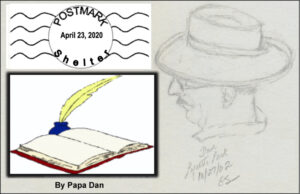
“So be the change, so be the shelter.”
— Danny Burke and Marieme Diop
“Screw This Virus”
— David Brooks
“It is not enough to help the feeble up,
But to support them after.”
— William Shakespeare
(Today: April 23, is honored as his birthday)
To download a PDF of this post, click here: Shelter_ConVivio_Apr23_2020
= = = = = = = = = = = = = = = = = = = = = = = = = = = = = = = = = = = = = = = = =
The word “Shelter” is at the forefront of America’s thinking these days. California was among the first states to implement a “Shelter In Place” strategy for everyone who is not performing “essential” duties. As the virus has become more pervasive and deadlier, state governors have filled the leadership void left by … well … you-know-who. So, today, with advice from the World Health Organization (WHO), “Shelter In Place” is what passes for the “American Way of Life” — at least for now, and for most of us. Of course, “Commander Chaos” (“He Who Must Not Be Named”) has defunded and demeaned the WHO for those who are listening to him and encouraged people to resist the shelter-in-place regulations that most governors have imposed. While the President wants to “open up the economy,” most individual states and counties are strengthening “shelter” policies and have begun requiring the wearing of masks outside the home. It is clear that opening up the economy prematurely will directly cause a predictable number of deaths. This morning, 75% of the American people support “Shelter In Place” regulations and only 11% do not. As we lift our eyes to the horizon, we can see that much of the rest of the world has been “Sheltering” for some time now with strong regulations.
Of course, buried in that approach to “Sheltering” is the need to define what is “essential.” Which workers should be considered sufficiently “essential” to continue working outside the home? The consensus on that definition has settled broadly on health-care professionals, first responders, and workers providing services and products (like food, medicine, fuel, etc.) that keep civilization operating. Those professions are considered sufficiently ‘essential’ to go to work. They don’t GET Shelter — they make Shelter possible for others.
So, for the vast majority of us, this new way of life means simply: “Stay Home.” for an unknown number of days … weeks … months … Sounds simple, eh? And yet it ISN’T simple at all.
Staying home
Staying Home, of course, means not going to work, not going to school, and staying away from (or at least distant from) people who don’t live in your home. It means at least three things:
1. Not going to work: Here in the 21st century, America employs the largest number of people in history — our ‘work force’ is about 165 million. While that sounds powerfully prosperous, it also means that this record number of people have been relying on those paychecks to buy food, pay bills, and keep a roof over their heads. So, NOT going to work is NOT simple.
By contrast, here in April of 2020, more people are UNemployed than at any time in our history. Nearly 20 million Americans have filed for unemployment benefits in the past three weeks alone. Some economists warn that, next month, the unemployment rate could reach as high as 15% — a number that could add up to about 25 million people. That’s a lot of rent payments, utility bills, mortgage payments, and groceries. We tend to compare hard times to the depression of the 1930s when unemployment reached 24.9% of the workforce. In 1935, that added up to “ONLY” about 15 million people. Today’s unemployment, though a smaller percentage, has a much greater effect.
2. Staying home from school: This year, more than 56 million students attend school (elementary, middle, and high school) in America. According to the Bureau of Labor Statistics, nearly 62% of American households have two working parents (not including working single parents). While some number of parents will have the opportunity to ‘work from home,’ the whole picture of parents and students not going where they usually go, every day, is a gigantic disruption for millions of families. So, “Shelter in place” is a two-edged strategy: many parents will not be earning a living during the “Shelter” strategy and their children will not be attending school. If they are all home, well, at least there is not a day-care expense, right? AND they will be avoiding contacts that can expose them to the virus. But nobody would agree that is a solved problem.
3. Providing food for yourself and your family: Again, this cuts two ways: many families will come close to running out of cash to buy food if they are not working AND they must solve the problem of going out into the world to the grocery store if they do have the money.
–> –> How Do We FEEL About it All?
The stress of this widespread disruption is new for most of us who were not alive during the Great Depression of the 1930s. While America has had economic downturns and recessions every couple of decades, this is a new level of disruption. History tells us that how we feel about it often influences how well we survive. People react to the stress of disruption in many different ways. Over time, our writers and thinkers have provided words that have been thought-provoking and — sometimes — help us to find comfort, and sometimes even solutions. If we are collectively, as a civilization, forced to save ourselves by taking shelter, let’s look at a random collection of words that have been offered for the specific purpose of managing how we feel about adversity. Historically, we might ask: what effect have our writers had on widespread hard times — AND have our writers been helpful? Let’s see.
•• Pierre Teilhard de Chardin offered his thoughts about how to respond to adversity:
— “In the final analysis, the questions of why bad things happen to good people transmutes itself into some very different questions, no longer asking why something happened, but asking how we will respond, what we intend to do now that it happened.”
•• David Brooks often takes a philosophical approach to consider what it takes to be human during difficult times. Here, his New York Times column titled “Screw This Virus” acknowledges the need for more than shelter, but the greater need for solidarity. He wrote:
“Solidarity is not a feeling; it’s an active virtue. It is out of solidarity, and not normal utilitarian logic, that George Marshall in “Saving Private Ryan” endangered a dozen lives to save just one. It’s solidarity that causes a Marine to risk his life dragging the body of his dead comrade from battle to be returned home. It’s out of solidarity that health care workers stay on their feet amid terror and fatigue. Some things you do not for yourself or another but for the common whole. …
It will require a tenacious solidarity from all of us to endure the months ahead. We’ll be stir-crazy, bored, desperate for normal human contact. But we’ll have to stay home for the common good. It’s an odd kind of heroism this crisis calls for. Those also serve who endure and wait. …
I wonder if there will be an enduring shift in consciousness after all this. All those tribal us-them stories don’t seem quite as germane right now. The most relevant unit of society at the moment is the entire human family.
•• Robert Christau wrote, in “Going Into the City”: “Nuts to the educational value of suffering.”
•• Alexandra Kostoulas, a writing teacher in San Francisco (Cary Sapone sent me her words) tells us of the responsibility of writers (like David Brooks) and other artists, to respond to difficult times:
“There is no time for despair, no place for self-pity, no need for silence, no room for fear. We speak, we write, we do language. That is how civilizations heal.” …
•• Cormac McCarthy wrote of the paralysis of deciding what to do in difficult times:
“Nobody wants to be here and nobody wants to leave.”
•• Ernest Hemingway described how he tried to recover from unhappiness and fear (albeit, in his case, with mixed personal results). From his novel A Moveable Feast:
— “As I ate the oysters with their strong taste of the sea and their faint metallic taste that the cold white wine washed away, leaving only the sea taste and the succulent texture, and as I drank their cold liquid from each shell and washed it down with the crisp taste of the wine, I lost the empty feeling and began to be happy and to make plans.”
–> –> And, On the Subject of Leadership in Difficult Times:
•• Abraham Lincoln spoke on this subject in a way that is relevant in today’s America— judging the character of people who are tasked to make decisions that affect other people:
“Nearly all men can stand adversity, but if you want to test a man’s character, give him power.”
•• Frida Ghitis, a world-affairs columnist, writes in response to leaders who waste their power by trying to solve the wrong problem: “The virus can be stopped by keeping it from spreading. That’s how we suffocate it. That’s how we reignite the economy. Trump’s wish to see the economy return to growth is shared by the American people. But the cause of the economic crisis is the virus. This is a cause-and-effect situation. To save the economy we need to stop the virus. Trump already tried to stop it by denying it was a problem. The new plan he is considering could prove just as ineffective and just as deadly. The decision on how to move forward should be left in the hands of the experts.”
•• Bryan Tracey — Another leadership question for our time: “Is a leader really successful?” Answer:
“Successful people are always looking for opportunities to help others. Unsuccessful people are always asking, What’s in it for me?”
•• Howard Beale reacted to the inadequacy of leadership in a famous scene from the movie “Network”:
“We’re mad as hell and we’re not going to take it anymore.” Will America react in this way?
•• Terry Goodkind writes about choosing between easy and difficult solutions to the challenges we face:
“If the road is easy, you’re likely going the wrong way.”
–> –> Across Centuries: An obvious Solution: Help Others. Be the “Shelter” for Someone Else
Here’s what a few of our writers have said about this highest priority of our time:
•• Charles Dickens (19th century) — “No one is useless in this world who lightens the burden of another.”
•• John Bunyan (17th century) — “You have not lived today until you have done something for someone who can never repay you.”
•• Shannon Alder (April 2020) — While Sheltering in place, can we still maintain our connection to others?
“One of the most important things you can do on this earth is to let people know they are not alone.”
•• Mother Teresa (20th century) — “Never worry about the numbers. Help one person at a time, and always start with the person nearest you.”
–> –> OK, So What about the Writers? Can the poets survive? Can They Help?
•• As reported recently in The Atlantic, William Shakespeare (today’s supposed to be his brthday) wrote some of his best works during the plague. In that article, Daniel Pelzner makes some insightful connections between our “plague” (coronavirus) and that one. He wrote, “As with everything that the coronavirus leaves in its wake, the suspension of operations by most major theaters around the country feels surreal.” The closing of theaters — happening today around the world — is not, a new phenomenon. He continued: “Whether theater provides an entertaining diversion from “the evening news” or might be the cause of further suffering, however, is a debate that goes back at least to Shakespeare’s day. Elizabethan theaters were frequently shuttered in London during outbreaks of the bubonic plague, which claimed nearly a third of the city’s population. The official rule was that once the death rate exceeded thirty per week, performances would be canceled. (As an infant, Shakespeare himself barely survived an outbreak that killed his older siblings.) Like New York’s governor Andrew Cuomo, who has banned gatherings of more than 500 people, London officials in the 16th century worried that people flocking to town to “see certayne stage plays” would be “close pestered together in small roomes,” creating the means “whereby great infeccion with the plague may rise and growe, to the great hynderaunce of the common wealth of this citty.” Shakespeare’s troupe, The King’s Men, had to rely on royal gifts and provincial tours to replace their lost box office. No such luck — so far — for our 21st-century theaters.
How was The Bard’s writing affected by the plague? It’s historians tell us that Shakespeare turned to writing poetry when — and because — the plague closed the theaters in 1593. That year he published his narrative poem, Venus and Adonis, in which the goddess begs a kiss from a beautiful boy, “to drive infection from the dangerous year.” Ironically (to our ears), the goddess claimed, “the plague is banish’d by thy breath.” Love poetry, it seems, could be spurred by the plague, and—in the fantasy of the time—even cure it. Maybe so — history suggests that another closure of theaters, in 1606, allowed Shakespeare, an actor and shareholder in The King’s Men, to do a lot of dramatic writing. While sitting out London’s early-17th -century version of “Shelter In Place,” Shakespeare wrote King Lear, Macbeth, and Antony and Cleopatra that year. Can we, today, make such lemonade out of this terrible lemon?
•• One modern poet, David Malouf (© 1992), wrote a few prophetic lines in a longer poem anticipating a modern plague:
“The sickness in this month is grown so general
no man can judge. It comes to this: we kill
our neighbours with the very prayers we sigh
to Heaven. O my Lord, spare me, spare me.”
–> –> Finally — Heroes of this time of Shelter: The Uniters
•• Andrew Cuomo, Governor of New York:
“And we’re going to get through it … because we are united, and when you are united, there is nothing you can’t do. And because … we are tough. You have to be tough. This place makes you tough. But it makes you tough in a good way. We’re going to make it because I love New York, and I love New York because … New York loves all of you. Black and white and brown and Asian and short and tall and gay and straight. New York loves everyone. That’s why I love New York. It always has, it always will. And at the end of the day, my friends, even if it is a long day, and this is a long day, love wins. Always. And it will win again through this virus. Thank you.”
•• California’s Governor Gavin Newsom is exerting significant leadership. He wants us to be steadfast, compassionate, and optimistic:
“Check in on loved ones; check in on your neighbors. Stay home. This is not a permanent state. This is a moment in time, and we will meet this moment together.”
–> –> Epilogue: Some “poets” shine a timeless light, from their own time, on times like these
•• Gwendolyn Brooks, “In the Mecca” 1968:
“One reason cats are happier than people
is that they have no newspapers.”
•• Joshua Ferris, “Then We Came to the End” 2007:
“Some days felt longer than other days. Some days felt like two whole days.”
•• Samuel Pepys, “Diary,” 1667:
“Lord! How sad a sight it is to see the streets empty of people.”
•• Barbara Pym, “Excellent Women” 1952:
“The burden of keeping three people in toilet paper seemed to me rather a heavy one.”
•• Michael Hofmann, interview in The Paris Review December 2014:
“One day someone will use the last surviving Latin word in English to say something like, This sucks.”
•• Stephen King, “The Stand” 1978:
“I’ve heard the saying “That sucks” for years without really being sure of what it meant.
Now I think I know.”
•• William Shakespeare, “Cymbeline” 1611:
“Nothing ill come near thee!”
•• Rita Dove, “Fiammetta Breaks Her Peace” April 12, 2020:
“All is infection, mother …
We shall sit quietly in this room,
and I think we’ll be spared.”
•• Flann O’Brien, “The Best of Myles” 1999:
“Do your friends shun you? Do people cross the street when they see you approaching?”
•• Ellen Bryan Voigt, “Kyrie” 1995:
“How we survived: we locked the doors and let nobody in.”
•• Clive James, “Latest Readings” 2015:
“If you don’t know the exact moment when the lights will go out, you might as well read until they do.”
•• Attributed to Charles Baudelaire 1860s:
“No restaurants? The means of consoling oneself: reading cookbooks.”
•• Kingsley Amis, “On Drink” 1972:
“Make up your mind to drink wine in quantity.”
•• Samuel Johnson, in James Boswell’s “The Life of Samuel Johnson” 1791:
“If you are solitary be not idle.”
And, finally, two of my favorites:
•• Attributed to Charles Lamb 1800-ish:
“The greatest pleasure I know, is to do a good action by stealth, and to have it found out by accident.”
•• Attributed to Edmund Burke (but really: John Stuart Mill 1867, and John F. Kennedy 1961):
“The only thing necessary for the triumph of evil is for good men to do nothing.”
![]()
The Vulcan Salute — Its Time Has Come
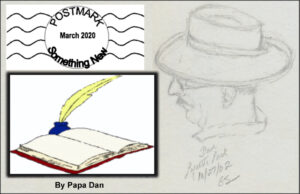
“Live long and prosper.”
“Logic is the beginning of wisdom,
not the end.”
— Mr. Spock
To download a PDF of this post, click here: ConVivio.Vulcan_Salute
===========================================================
The Vulcan Salute
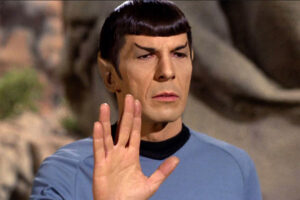
During the days when “Star Trek” was a popular TV show, Mr. Spock (Lieutenant Commander and Science Office of the Starship Enterprise) taught us the Vulcan Salute. In language, it translates to “Live long and prosper.” It was a friendly, respectful greeting that those of us from the 21st century might use in a way similar to our human handshake. So, given today’s reluctance to shake hands for sanitary reasons, it might be used to become a germ-resistant cultural replacement for that time-honored gesture.
Considering the source, Mr. Spock (played by actor Leonard Nimoy) had a dramatic backstory — he had a mixed Human-Vulcan heritage, he taught a number of respectful behaviors to his human colleagues. The character’s father was named Sarek, from the planet Vulcan, and his mother was Amanda Grayson, a human. Due to his mixed-race heritage, the young Spock character had a difficult childhood, bullied on his home planet by full-blooded Vulcan children who made fun of the human emotions he inherited from his human mother. He grew up alongside his half-brother, Sybok, who was eventually cast out for rejecting logic. Although Spock was accepted in the Vulcan Science Academy, he did not enter the academy because they would never fully accept someone who was only half Vulcan. Instead, he succeeded in entering Starfleet, while spending the next 18 years estrange from his Vulcan relatives.
The evolution of the character was interesting in that the network wasn’t pleased with the mixed-race feature of the character and often airbrushed out the pointed ears of the character in promotional photos. After the first season, a rift grew between the show’s creator, Gene Roddenberry, and Nimoy because the writing of the character deteriorated into brief expressions of “fascinating” and “logical”; and more complex interactions of the character with other characters, focusing on his unique racial heritage, were rejected by the network. However, the Vulcan Salute in today’s environment has a number of useful qualities to offer to us 21st-century humans.
Many aspects of Spock’s character endured in popular culture and the boundary between the character and the actor was eventually blurred and then erased. The character was adopted as an informal mascot by NASA and was incorporated into a number of literary successes by authors like Isaac Asimov. An asteroid was named Mr. Spock in 1971 and the character, further promoted by Mr. Nimoy, became an inspiration to a number of scientists and engineers along with a number of more recent honors:
- In 2004, Spock was ranked number 21 in Bravo’s list of The 100 Greatest TV Characters. According to Wlliam Shatner, the other star of the series, “much of the acting praise and media interest in the show went to Nimoy.”
• In 2008, Unified Gamers Online Inc. (UGO) named Spock one of the 50 greatest TV characters for both the original series and subsequent movie appearances.
• In 2012, Imagine Games Network (IGN) ranked the character Spock as the second top character of the Star Trek universe, with Kirk in the top spot.
• In 2016, Adam Nimoy released his very popular documentary film For the Love of Spock, about his father and his iconic character.
• Spock (Nimoy) has been honored by a multitude of film and television institutions for his dominant role among the characters of the Star Trek franchise over fifty years, from the original pilot in 1964 to his final film performance in 2013.
• After the death of Leonard Nimoy in 2015, there has been an increase in the practice of altering the portrait of Canada’s seventh prime minister, Wilfrid Laurier, on Canada’s five-dollar note to look like Spock.
For today, if we all begin promoting the Vulcan Salute as the clinically safe and respectful greeting to replace the handshake, it may actually have a positive impact on reducing the spread of the coronavirus here in the twenty-first century.

Why don’t we give it a try? (Can you do it?)
Finally, at this difficult time in our human history, I am reminded of some words — once used in a movie but originally attributed to John Lennon. He said:
‘“Everything will turn out alright in the end.
If it is not alright, it is not yet the end.”
![]()
The Winter Solstice: Revisiting a Time for Reflection and Review
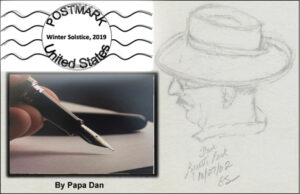
“The dance between darkness and light will always remain— the stars and the moon will always need the darkness to be seen, the darkness will just not be worth having without the moon and the stars.”
― C. JoyBell
To download a PDF of this post, click here: Winter_Solstice_Dec_2019
===========================================================
Some say that the seasons drive the way we feel about the events swirling around us. Here in America in the twenty-first century, most of us might say that, this time of year, most of our feelings are dominated by celebrations of Christmas and The New Year. We are filled with thoughts of exchanging gifts, decorating a tree, and making New Year’s resolutions. We think of these cultural forces as having always been with us — but there are stories that can take us back to their origins. If we speculate on where all of this comes from, we might consider that it all comes from one common astronomical fact — The Winter Solstice: the shortest day of the year.
This year, 2019, here in our part of the world, the official astronomical moment of the Winter Solstice takes place at 8:19 pm PST on Saturday, December 21. Since ancient times, this time of year has signaled a time for review and thoughtful reflection. Historians tell us that we can trace this back a long way. The Romans, for example, like other ancient peoples, had festivals acknowledging that the birth and death of Winter signified important trends in their world, often credited to — or blamed on — “the gods.” That habit has endured through a variety of cultures.
We are also told — although quietly — that early Christians selected the last week of December to celebrate the birth of Jesus of Nazareth to coincide with the pre-Christian celebration of the Winter Solstice. If true, it was a sensible thing to do since it was already a time celebrated with the giving of gifts and official pronouncements about the state of society. So, what’s the story?
It turns out that, for the first three centuries of the existence of Christianity, there is no record that the birth of Jesus was celebrated officially at all. In those early centuries, the two most significant “holidays” were Epiphany on January 6 — reputed to be the arrival of The Magi (“The Three Wise Men”) after the birth of Jesus — and Easter, which celebrated the resurrection of Jesus. The first official mention of December 25 as a holiday honoring Jesus’ birthday appears in an early Roman calendar from 336 A.D. BUT, you may ask: was Jesus actually born on December 25?
The answer is ‘probably not.’ The Bible doesn’t mention a date for his birthday; but the Nativity story contains some clues. Among the examples of such ‘hints,’ the presence of shepherds and their sheep in the story suggests a Springtime birth; but a lot of time went by before anyone settled on a date for the occasion. Historians tell us that the Western Roman Emperor Constantine made Christianity ‘legal’ in his empire with the Edict of Milan in 313. In 336, he is said to have formally established the birth of Jesus at December 25 (while the Eastern Empire celebrated the birth on January 6). So, the date is not planted on solid ground. Even in more recent American history, the celebration of Christmas as we know it has not been without controversy. The Puritans of colonial New England, for example, banned the observance of Christmas traditions —giving gifts, lighting candles, and decorating trees — primarily because of its pagan roots. Later, Christmas fell out of favor following the American Revolution as a rejection of a peculiarly British custom. It didn’t become an American Federal holiday until 1870.
So, whether or not we accept the story that Emperor Constantine “stole” the Winter Solstice and turned it into Christmas, this part of the calendar has for a long time been recognized as a time of reflection and review by societies and individuals associated with many beliefs and traditions.
Winter Solstice Rituals from Around the World
Setting aside for a moment the powerful Christmas traditions that dominate the modern western world in the last week of December, thousands of people around the globe will herald the Winter Solstice, the shortest day of the year, with centuries-old rituals. It is, of course, the first day of Winter, — the turning point of the year in many cultures — the moment that our hemisphere is pointed at its farthest distance from the sun. Some of the vocabulary that comes down to us from the ancients provides examples. Pagans called it the “Yule,” acknowledging the birth of the new solar year, celebrated to this day in North America by the Circle Sanctuary, one of several prominent pagan groups in Northern America. Here are a few other notable examples of Winter Solstice observances that are practiced here in our own twenty-first century:
–> 1. Catching the Sunrise at Stonehenge
England’s famous Stonehenge lures thousands of visitors during both the summer and winter solstices. Dozens of pagan and druid groups head to Stonehenge to pay tribute to the Sun on this occasion. Revelers gather at the prehistoric site of ancient stones in Wiltshire to sing, dance, play instruments, kiss the stones, and do yoga as they wait for the sun to rise. The iconic Stonehenge is known for its precise alignment with the sun’s movement and has been known as a sacred place of worship and celebration of solstices for thousands of years.
–> 2. Absorbing the First Rays of the “New” Sun
At the Newgrange Monument in Ireland, dozens of people, lucky enough to be selected through an annual lottery, get the chance to stand inside the ancient Newgrange monument in Ireland and absorb the first rays of the day during the Winter Solstice. Newgrange is a burial mound in Ireland’s Boyne Valley that is over 5,000 years old. The Stone Age monument contains a 62-foot passage that leads into a chamber that is aligned with the sun as it rises during the Winter Solstice. Between Dec. 19 and Dec. 23, around dawn, sunlight pierces through the top of the chamber and slowly illuminates the room for about 17 minutes. More than 32,500 people applied for a spot inside the chamber this year. Only 60 of them were picked from the lottery to partake in this Winter Solstice ritual.
–> 3. Soaking in “Fruit Baths” in Japan
In Japan, people traditionally soak in hot baths filled with yuzo citrus fruits to welcome the Winter Solstice and protect their bodies from the common cold. During a typical solstice celebration, children from a local preschool share a dip in a traditional yuzu tub as dozens of the yellow yuzu fruits float around them on the surface.
–> 4. Getting Scared by the Krampus in Austria
Hordes of revelers descend on Hollabrunn, Austria, each year during the Winter Solstice to watch a swarm of people dressed like Krampus — the half-demon, half-goat counterpart to Santa Claus. They terrorize and tease the crowd in giant horned masks, sharpened teeth, fur body suits, and whips. The traditional ‘Krampus Run’ in Austria is believed to ward off bad spirits near the Winter Solstice, but it is also a source of entertainment — “It is weird, but it’s fun,” according to local scholars. “It’s sort of like Halloween, you get to dress up in these really disgusting costumes. You get to do stuff you don’t normally get to do.”
So, what do these ceremonial observances have in common?
1. Taking advantage of the opportunity to “start over” as the Sun does every year.
2. Reflecting on the things that have happened over the past year as the Sun dies — and “closes the curtain” on a portion of our lives.
3. Taking part in the rebirth of the Sun and, with it, starting our own lives over again by learning lessons from what has gone before and finding ways to make the coming year better than the last one.
So, Can All of this celebratory stuff actually make a difference?
While I have tried (and occasionally failed) over the past year to avoid writing about our corrosive politics and the bad news that follows from it, maybe this Winter Solstice can provide an opportunity to recall good things that have happened that we might be able to build on.
Let’s take a look at ten examples of Good Things
1. In 2019, the most diverse class of lawmakers in history was sworn into the 116th Congress: the most women ever (105 in the House, 25 in the Senate); a record number of Hispanic and Latino members (45 in the House, 5 in the Senate); 56 African American members (53 in the House, 3 in the Senate); 30 members who are Asian American; a record number of Native American, Pacific Islander Americans; the most diverse religious representation ever (Christian Protestant, Catholic, Jewish, Mormon, Buddhist, Muslim, Hindu, Greek Orthodox, Pentecostals, Unitarians, and Adventist); and 96% have a college education.
2. Sixteen-year-old Greta Thunberg was honored as Time Magazine’s Person of the Year for starting a world-wide movement of young people to motivate world leaders — notably by speaking at the General Assembly of the United Nations — to urgently address the threat of climate change. Millions are paying attention at the highest levels. (Only one person we know of was publicly displeased with this news.)
3. The European Union banned single-use plastic bags, plates, forks, and straws in Europe. This act could avoid nearly $25 billion worth of environmental harm by 2030. The U.S. is … uh … well … (not) following their lead, slowly, reluctantly, from well behind … but … well … it’s early (isn’t it?) California and New York were the first U.S. states to follow this example.
4. A Federal Judge stopped the Trump Admin from ending no-cost birth control that was subsidized in the Affordable Care Act. (The decision will be appealed.)
5. UCLA gymnast Katelyn Ohashi scored a perfect “10” on her floor routine, making it look fun and effortless, with a jaw-dropping final landing!
6. Chicago became the largest city in US history to elect a black female, openly gay mayor.
7. The Scripps National Spelling Bee crowned eight co-champions when the kids ran through five consecutive final rounds of perfect spelling, causing the contest to run out of words. (I guess someone is learning something out there.)
8. Michelle Obama’s memoir Becoming in becoming the most popular memoir in history, selling more than 10 million copies in one year (and still counting) and staying on the NYT top ten non-fiction books for a record number of weeks (53 as of this writing).
9. A 48-year-old Cookie Monster from Sesame Street made his baseball debut — singing “Take Me Out To The Ballgame” at Wrigley Field during the 7th inning of a Chicago Cubs game. Thousands of old folks and young kids took photos.
10. Solar and wind power have started to gain popularity. Today, one third of power around the world is being generated by renewable sources and coal is now more expensive than wind or solar. Finland just committed to phasing out coal within ten years. So it begins …
What Does All This Stuff Have to Do with the Winter Solstice?
Maybe good things begin with good ideas. The Winter Solstice reminds us that the world is ready to remake itself once again. Those who try to influence the outcome, especially in concert with others, may be surprised at how much influence is possible. Maybe an opportunity like the Winter Solstice can cause folks like us (you know, Michele, Greta, Cookie Monster, and the rest of us) to pause, and reflect, and then maybe decide to make a difference and act in the coming year as the Sun rises out of the darkness of Winter. It is easy to moan about how cold and dark it is on the shortest days of the year; but it doesn’t take much more effort to consider how to help make it brighter when the Sun rises. And we don’t have to do BIG things. The list of ten good things we just noticed above did not start big. They started small, with individuals deciding to do something small and then joining others to do it together. We can decide to do some small things in our own families, our neighborhood, our town, you know, right here and right now. And, we can seek out others, let them know what changes we’d like to be part of, and join them to make them happen.
So, after the “reflection and review” that the Winter Solstice evokes, can the coming sunlight bring with it a call for action? But what kind of action and by whom? When we were kids, we are taught that our voices are very effective tools. And in a country like ours, we select representatives to increase the reach and volume of our voices. So, it would make sense to let those representatives know what kind of action we intend.
Some sample pathways:
https://www.feinstein.senate.gov/public/
https://www.harris.senate.gov/contact/
https://swalwell.house.gov/
https://govapps.gov.ca.gov/gov39mail/
Finally, I’d like to cite two writers I have mentioned before who have offered useful advice for this time. One is poet Annie Finch, the author of a poem called “Winter Solstice Chant.” In an interview, she reminds us of the two-step process of moving from darkness to light: “If you don’t experience the darkness fully, then you are not going to appreciate the light.” The other — a well-known and eloquent gentleman — advised us once to “become the change we seek.” It might be worth a try as the Sun, at its darkest point, prepares to rise.
Postscript — December 22, 2019: https://www.cnn.com/travel/article/stonehenge-winter-solstice-trnd/index.html
![]()
Let Me Help
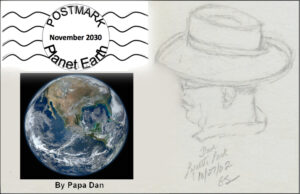
“Don’t discount the power of fiction
to change the world;
it has happened over and over
throughout our history.”
Click here to download a PDF of this post:
Let_Me_Help_Final
City On the Edge of Forever
The television series “Star Trek” was a collection of 79 time- and space-travel stories that appeared from 1966 to 1969. As a teenager, it was my favorite TV show. The episodes were set in the future — some time in the 2200s. In the episode titled “The City on the Edge of Forever,” written by Harlan Ellison, the Starship Enterprise is flung back in time from the 23rd century to the planet Earth in the year 1930. Captain Kirk, Mr. Spock, and Dr. McCoy find themselves in New York City, which is suffering in the depths of the Depression. They meet Edith Keeler (played by Joan Collins) who is in charge of a soup kitchen set up to feed the (many) hungry. Captain Kirk, of course, falls in love with her. She senses that Captain Kirk and his two companions are distressed about something. She, of course, has no clue that they are stuck three hundred years into their own past, not sure how they are going to get back to their own time. They have this conversation:
Edith Keeler: Why does Spock call you “Captain?” Were you in the war together?
James T. Kirk: We served together.
Edith Keeler: And you don’t want to talk about it? Why? Did you do something wrong? Are you afraid of something? Whatever it is, Let Me Help.
James T. Kirk: Let Me Help . . . A hundred years or so from now, I believe, a famous novelist will write a classic using that theme. He will recommend those three words even over “I Love You.”
Edith Keeler: A century from now? Who is he? Where does he come from?
Where will he come from?
James T. Kirk: Want to hear a silly answer?
Edith Keeler: Yes.
James T. Kirk (points to the sky): A planet, circling that far left star in Orion’s belt, see?
— City on the Edge of Forever, Earth, 1930 (aired on TV April 6, 1967)
Captin Kirk tells her that this novel “changed everything.” From our perspective here in the 21st century, we realize that, if this novelist published his story about 100 years from that day in 1930, it would appear some time in the next few years here in our own twenty-first century. ………… More on that later.
The plot of this Start Trek episode itself focused on the dilemma facing the time travelers in light of “The Prime Directive,” also known as “Starfleet General Order #1.” The “noninterference directive” prohibited Starfleet crews from doing anything that interfered with the internal and natural development of alien civilizations.
While trying to figure out how to get back to their own time, Spock uses his tricorder to recreate the “actual” history of the time they are visiting and discovers that Edith Keeler was supposed to die that year in a traffic accident. Examining an altered timeline accounting for their interference, Spock learns that, if her life was spared, Keeler would go on to found a pacifist movement, causing the United States to delay its entrance into World War II and allowing Nazi Germany time to develop nuclear weapons, with which they will conquer the world. Kirk admits his love for Keeler, and Spock answers that Keeler must die in order to prevent millions of deaths.
Kirk is faced with a harsh reality: Edith Keeler must die in a traffic accident — which they could easily prevent — in order for history to proceed the way it must. So, at the climax of the episode, we see Captain Kirk restraining Dr. McCoy, preventing him from saving her life, to save the future of the human race — that is, to save us. Dr. McCoy, of course, doesn’t understand and shouts, “Do you know what you just did?!” Spock answers, “He knows, Doctor, he knows.” After that scene, a heartbroken Captain Kirk and his crew return to the Starship Enterprise, and he orders them to “get the hell out of here” — back to their own time.
Well, What About the Novel? Is this Story About Us?
Fifty years ago, in addition to the time-travel and space-travel aspects of this story, the tragic love story of Edith Keeler and Captain Kirk appealed to me. For those of us who live in this time of gathering turmoil here in 2019, a novel “expected” to appear about a century after 1930, titled “Let Me Help” — a novel that we are told “changed everything” in OUR time — might pique our interest even more. We might wonder, as the Edith Keeler character asks about this novelist, “Who is he? Where does he come from?” And, most important to us, what necessary changes would such a novel inspire? Looking ahead to OUR next few years leading up to 2030, presumably the aftermath of the current struggle, we can imagine what changes will be needed and how the novel, and its title, might inspire those changes.
Looking Ahead: A Novelist Writes in the Year 2030 — What might he say?
In the year 2030, an increasing number of people are likely to realize that a lot of very serious problems can be traced to some societal changes that began around 2016. A fictional novelist takes up his pen and writes a story — a piece of fiction — about the beginning of a small movement called “Let Me Help.” In the novel, a small group of friends, about a dozen or so, start meeting in a bistro in the Mission District of San Francisco, initially to whine about how bad things had gotten and how ineffective the government had become in addressing a series of growing problems — local and national. One afternoon, this group gathered around a table in a bistro and made a list of their observations:
• While the unemployment rate has reached a new low, the number of people under-employed (i.e., working full time at one or more jobs but not earning enough to afford a decent American life) is increasing. Why? With the diminishing influence of labor unions in many parts of the country, large numbers of workers cannot afford basic health care, childcare, or home ownership.
• Many of our kids, even in otherwise middle-class communities, go to school hungry. Some communities have programs that provide healthy school lunched, but those programs are few and far between. In spite of the strength of some parts of the economy, the homeless population, noticeably in San Francisco, has dramatically increased.
• More and more employed Americans are forced to live farther from their workplace, lengthening the work day, clogging freeways, and adding to air pollution.
• Increased use of fossil fuels continued its indisputable harm to the economy and health.
• In many parts of the country, financial support for public schools, which used to be an international source of pride for America, has diminished. As a result, test scores, especially in science and math, have declined and fallen behind those of other developed nations. Ignorance of American institutions is increasing. Basic job skills are in decline.
• In many parts of the country, a rash of natural disasters — hurricanes, tornadoes, floods, earthquakes and wildfires — have destroyed communities near and far, leaving large numbers of families without the means to rebuild their lives. In some cases, the need is temporary. In some cases, the need is ongoing.
At the end of the second chapter of the novel, the group reviewed their list, shaking their heads at how far everything had fallen from the hopes they had all grown up with. One member of the group decided to post their list on a couple of social media platforms, along with some local examples of ways that San Franciscans were being harmed by these issues. His post ended with a public invitation to join a small group planning to organize efforts to help locals who are affected by the lack of effective government attention to these and other local issues. The group gave themselves a name “Let Me Help” and scheduled their next meeting on a Saturday afternoon in two weeks. They hoped to acquire a handful of new members from their social-media invitation and figured that they could organize themselves to help out at some local soup kitchens and homeless shelters. Maybe they could organize tutoring to increase job skills and help people apply for jobs. Pleased with themselves, they ordered a round of drinks and turned their attention to a ballgame on the big screens.
‘Let Me Help’ Becomes a ‘Thing’
Two Saturdays later, the dozen or so people who had met to whine and make their list came back together to plan some next steps in their little project. One by one, as they approached their favorite bistro, they were stopped in their tracks in amazement. Traffic on the nearby streets was clogged. Once they were able to walk up to the bistro, they found a crowd of several hundred people had filled the sidewalks on both sides of Van Ness Avenue and bulged out into the street blocking traffic. People wanted to know where “Let Me Help” was meeting and they wanted to sign up to join the effort. Some were a bit annoyed that there seemed to be a noticeable lack of organization for such an important project.
What To Do?
This little group had not expected anything like this. After stumbling round awhile, they were able to herd the crowd over to the public square next to the BART station and one of them stood on a bench and spoke. It didn’t take long to discover that these people who responded to the online invitation were attracted to the idea that something could be done to mitigate the inadequacy of government to address the problems that had emerged in recent years, and they were hungry for an opportunity to help. After some discussion, a sign-up list was created with contact information and promises were made to set a new meeting date (at a larger venue) and organize some specific committees to address some of these issues at the local level.
To make a long story short …
• Committees were formed over the next month.
• Groups collected food donations and delivered them to several homeless shelters and soup kitchens in The City. Some went to a City Council meeting and petitioned the City to have the “Let Me Help” group registered as an official local charity. Arrangements were made for the group to meet with City officials about some long-term proposals to combat hunger and homelessness in San Francisco.
• Two local grocery stores pledged to start an ongoing program of excess food deliveries. A local hotel owner pledged a sizable donation; and a small facility was identified in one of his buildings to store supplies and eventually, serve members of the public.
• Using social media, “Let Me Help” groups were formed throughout the Bay Area with similar results in six cities.
• Stories appeared in the local newspapers and reported on a local TV station. The local story was picked up in the New York Times, and later CNN, describing the organizational model initiated by the small SF group.
• Within five months, copy-cat “Let Me Help” groups were formed in 25 cities in ten states. Local newspapers spread the word, initiating some competition among cities — rising to the level of a twelve state capitals — you know “Our state knows how to do this better than … “ and so it went, until …
• A low-level State Department official in Washington D.C. brought the story to the attention of the Secretary of State, who …
• At a meeting in Vienna of the newly-constituted Group of Seven Plus (G7+3) Alliance, the U.S. took the lead on a project to partner with ten national government agencies and make “Let Me Help” an international agency for supplying food, temporary housing, and employment support for citizens of all participating countries.
• The United Nations met in New York to discuss making “Let Me Help” a UN-sponsored, internationally recognized entity for standardizing border-crossing protocols and immigration support for all UN member nations. An interesting by-product of this effort was that attention was drawn to large numbers of people — both citizens and immigrants — in member nations who are living without basic necessities. The program expanded and many lives were improved.
The “Let Me Help” Novel Tops the ‘NYT Best Seller List’ for the Ninth Week
Let’s not forget that all of this takes place on the pages of a novel. A very good novel … just a work of fiction … OK, a novel that hasn’t yet been published …. But, in the novel, with such an uplifting and optimistic work of fiction discussed on talk shows and in literary magazines around the world, something interesting happened. A well-known former U.S. First Lady made the book the topic of her first speech to the world in her capacity as the newly-elected Secretary General of the United Nations. She asked, “Is it possible that this story could become OUR story? You know — you and me, all of us? Do we have what it takes to become the change we all have longed for since, well … you know … since we seem to have paused our world-wide commitment to … uh … you know, doing the right thing?” Do we have the humanity? If your answer is yes. Let Me Help. Here is how I’d like to help … “ She made a list of suggestions of programs that government can initiate and a list of existing programs to which individuals around the world can support.
And so it was …
And, of course, it was fiction — just a story in a novel … a novel to be written in our time — as foretold in a Star Trek episode that takes place in our future … and in our past … that we saw fifty years ago.
Just as Captain James T. Kirk said in a New York soup kitchen back in 1930 … and … well, will say in a couple of hundred years as captain of the Starship Enterprise, the novel “changed everything.”
Everything.
So, what about us?
I bet we could generate a list of existing programs that will accept our small donations that can make a difference for lots of people who need help. Here are just a few:
• World famous Chef Jose Andres has an organization called the World Central Kitchen. He brings his “kitchen staff” around the world to places devastated by earthquakes and hurricanes and set up kitchens where he has fed thousands of people who had lost their homes. His motto is: ”Wherever there is a fight so that hungry people may eat, we will be there.” Anyone can visit his website (https://wck.org/ ) and make a donation.
• Grace Cathedral in San Francisco (we go there for their Christmas music) co-sponsors The Winter Interfaith Shelter in collaboration with the San Francisco Interfaith Council and run by Episcopal Community Services. The Interfaith Shelter provides dinner, breakfast and a dry place to sleep for 60-100 homeless men during the coldest and wettest time of the year. https://gracecathedral.org/winter-interfaith-shelter/
• We have a neighbor who invites us to donate needed items to the local SPCA, especially to temporarily take care of animals who have been orphaned by the wildfires in northern California. Almost everyj town has one and they accept things like bedding (any used sheets, blankets, towels), newspapers, kitty litter, pet food, and more. My old friend Lew (OK, don’t tell him I said he’s old) actually volunteers at his SPCA in Monterey.
• The Alameda County Food Bank provides food for 116,000 people who turn to them each month (more at Thanksgiving). Take a look at www.accfb.org. A $25 donation will help to provide $175 worth of food.
Dear Readers:
—-> I bet you have a favorite charity to recommend that makes life better for those who need help. If you do, send me your “Let Me Help” suggestions and I’ll spread them around to our ConVivio readers. I bet we can help.
—-> Which of us will step up and write the novel that could change everything? You have ten years — plenty of time, right?
![]()
Yosemite — October, 2019
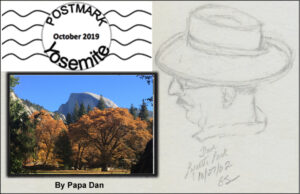
“The dry waterfalls and sparse rivers of Autumn simply provide a promise
for the coming of Spring.
The bright Fall colors are a reminder
of that promise.”
— PapaDan
= = = = = = = = = = = = = = = = = = = = = = = = = = = = = = = = = = = = = = = = = =
As I’ve written during previous Autumns in Yosemite, this wonderful valley is always changing. The two most prominent features of Yosemite are “Permanence” and “Change.” (See an old ConVivio piece on that subject.) What’s the Peter Allen song — “Everything old is new again.” Yosemite Valley certainly qualifies as OLD — having been carved by a slow-moving glacier beginning about two million years ago, with its sturdiest rocks (e.g., Half Dome) weighing in geologically at about 87 million years. AND as always, it is NEW again à This year, this month, we observed that the Fall Colors are more dramatic than ever (more on that later).
Another piece of Yosemite news in the “Old-and-New” category is that Yosemite National Park has re-acquired its old revered names — the Hotel is now again named The Ahwahnee and Curry Village and Wawona have their names back, as does Yosemite Lodge, and others. I have known these names for fifty years, and they mean something to me. The lawsuit was settled in July after a three-year fight over ownership of the names.
(Talking with a waiter in the Ahwahnee dining room, I observed that the fight was over money. He corrected me and explained, linguistically, that the problem was caused by ‘politics.’ He said, “ ‘politics’ is a word with two parts: ‘poli,’ meaning many, and “tics,’ meaning small blood-sucking creatures.” I expect to use that line again.)
The Ahwahnee Hotel is certainly old by our own standards, having been built in 1927. BUT, what’s interesting to me is this: the name Ahwahnee was given to this part of the valley by the native Ahwahnichi Tribe about 600 years ago — long before the National Park Service or even the United States of America existed. So, the idea that a 21st-century hospitality management company can claim to “own” that name is ridiculous. But now, sanity has been (temporarily) restored (repurchased) and some good old things are new again.

The National Park Service quickly, proudly, replaced the signs.
Yosemite’s Dramatic Fall Colors — October, 2019
We tend to think of the Stanislaus National Forest, where Yosemite is located, as being dominated by evergreen trees like the Giant Sequoia Redwoods, Ponderosa pines, incense-cedar, Sierra Juniper, white fir, and the like. With that in mind, most of us don’t expect there to be much in the way of dramatic Fall colors. BUT, Yosemite Valley is also populated by California Red Fir, various varieties of Hemlock, California Nutmeg, Black Oak, Alder, Birch, Dogwood, Laurel, Big Leaf Maple, Quaking Aspen, Cottonwood, and Willow. All of these punctuate the broad green background with prominent splashes of reds, yellows, golds, blues, ambers, and combinations of those. Here are just a few examples of photos I took just last week in Yosemite:




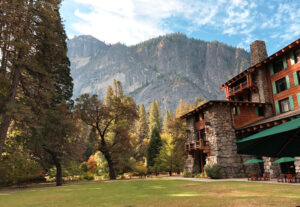
And The Water — October, 2019
As in Autumns past, one of the most striking features of Yosemite in October is:
The silence.
Unless you visit Yosemite in the Fall, when the waterfalls in the valley are dry, you might not realize how much the roar of Yosemite Falls dominates the sound of the valley in the Spring. When the waterfalls are not running, there is a remarkable silence.
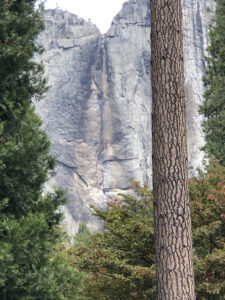
On the left, you can see the place where Yosemite Falls is normally pouring its heart out in the Spring. Here in October — not a drop. The water-scarred granite face of the mountain is bone dry.
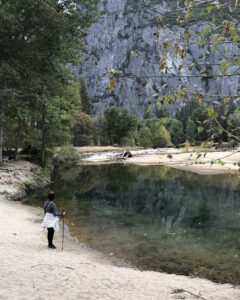
Here, you can see the Merced River where it meanders through the valley. Now, in October, it is lower than I have ever seen it and it’s not moving. In the Spring, on the spot Gretta is standing in this photo, she would be standing waste deep in water. Where I am standing to take this photo, I would be ankle deep. We were told that, even though there was a significantly wet winter this year, more of the precipitation came down in rain and fell later than usual. In fact, you can see the hundreds of fallen trees that were brought down this past winter by the flooding. And, a lot of the snow that had fallen melted quicker than usual between Spring and Fall, causing the waterfalls to dry up sooner and the river to recede more than usual.
Looking Ahead to Spring, 2020
Gretta and I also come to Yosemite every April, for our anniversary, and one thing is a constant in April — Yosemite Falls is always flowing with its usual vigor. The sound is not merely of running water, but of chunks of ice and fragments of logs from the high country crashing down on the rock formations between the peak of the falls and the valley floor. All of that — plus the constant rushing of the water — creates a polyphonic orchestration complete with percussion, and you can hear it everywhere in Yosemite Valley from Half Dome to El Capitan to Glacier Point. We’ll be back in six months to see, and hear, the results that we have come to expect.
The climate is changing. We’ll just have to keep monitoring our best gauge of the changing colors and the water — here in Yosemite Valley. It speaks to us. Our task is to watch and listen.
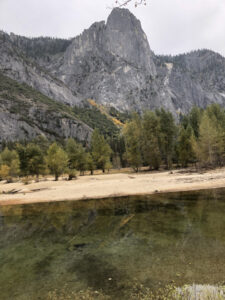

![]()
Reflections On Change — It’s Fall, Right?
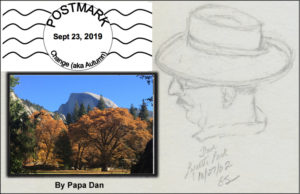
“One cannot make the words too strong.”
— Mark Twain
Click here to download a PDF of this post: Its_Fall_Change
It’s Autumn (aka Fall)
This year, Autumn begins on Monday, September 23 and ends on Saturday, December 21, here in the Northern Hemisphere. During this season, daylight hours become noticeably shorter and the temperature cools considerably. It is also the time when crops and fruits become ready for harvest. In English jargon, over time it has come to be known as The Fall because most leaves fall to the ground and change the color and texture of the landscape dramatically. As a result, all of this change provides great beauty to see in the Fall; and each region has its own style.
Vermont through a windshield—Fall 2013
 Now, some people will tell you that you must travel to New England to see “Real Fall Colors.” OK, Gretta and I did that in the Fall of 2013 just to see the colors and — OK — they do know how to do colors in the northeast when Summer turns to Fall. Vermont, New Hampshire, Connecticut, even Maine, did strut some colorful stuff. BUT, while that experience was spectacular, I’m here to tell you (among other things) that you don’t have to travel to the Northeast to see “Real Fall Colors.” Let’s not forget that we live in California.
Now, some people will tell you that you must travel to New England to see “Real Fall Colors.” OK, Gretta and I did that in the Fall of 2013 just to see the colors and — OK — they do know how to do colors in the northeast when Summer turns to Fall. Vermont, New Hampshire, Connecticut, even Maine, did strut some colorful stuff. BUT, while that experience was spectacular, I’m here to tell you (among other things) that you don’t have to travel to the Northeast to see “Real Fall Colors.” Let’s not forget that we live in California.
So, whadda We got?:
— In southern California, the most notorious source of “Fall colors” is the Black Oak, which turns its leaves to a nice golden yellow.
— In northern California, right here in the Bay Area, big-leaf Maple trees are famous for showing off their gigantic deeply reddened leaves before they fall to the ground.
— Farther north in Humboldt County, we see Oregon Ash, Dogwood, Red Alder, White Alder, Cottonwood, and (watch out!) Poison Oak. Each of these is spectacular and, when you can see them all at once … Whoa! … there are no words …
— In Shasta County, especially around Burney Falls, you can see ALL of those plus Vine Maple, Buck Brush, Deer Brush, Red Flowering Currant, and Squaw Bush — all turning from various shades of green to a profusion of reddish, orangish, yellowish, and brownish hues.
— AND THEN there’s the wine country(ies) throughout California, … as the grapes sweeten for harvest and prepare themselves to become the best wine in the world, the vines and ground cover can fill your eyes with multiple shades of greens and reds and even blues and yellows … well … OK, so you’re going to tell me that it doesn’t make sense to try to describe the dramatic changes that happen in the Fall with words, and you’ll be right. AND THEN, you’ll tell me that showing just one picture, or even two, as examples of this phenomenon will fall miserably short of the task. Below — First: Fall Colors in a California Vineyard — Second: And Up Close.
But, well, you gotta look at some colors before we talk about this subject some more.


So, before we continue, you may ask, what exactly is the subject? Is it really about the colors? Or is it about the only constant we can be sure of in this world — change.
Change Is Gonna Come — Oh, Yes It Will
Of course, all of these magnificent colors appear and the leaves fall to the ground because they are dying. Dying. You know, the living things that grow out of the Earth bud and blossom in the spring, they live their lives all summer, and then they die in the Fall. They must die because the trees and vines must shed their growth, spend the Winter in a comatose state — also known as hibernation, suspended animation, … uh … you know, “death” — so they can be reborn and come back to life in the Spring. But, we have to rake up the dead leaves first — And make no mistake, they are dead. Those are the rules.
It’s about change. It’s about change that must happen. But you knew that …
So, We Look to the Poets
Our poets go out of their way to move us past the obvious and convey to us more than the appearance of stunning changes like those we experience in the Fall; they are inspired by the cool fresh air and the end of oppressive inland heat; they celebrate the wonderful produce of all of that struggle (especially in wine country); AND, they also spend some effort marveling at the “terrible beauty” of the cycle itself — birth to life, life to achievement, achievement to beauty, beauty to death, and death to rebirth. Each of these steps must follow from the steps before them. So, often, poets are trying to reveal how all of this inevitable change feels for us humans and what expectations those feelings generate. So, how do we humans experience change?
Let’s ask some of our poets about change, through eyes that view the colors of the season:
- In this one, a young Shakespeare seems to focus on the sense of loss that Fall brings.
That time of year thou mayst in me behold — Sonnet #73 by William Shakespeare
That time of year thou mayst in me behold
When yellow leaves, or none, or few, do hang
Upon those boughs which shake against the cold,
Bare ruined choirs, where late the sweet birds sang.
In me thou see’st the twilight of such day
As after sunset fadeth in the west;
Which by and by black night doth take away,
Death’s second self, that seals up all in rest.
In me thou see’st the glowing of such fire,
That on the ashes of his youth doth lie,
As the death-bed, whereon it must expire,
Consumed with that which it was nourish’d by.
This thou perceiv’st, which makes thy love more strong,
To love that well, which thou must leave ere long.
- Next, Robert Frost appreciates the colors of the season, but laments the loss that follows.
Nothing Gold Can Stay by Robert Frost
Nature’s first green is gold,
Her hardest hue to hold.
Her early leaf’s a flower;
But only so an hour.
Then leaf subsides to leaf.
So Eden sank to grief,
So dawn goes down to day.
Nothing gold can stay.
- In her book Time and Place, local poet Lauren de Vore reflects on the responsibility for introspection that comes with the expectation of change. In the chapter on Autumn, her sonnet Taking Stock identifies the change of Autumn as something much more than colors.
Taking Stock by Lauren de Vore
October is my time to introspect,
As like a gleaner following the scythe
I cull through recollection’s field and, eyes
Attuned to see, unflinchingly reflect.
It’s easy to tot up the obvious,
That never-ending list of tasks that should
Be done before the rains arrive and would
Were I, in this, not kin to Sisyphus
Th’intangibles are harder to appraise;
Did I come through for those who needed me?
Did kindness guide my words and honesty
My acts, or did I tread a selfish maze?
One must at times take candid look within
In striving for a life that’s genuine.
- Frank DeRose comes right out and tells us that Autumn is gonna bring important change that will matter very much to us humans, well beyond the colors we see around us.
To Change Autumn is the Season by Frank DeRose
Colors turn,
Leaves fall.
For everything there is a time.
Autumn is a time for change,
A time for being human,
A time to reflect
(On warm summer nights),
And a time to anticipate
(Fiery winter days).
We are human.
Ever-changing,
Ever-moving,
Endlessly.
We are autumnal beings.
Yellow with happiness,
Orange with warmth,
And red with anger.
Red with love.
Red with hatred.
We are as cool
As the crisp breeze,
And as warm
As the colors around us.
To everything there is a season,
For everything there is a time.
A time to lie complacent,
And a time for change.
Autumn is the time for change.
- And our dear old friend Mark Twain brings this Autumnal experience to a close by showing us, entirely with his words, the natural climax of the change at the end of Autumn — words that convey this miracle in ways that a photograph could never do. He shows us the New England ice storm that brings the Fall to its dramatic conclusion. In front of an audience one day, Mr. Twain, rambled on like this (it is my favorite paragraph in all American literature):
— If we hadn’t our bewitching autumn foliage, we should still have to credit the weather with one feature which compensates for all its bullying vagaries — the ice-storm: when a leafless tree is clothed with ice from bottom to top — ice that is as bright and clear as crystal; when every bough and twig is strung with ice-beads, frozen dew-drops, and the whole tree sparkles cold and white, like the Shah of Persia’s diamond plume. Then the wind waves the branches and the sun comes out and turns all those myriads of beads and drops to prisms that glow and burn and flash with all manner of colored fires, which change and change again with inconceivable rapidity from blue to red, from red to green, and green to gold — the tree becomes a spraying fountain, a very explosion of dazzling jewels; and it stands there the acme, the climax, the supremest possibility in art or nature, of bewildering, intoxicating, intolerable magnificence.
One cannot make the words too strong. — Mark Twain
So much for the changes that Fall brings. Along with all of these features, the coming of Fall can remind us humans, at least subconsciously, of the other kinds of change we come to expect — if we are optimists — or the kinds of change that we want to see, that we hope for, that we desperately need to see, that we may fear are out of our reach, as we look around at the disappointing world of the time in which we live.
- Among our poets, songwriters have expressed some of our deepest feelings. Speaking for many of his time (late 1964) and of our own who have grown up in hard times, San Cooke wrote a song that never quite made it to the top of the charts, but still insisted on optimism:
A Change Is Gonna Come by Sam Cooke
I was born by the river in a little tent
Oh and just like the river I’ve been running ev’r since
It’s been a long time, a long time coming
But I know a change gonna come, oh yes it will
It’s been too hard living, but I’m afraid to die
‘Cause I don’t know what’s up there, beyond the sky
It’s been a long, a long time coming
But I know a change gonna come, oh yes it will
I go to the movie and I go downtown
Somebody keep tellin’ me don’t hang around
It’s been a long, a long time coming
But I know a change gonna come, oh yes it will
Then I go to my brother
And I say brother help me please
But he winds up knockin’ me
Back down on my knees, oh
There have been times that I thought I couldn’t last for long
But now I think I’m able to carry on
It’s been a long, a long time coming
But I know a change is gonna come, oh yes it will
Experience Teaches; and We Must Learn
So, those of us who look around and see so much that needs to change, so many who desperately need those changes, and so many obstacles stacked up against those changes — what’s a person to do? It seems increasingly clear that it will not be enough to be an optimist, like Sam Cooke, and rest assured that “Change is gonna come — yes it will.” So, we wonder if there are things that some of us urgently need to be doing to bring the changes that the seasons will not bring on their own? Once again, we are reminded of the words of Edmund Burke:
“All that is necessary for evil to triumph is for good men to do nothing.”
A poet of our own time gave us some further advice: “BE the change you seek,” he said. So, we know from the experience of the Fall that change is inevitable. Nothing stays the same and for very good reasons. Some things must die to make way for other things that must arrive. But must we just wait for it like Sam Cooke? Edmund Burke taught us long ago that is the worst thing we can do, and history has proven him right. We can look around and see that some people are MAKING change happen that is seriously evil while we watch — change that unravels progress we thought we had made. Positive changes we thought would endure in the way humans treat each other are reverting to hatreds we had hoped were diminishing. Opportunities for people to raise their standard of living are receding before our eyes in our country — and we see people in power making that happen by their words and actions. Must we merely wait and watch them do their damage and hope for the best? OR, does the optimism of San Cooke carry responsibilities with it to change the course of change itself?
It happens in nature as well as in human behavior. In a world with a warming climate, the changes that come at the end of Fall will be disastrous — we can see it happening if we are paying attention — the necessary ice melts; the rainfall floods the fields instead of nurturing the crops; the bees required to pollinate everything are dying out; the colors are different.
The hard truth is that we know why those things are happening. We know which industrial human behaviors are causing those changes. Yes, it turns out that actually can control the change. If we just wait and watch, others will control the outcome. Some are actually valuing dollars ahead of human survival. How can we make change happen that we need, instead of allowing others to dictate the destructive changes that we can see coming? There’s work to do. We do need to BE the change we seek.
We’ve learned that we are not likely to be successful acting alone. We’ve been told — it takes a village; it takes unions; it takes a unified political party; it takes a committed nation, it takes partnerships and alliances that cross all kinds of borders. Forces that divide and impede our collective efforts must be recognized for the harm they bring and must be defeated. These are hard words; but they are the lessons we have learned.
So, Fall is the time to take stock of our behavior and take responsibility for the effect we have on the direction of change. We have seen what happens when we do nothing. It is not a mystery. We must help each other survive the Winter and bring on the Spring.
![]()
A “Tense” Meeting
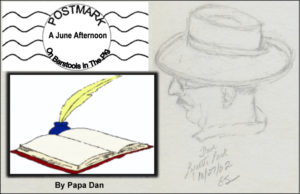
“The Past, The Present, and The Future
walk into a Bar.
It was tense.”
— A very old, ungrammatical, grammar joke
Click here to download a PDF of this article:
ConVivio_Tense_Meeting
= = = = = = = = = = = = = = = = = = = = = = = = = = = = = = = = = = = = = = = = =
The Past and The Present Walk Into a Bar – Their Companion Is Late
I’m sitting at my usual barstool at The Flying Pig, a friendly bistro in San Francisco’s Mission District, sipping a Sonoma County Zinfandel and enjoying my usual BLT (on Focaccia with extra bacon), when two people walk in and take two of the stools at the end of the bar to my left. The guy appears to be in his late fifties wearing dress pants, a sport coat, a vest, and a fedora. His companion, perhaps in her thirties, is wearing casual slacks, a scarf, and a sweater. He places his hat on the bar, looks around and confirms, “Yep, she’s not here yet. As usual, with her, it’s easier to settle on the place to meet; but the time is often a problem for her.” His companion agrees. “That’s the trouble with ‘The Future,’ ” she said; “She usually arrives later than we expect.”
The bartender greets them with his usual enthusiasm “Welcome to The Flying Pig. My name’s Will. I’m glad you could visit us. Can I pour you something? We have some very interesting choices!” After listing some of their most recent acquisitions — the latest up-to-date local craft beers — she orders a 2019 Founders IPA and, after some discussion, he orders a 2012 Napa Valley Cabernet.
I can’t help overhearing their comments about the companion they were waiting for. The gentleman says, “Sure would be nice knowing what to expect from her. I mean, she’s not always a surprise; but we just never know until he shows up, you know?”
His companion agrees. “Right, I know she’s from “The Future” and all; but I think she gets it wrong most of the time. Some of the things she has told me about … you know, ‘The Future,’ are just not believable. Others have just not turned out the way she warned. Last time we got together she had told me she was going to take a taxi, but she ended up arriving in something that didn’t even have a …” William interrupts and brings their drinks and a menu, “You were right, sir, about that Cabernet. It was very popular in its day and I’m surprised we still have some. It was hidden behind something … uh … more recent. Hasn’t been much call for it lately. Our French Dip would go well with it, as would the Classic Roast Beef Sandwich. And, of course, everything goes well with your IPA, … uh … ma’am.“
“They call me Alpha. He’s Janus.” She whispers to Will, “I call him ‘Tom.’ “T” “O” “M” That’s short for ‘The Old Man’ .”
“Uh … of course.”
Janus (aka “Tom”): “I’ll have the French Dip on sourdough. It was excellent last time.”
Alpha: “Have you been here before? I didn’t know that.”
Janus: “Just a few years ago … This place has been here for quite some time. Actually, my memory of this neighborhood goes back to the thirties. I was here with an Italian guy named Vince — a ballplayer with the Seals in the Pacific Coast League. He had his younger brother, Joe, with him. The ballpark was just a few blocks from here at 16th and Bryant. Believe it or not, in those days, it was hard to find a place to get a drink around here.”
Alpha: “You’re not gonna tells us that ‘DiMaggio’ story again are you?”
Janus: “Apparently not.”
Will: “And Alpha, what can I bring you?”
Alpha: “If the ingredients are fresh, I’ll have a salad — romaine, cherry tomatoes, perhaps an avocado, a little parmesan, olive oil, and a little vinegar. I can taste the ‘fresh’.”
Will: “Coming right up.”
Just then, a tall confident woman walks in and both Janus and Alpha say, in unison, “Well it’s about time.” Alpha: “We’d just about given up on you — ordered lunch already. Where’ve you been?” PapaDan notices the clock on the wall says 12:30 pm.
Cassie (sarcastically): “Nice to see you, too. You haven’t changed a bit.” She takes the barstool at the end of the bar next to Janus and ignores Alpha’s question.
Alpha takes charge of introductions. “This is Cassandra — Cassie. That’s Will and Ben behind the bar and this (she pointed to me, apparently aware that I had been eavesdropping) … I didn’t catch your name.”
PapaDan (just a little embarrassed): “Around here, they call me PapaDan. Pleased to meet you.”
Alpha (to Ben and Will behind the bar): “So, when’s the last time you had The Past, The Present, AND The Future here at … what’s this place called … ? The Flying something, right?”
Ben: “The Flying Pig. Uh, Cassie, can I bring you something?”
Cassie: “Is there a special today?”
Ben: “Yes, actually the chef is trying something new today, not sure what’s in it or what he’s calling it, but it probably has … ”
Cassie (interrupts): “Ground Lamb on Pita with olive oil, crushed garlic and sage, and ground tomatoes.”
Ben (with a grin): “Well, I doubt it … I mean we’ve never had …”
Cassie: “Don’t worry, you will. It’s new. Your chef’ll call it Cordero con ajo.”
Ben (a bit startled): “Well, I’ll check. And something to drink?”
Cassie: “You’ve got a mixed blend from up north — a Cab/Chard?”
Ben: “Uh … I don’t think I’ve ever … “
Cassie (with a knowing smile): “Perhaps something new came in this morning?”
Ben (confused): “Well, I don’t … I mean … I’ve never heard of a blend quite like that … I’ll see what came in. I’ll be right back.”
Cassie (to nobody in particular): “They’ll both be very popular before you know it.”
Alpha: “Alright, Cassie, you said we needed to talk. Something about some kind of warning?”
Janus: “Right, so is this another one of your … uh … surprises … predictions … ?”
Cassie: “Have some respect, will you? This time it’s serious. But, lunch first; and the wine will help.”
Will brings the French Dip and the salad, with silverware and some chips and salsa. Then he gestures to me, pointing to the far end of the bar. “Can I show you something? I’ve got this … uh … let me show you.” He leads me over past the last barstool, out of earshot of the three visitors, and leans across the bar. “These people with the strange names, they’re … uh … I don’t know. Different. He’s been talking about visiting the neighborhood like eighty years ago and, whatsername — Cassie — she seems to know things before we do. The other one seems kinda normal, but … am I missing something? What do you make of them?”
“Well, funny you should ask. Listening to them, I was reminded of — you’re not gonna believe this, you’ll think I’m crazy — OK, and it won’t be the first time — I’m reminded of way back in school, Greek mythology.”
Will: “Dad. You’re not gonna get all ‘back in the old days’ on me, are you? Again?”
“Well, yes, I guess I am. OK, I’ll say this and you can ignore it. This is what came to mind while they were talking. In Greek mythology, Cassandra, was the daughter of the king of Troy, and was quite beautiful. Apollo, the son of Zeus, was the god of a bunch of things like knowledge, music, art, poetry, oracles, and prophecy. He was a youthful, athletic god accustomed to getting his own way. According to the myths, he was mesmerized by Cassandra’s beauty, so he gave her the gift of prophecy. But when she refused his romantic advances, he placed a curse ensuring that nobody would believe her warnings. So, I think that’s Cassie. And the guy at the bar, Janus — the Romans had a god named Janus. He was the god of beginnings, transitions, doorways, the passage of time, and endings. I suppose he would be in charge of ‘The Past.’ And ‘Alpha’ — I guess she’s about things that start right now. OK, you laugh, but YOU asked. These folks ARE a bit different.”
Will looks down at the other end of the bar at the three new customers. “Well, ‘Alpha’ did say something like ‘So, when’s the last time you had the Past, The Present, AND The Future here? Apparently, Cassie says she brought them together for some kind of warning. But she’s saving it for after they have lunch. Maybe you need to go back and listen.”
“Well, I’ll do my best. Everybody has to be good at something.” I slide back to my place at the bar next to the three visitors. Say, Will, how about another glass of this Zin.”
Meanwhile, the chef walks up from the kitchen and, with a flourish, presents his new creation — “Cordero con ajo,” he announces. “It’s new. I’ll be interested in your review.” Ben and Will are dumbfounded to hear this. (Will notices that the clock on the wall still says 12:30 pm.)
During the next few minutes, Cassie enjoys the new dish, praises it lavishly, and passes around the Cab/Chard bend for others to taste with their food. It receives decidedly mixed reviews.
Alpha: “Ok, Cassie, you brought us together, here and now, to pass on some warning to us, right? Or so you said. Tell us. What’s coming?”
Cassandra then lays out a detailed story of what’s to come — stimulated by the current American leadership and perpetuated by supporters of that leadership — a story of worthless and all-but-forgotten government institutions, disintegration of the underlying cohesion of communities, increasingly overt racism, degradation of the role of women, the domination of extreme wealth resulting in economic and social upheaval, and a widespread isolationism that made alliances and partnerships, internationally and locally, all-but-forgotten remnants of the past. The long-standing values and connections that have held societies together would soon to be remembered only by Janus and few others. A bit of a crowd gathers around that end of the bar, listening intently without comment. When she was apparently done with her warnings, Janus interrupts the silence with an observation and a question: “So, Cassandra, your warnings are believable, in that they have all happened a number of times in the past across long memory and they have all been repeated over time. However, since you are from ‘The Future,’ I must ask you if they are inevitable.” Are they fixed in stone, as is ‘The Past?’ Is there nothing that can prevent or reverse the warnings you give? Or are they just predictions?”
Cassie: “I am sorry, but that is beyond my expertise. What I know about is ‘The Future.’ I can tell you that the path to ‘The Future’ is made up of a long series of cumulative decisions that you all make every day. I can tell you what is to come if current trends continue along the same pathways. Frankly, it’s not that difficult; I’m sure you can see it yourself if you’re watching the news. But, each of you, makes thousands of decisions every day. When you leave this place, you will decide to turn right or left. After doing that you will decide where to go and how to get there, whom to bring with you and whom to leave behind; and you will decide what to do when you get there. That is the nature of “now,” and it’s something that Alpha knows more about that I do. However, I suspect that ‘The Past’ — that’s you Janus — can provide some insight.”
Janus: “Well, Cassie, I do know about how such things have evolved in the past. AND, as you suggest, ‘Evolved’ is the right word. Important decisions and outcomes were always determined slowly and without much planning. Let’s see — an example — back in 1770 at an important moment in history, that process was described accurately by a member of the British Parliament. It was Edmund Burke. He had this to say: ‘The only thing necessary for the triumph of evil is for good men to do nothing.’ In England, slavery was abolished by the next generation of leaders on August 1, 1834. During that time, it turns out good men actually did something, but slowly. Here in America, it would take all that time, plus thirty more years AND a Civil War in the 1860s to abolish slavery here; BUT even then, good men continued to Do Nothing leading to the disastrous Reconstruction and the subsequent century of segregation and racism compelling the Civil Rights movement 100 years after that War — AND STILL, fifty years later, good men are doing a whole lot of nothing. So, Cassie, we ask: are the things you have warned us about certain to happen? Sounds like what you’re telling us is that the answer is a question — the same question — will good people actually DO SOMETHING about it? You see, there is time between now and later to DO something to change the outcome you have described. If nothing is done, I can see that your predictions can be accurate. If good people decide to change that outcome, it can be done. THAT’S your warning. I see that now. The time has come. Before too long, I suspect, your warnings will become inevitable.” Janus points to me — on the bar stool next to Alpha — “You’ve been listening, right?”
Before I could answer, Cassie stands up from the barstool. Will notices the clock on the wall still says 12:30 pm.
Cassie: “It’s time for me to go. You, Janus, can provide advice from past experience — you have lots of it. BUT, you, Alpha, and you, sir, have the present responsibility. Somebody here must lead these fine people here flying with The Pig. If you choose to do that, and find a way out of the consequences I have described, well, we’ll just have to see. It always falls to The Present to make the difference. And by the way, you get to pay for lunch. That comes with the responsibility. I don’t carry any cash, but I can leave you this tip (briefly lowers her voice): If you own a lot of ‘Tech’ stocks, it might be a good time to rebalance your portfolio. (Louder) Will, Ben, please extend my compliments to your chef. His new recipe will become popular, as will the new approach to wine blending — that is certainly, uh, one of the possibilities. Thank you.”
As Cassie walks out the door, PapaDan looks at his watch (it shows 12:31 pm). Nobody got a good look at the “vehicle” that met Cassie at the sidewalk in front of The Pig to take her back to ‘The Future.’ They were focused on the wine and the food in front of them and the people sitting beside them
— good people, all of them. There was much to consider. ![]()
King Arthur for 2019
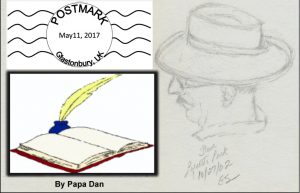
“Tell the story”
“Don’t let it be forgot”
— Arthur
…
Yet some men say
in many parts of England
that King Arthur is not dead.”
— Sir Thomas Mallory
(of Warwick?)
—————–——–Click here to download a PDF of this article: King_Arthur_for_2019_May26_2019
In dark times, we humans tend to seek assistance from some form of intervention — perhaps a knight on a horse — to save us from dangers we can’t overcome on our own. History is full of examples; and my personal favorite example is the legend of King Arthur. At its core, the Arthurian legend promises that British greatness is secure as long as its royal heritage endures. Several ancient sources contain the prophecy that the ‘Rightful King’ would reveal himself by pulling an enchanted sword from a stone. In those stories, the sword, a sword named Excalibur, had been embedded in that stone under a spell that awaited a person with enough moral courage and wisdom (and, of course, physical strength) to remove the sword and save his people at a time of great danger. In our most enduring source of Arthurian legend, Le Morte d’Artur (1485), Sir Thomas Mallory tells us that the prophecy said: “Whoso pulleth out this sword of this stone, is rightwise king born of all England.” When that ‘Rightful King’ shows up to remove the sword, they were assured that he would lead his people to victory and guarantee their long-term stability. Arthur arrived on the scene to fulfill that prophecy in the sixth century. Presumably, all of Britain’s history follows from that moment. For centuries, many storytellers have taken up the legend — recently Alfred Tennyson in Idylls of the King (in the 1860s), T.H. White in his popular book The Once and Future King (1958), and, of course, the Broadway musical Camelot by Lerner and Loewe (1960). You’ve heard the story, right?
Most of the stories come to us from the 12th thru 15th centuries, with tales of chivalry, Knights of the Round Table, and a famous Camelot love triangle involving Arthur, Guinevere, and Lancelet; but the real, historical Arthur — and there actually was one — arrived on the scene to remove the sword and save his comrades at the Battle of Camlann in 560 AD. In that battle, Arthur, with the help of the sword, Excalibur, killed their enemy, Mordred, to achieve victory. Unfortunately, accounts from that time record that Arthur was mortally wounded in that battle and was taken by the sorcerer Merlin to the Isle of Avalon to die. Historically, most believe that he was buried in the churchyard at Glastonbury Abbey (below).

BUT Arthur’s story doesn’t end there. Mallory continues: “Yet some men say in many parts of England that King Arthur is not dead, but he was taken by the will of our Lord Jesus into another place; and men say that he shall come again, and he shall win the holy cross.” The legend provides further reassurance — we are told with the particular certainty of such powerful legends, that Arthur still waits at the Isle of Avalon (now known as Glastonbury Tor) for the day when his particular combination of greatness, goodness, and magic will be needed to save Britain again from great danger. Now, partial disclosure, I have visited Glastonbury Tor here in the 21st century in October of 2003. I have walked its full extent (I have pictures, below), and I must report to you that I did not see him there. But, the legend has endured long enough and forcefully enough to suggest that I must have missed him. I can tell you from my observation, there’s magic afoot on that hillside; so, we can be confident.
 Glastonbury Tor, 2003
Glastonbury Tor, 2003
So, the legend endures. (And it’s a good story, no?)
Over the centuries since that day, Britain has survived a long list of well-documented threats;
—> —> BUT today, the time for his return has clearly arrived.
Without Arthur’s intervention, Britain may be approaching a defining ‘point-of-no-return’ if it goes through with The Brexit, its planned separation from the rest of Europe, which will precipitate disastrous results for the British economy and the stability of Europe and the West. The entire arc of history enfolding from the 6th century to the 21st has been a constant struggle to unify and stabilize Europe under strong values and alliances. That struggle has continued through an alternating series of triumphs and setbacks over sixteen centuries. We’ve seen: destructive wars, expansions of a vast British empire, contractions back to a single small country, demonstrably less worthy kings, tasteless food, a few embarrassing prime ministers (that is, most of them since Churchill), and one worthless one (the current one). Arguably, the establishment of the European Union in 1993 was the greatest single step in the progress toward Arthur’s Round Table, as told to us by a succession of storytellers to our present day. The decision is now in the hands of the current British Parliament and the Prime Minister. If this Brexit decision goes the “wrong” way, and Britain shrinks from the responsibilities of its destiny, neither Britain nor the European Union are likely to recover from such a setback. The British people will need all of the wisdom and courage that Arthur, the “Once and Future King,” can provide to step back from the Brexit cliff.
So, the time has come, Arthur, to return and fulfill your destiny. The world still waits. I’m sure you are ready and waiting somewhere on that hill in Glastonbury. Time is running out.
Or, … maybe there is another way to think about this …
According to one version of the story, on the eve of battle, Arthur gave a gift to the future
(i.e., us). He was mindful that the battle was not certain to go well, that he might not survive, and his Round Table could die with him. As he brooded over that bleak future, he was startled by a young boy who had come to fight in the battle. The boy told Arthur that he wanted to fight in the battle to preserve the values of the Round Table. The dejected King, feeling that his life’s work was about to come to nothing, was skeptical, and asked the boy how he could possibly know about the Round Table. The boy told him, “from stories people tell — stories about might for right, right for right, justice for all, a round table where all the knights would sit.”
Arthur was encouraged by what he heard and, using Excalibur, he knighted the boy, Sir Tom of Warwick, and gave him these direct orders:
“You will not fight in the battle, you will run behind the lines and hide until the battle is over; you will return home to Warwick — ALIVE! You will grow up and grow old. For as long as you live, will you remember what I, your King, tell you and will you do as I command?”
“Yes, my Lord.”
Arthur then commanded him to tell the story, strong and clear, of the values of the kingdom he had hoped to create. “Don’t let it be forgot,” he said. (Click on the link to hear Arthur tell the story himself.) As the newly knighted Sir Tom of Warwick left to fulfill his orders, Arthur’s optimism is revived that “We will be remembered” and THAT would be his victory.
So, perhaps as the Brexit decision unfolds over the next few weeks, the story must be told, “strong and clear,” again and again, that Britain has an important role to play in the future of Europe and in preserving the values for which Britain, and Arthur’s Round Table, were founded. Maybe the telling of the story can tip the balance, even if Arthur himself does not emerge from Glastonbury Tor with his sword to save Britain from itself. Maybe the telling of the story is all that is needed. Maybe that is the lesson we must take from the legend:
à if the guys with swords let us down, let’s put our faith in the storytellers. Maybe the storytellers can influence the outcome, even today.
… … An afterthought — if Arthur can save Britain from itself, so you think he can jump across the pond and save US from … well … oh, nevermind.![]()
Beautiful Words — A Challenge
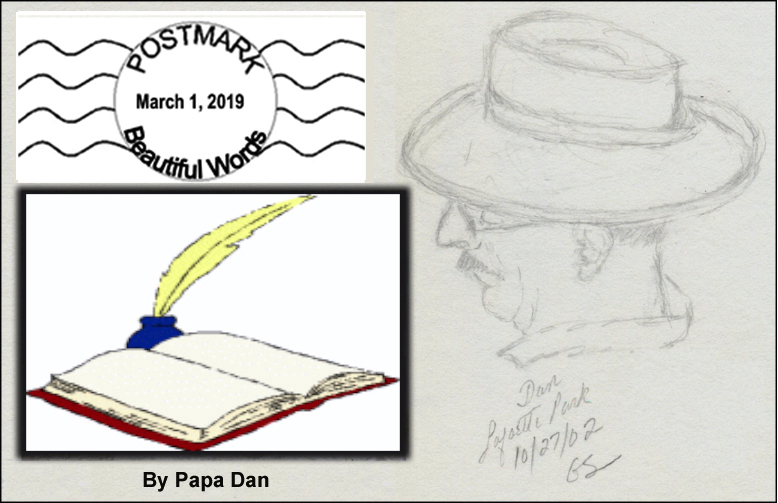
“To a first approximation,
words mean what they say.
…
AND how they make you feel.”
Click here to download a PDF of this story:
= = = = = = = = = = = = = = = = = = = = = = = = = = = = = = = = = = = = = = = = = =
Recently,
a ‘by-line’ in the San Francisco Chronicle got my attention. What caught my eye was not the title, but the
author’s name — Nick Hoppe. Frankly, I
had not heard of “Nick” Hoppe, but his last name, “Hoppe,” is a name that had
been important to me for half a century.
Art Hoppe, who turns out to be
Nick’s dad, was a columnist at the Chronicle from 1960 until his death in
2000. The column was called “Our Man
Hoppe” and later “The Innocent Bystander,” at its peak syndicated by over 100
newspapers nationwide. His satirical
column covered local and national politics and included essays, feature columns,
and one-act scenes with an ongoing cast of characters like Private Oliver Drab,
Joe Sikspak, Homer T. Pettibone, and others.
Art Hoppe was my hero. I read his five-day-a-week column starting in the 7th grade and, when I determined that I wanted to be a writer, he was my inspiration. Much of what I have done on convivio-online.net is inspired by him. One in particular is a one-act play I posted on ConVivio in 2011 in which I recreated two characters he featured often over the years — Gabriel and The Landlord — my version is called “Some Explaining To Do” (click here if you’d like to read it).
–> –> –>–> But I digress … all of that explains what attracted me to Nick Hoppe’s column earlier this month called, “Words That Just Feel Good On the Tongue.” His goals were to identify ten words that, according to him, were the ten most beautiful words in the English language and explain why they were beautiful TO HIM. I thought that was an intriguing idea. When I read his column (and his list), I decided that many of his choices were NOT among those I would choose (e.g., his #1 choice was “knucklehead”). BUT, I quickly realized that was his point: that I should identify words that I thought were beautiful and defend what made them important TO ME.
So, I Made a List
I
tried to create a list and a brief defense of each word’s presence on my
list. I decided a word earned the right
to be included with a combination of the sound of the word and its meaning —
the composite of how that word makes me feel.
It was sorta fun, but as with most lists of “favorites,” the challenge
is to decide what must be excluded. Turns
out, I just plain failed to limit my list to ten, as Nick Hoppe had done (so,
sue me). Below is the result:
A. My list of the top-ten most beautiful words in American English (according
to me)
B. My list of the second-ten most beautiful words in American English
C. A list of beautiful words I’ve stumbled across in other languages that SHOULD
be in American English, but we don’t seem to have an equivalent word.
Observation: few one-syllable words made the list. Following the Italian pattern, d’yathink words with multiple pronounced vowels sound more melodious, and generate stronger feelings?
A CHALLENGE —> Since you will inevitably disagree with some of my choices, (I can hear you now: “How could you possibly include THAT word?”), I INVITE YOU to make our own list(s) and defend your choices. If you send me a list (or even just suggest a word or two), I will publish them here, if you like (with or without your name, as you choose).
My Top Ten Most Beautiful Words in American English, and why they are beautiful (listed here alphabetically)
1. Becoming — this word (the title of Michelle Obama’s wonderful book) sets aside the notion that we must end up somewhere “final” in this life. It suggests that we can always be more.
2. Grace — I admire this word with its three meanings: for many, a spiritual condition (“a state of grace”) received as an unearned divine gift; it is also a description of the physical elegance of artistic movement (as in a graceful dancer); but also, as a verb, to confer dignity or honor to a place or event. (“I do not understand the mystery of grace only that it meets us where we are but does not leave us where it found us.” — Anne Lamott )
3. Love — the starting point and sustenance of everything good; either with a specific target or a broad, generalized intent toward all of life. It comes to us free and is re-distributed free.
4. Kindness — the quality of being friendly, generous, considerate, without expecting a reward.
5. Serendipity — occurrence of happy or beneficial events apparently by chance (“Hitting the center of a target you didn’t know you were aiming at.” — Bujold
6. Simplicity — uncomplicated, easy to understand effortlessly, uncluttered.
“Everything should he made as simple as possible, but not simpler.” — Einstein
“Simplicity, simplicity, simplicity.” — H.D Thoreau (essential ingredient of a good life)
7. Storytelling –>–> One of my favorite words.
“Storytelling reveals meaning without committing the error of defining it.” — Hannah Arendt
“Stories are the common currency of humanity” — Tahir Shah (Arabian Nights)
“The human species thinks in metaphors and learns through stories.” — Mary Bateson
“Reality can be beaten with enough imagination.” — Mark Twain
8. Welcome — an invitation bestowed on another person that says: “You belong here. Come in.”
9. Wonderful — inspiring delight, worthy of admiration, stimulating imagination (i.e., wonder)
10. Yosemite (Yohhe’meti) — name of the tribe that occupied what is now the Yosemite Valley, named by the surrounding, more peaceful Miwok tribes (literal translation: “Those who kill”).
That tribe called themselves the Ahwahneechee and named “their” valley “Ahwahnee.” The Miwok translation for “Ahwahnee” meant simply “people. Archaeological evidence of the Ahwahnechee and the name date back about 800 years. Early recorded contact with European settlers was about 1850 during the Gold Rush. The name “Yosemite” stuck after being named that by 18th-century European settlers. –> –>My love of this word does not stem from its troubled linguistic history but from our own experience with this beautiful, inspiring valley over our lifetime AND the inspiring sound of the word.
My Second Ten Most Beautiful Words in American English
11. Eloquence — fluent or persuasive speaking or writing. à And I enjoy the sound of this word.
“You must speak straight so that your words may go as sunlight straight into our hearts.” — Cochise
“Eloquence is painted thought.” — Blaise Pascal
12. Ephemeral — lasting for a short time, fleeting. “She liked the way the word sounded in her head. ‘I am ephemeral.’ It made her feel like something passing and precious.” — Pamela Todd
13. Exhilaration — synonyms: elation, euphoria, joy, ecstasy, exultation, rhapsody.
“Exhilaration is that feeling you get just after a great idea hits you and just before you realize what’s wrong with it.“ — Rex Harrison. “We can take some gratification at having come so far in just a few thousand years as language users but it should be a deeper exhilaration to recognize that we have such a distance to go.” – Lewis Thomas
14. Felicity — joy, delight, cheerfulness, ability to express one’s thoughts effectively.
“To strive with difficulties and to conquer them is the highest human felicity.” Samuel Johnson
“There is more felicity on the far side of baldness than young men can possible imagine.” — LP Smith
15. Forbearance — patient self-control, restraint, tolerance.
“Common man’s patience will bring him more happiness than common man’s power.” Amit Kalantri
“Leadership was not an act of bravery but rather forbearance and the strength to move forward with humility in the belief of what is right.” Sortoosh Shahrivar
16. Mellifluous — voice or words sweet or musical, pleasant to hear. “In my dreams, I heard your mellifluous voice. It slowly woke me up from a deep sleep so that I could enjoy the magnificence of life.” — Debasish Mridha
17. Propinquity — proximity à I just like the sound of it better than mere “proximity.”
“Keep characters in propinquity long enough and a story will always develop a plot.” — Keith Miller
18. Quintessential — classic, representing the most perfect example of a quality.
“A quintessential experience is to hike up the John Muir Trail behind the Mist Trail to the top of Vernal Falls and trudge through the snow to the rock from which you can look down at Vernal and up at Nevada Falls — and, if you are not eaten by bears in the dark on the way down, to have a glass of Rombauer Chardonnay in the Ahwahnee dining room with a plate of scallops.” — PapDan
19. Resplendent — attractive and impressive through being richly colorful or sumptuous.
20. Succulent — OK so I just like the Hemingway quote à“As I ate the oysters with their strong taste of the sea and their faint metallic taste that the cold white wine washed away leaving only the sea taste and the succulent texture, and as I drank their cold liquid from each shell and washed it down with the crisp taste of the wine, I lost the empty feeling and began to be happy and to make plans.” — Ernest Hemingway
Ten Words with no English Equivalents, that the English Language Needs
–> –> Some emphasis here on the sound of these words, as well as their meaning.
1. Flaneur (French) — a person at leisure, deliberately aimless, wandering streets, soaking in a city, a neighborhood, or, heck, a forest.
2. Magari (Italian) — “If only”; use this for beautiful experiences that you wish for, longingly.
3. Metanoia (Greek) — the journey of changing one’s mind, heart, self, or way of life.
4. Mudita (Sanskrit) — taking delight in the happiness of others.
5. Namaste (Sanskrit) — traditional Hindi greeting or gesture of respect, (“I bow to the divine in you”) by holding the palms together before the face or chest and bowing. The gesture is called a “Namaskar”; the word used is “Namaste.” àà Gretta contributed this one to the list.
6. Passeggiata (Italian) — a slow, late afternoon or evening stroll, (perhaps associated with gelato). This is a close relative of the French word “Flaneurie,” which is what a Flaneur does.
7. Rocambolesco (Italian) — a person who is daring, adventurous, and incredible — or an experience that can be described with one of those adjectives.
8. Sprezzatura (Italian) — to do something flawlessly, effortlessly, splendidly.
9. Tickety-boo (British) — Something satisfactory and in good order (but not extraordinary); sometimes shortened to “twee.” Some believe it derives from Hindi “ṭhīk hai, bābū,” meaning “it’s alright, sir” — and is therefore a linguistic theft.
10. Tsundoku (Japanese) — the act of buying books, keeping them, and not reading them
Afterthoughts — A few of you sent in your own lists of carefully-selected words as comments on ConVivio. I have taken three of those lists from “Comments” and added them below — they are from
1. Our own famous “Hat Lady”
2. Our guest poet Lauren de Vore
3. Overall wise-word-man Stephen Faletti.
I think you will enjoy their contributions.
Nick Hoppe’s recent column (with his top-ten list) can be found here: https://www.sfchronicle.com/entertainment/article/Words-that-just-feel-good-on-the-tongue-13607480.php?cmpid=gsa-sfgate-result
If you’re interested in knowing more about my earliest writing hero, Art Hoppe, his obituary in the Chronicle from February 3, 2000, paints a good picture. It can be found here: https://www.sfgate.com/news/article/Chronicle-Columnist-Art-Hoppe-Dies-Eloquent-3240505.php
“The Hat Lady‘s” Lists of Favorite Words
Our famous “Hat Lady” offered two lists and a bit of a “defense” for including each word — in some cases identifying a word that needs to be used more often in our public discourse and placing that word within her own personal philosophy. Shortly after her 90th birthday, she says: “I just have one defense of my lists. The words are good. They lend variety to expression, a precision, or shading. These are all things that the English language does well.”
My First List
- Story — Narrative, true or fictitious, designed to interest or muse the hearer of the reader. Everyone has a story to tell, if only one would stop to listen or read.
- Equanimity — Easiness of mind or temper; calmness, composure. Disturbing one’s equanimity these days is easily done. One must reach for it again and again.
- Façade — Face or front of a structure; an outward appearance maintained to conceal a less pleasant disposition. It’s always rewarding to present a sunny demeanor.
- Embrace — to take on or receive an idea gladly; to avail oneself of opportunity; to include. To embrace the concept of respect for all does not appear to be publicly appealing at this time.
- Consequential — the nature of consequence following an effort or result. Consequential implications of one’s actions are mostly ignored these days. What a shame!
- Accommodate — to do a kindness of a favor for friends, family, or even a stranger. How could one not accommodate someone in need, whatever the need might be.
- Meander — to proceed by a winding course; to wander aimlessly. It does one good to meander through fields in Spring. It is also good to let thoughts meander once in a while.
- Curmudgeon — irascible; churlish; sometimes lovable. A little patience with this recently elder person can be fun.
- Thanksgiving (Day) — The act of giving thanks on a special day. There is much joy in assembling loved ones and making preparations for a festive day of thanks.
- Affirm — to state positively as true; assuring that one’s belief and/or loyalty can be accepted without doubt.
My Second List
- Ingenious — showing cleverness; inventiveness; free from reserve; frankly candid.
- Conundrum — Anything which puzzles; not easily resolved. The world itself is a puzzle. Its origin is not known.
- Sublime — Inspiring the mind with some sense of grandness; awe-inspiring.
- Limpid — transparent; crystal clear.
- Insight — a penetrating mental view; sudden grappling with a solution.
- Probity — integrity; up-rightness; honesty.
- Optimist — a person given to looking on the bright side; a belief in goodness.
- Gingerly — with caution or extreme care; mincingly; daintily.
- Imbroglio — a perplexing situation; complicated or difficult to resolve; a laughable mix-up (it’s Italian).
- Fragrance — having a pleasant odor, as in the fragrance of Spring; ripening fruit; homemade bread.
Lauren de Vore’s Words that “roll off the tongue and into the ear most pleasantly.”
On February 28, 2019, Lauren wrote: “These are not necessarily my “favorite” words; those words have all sorts of connotations and associations, making it difficult to judge them solely on the basis of their sound. The ten words offered below (in no particular order) are those that, to my mind, roll off the tongue and into the ear most pleasantly.”
- Amble: slow and easy, it moseys through the mouth and out into the world.
- Cherish: there’s something precious and precise about “cherish”; doesn’t hurt that there’s a rather nice song with this title.
- Bell: the initial “b” is the clapper that strikes the lips and opens up the mouth for a big, round, resonant “ell.”
- Eiderdown: just sigh into the word and feel it settle softly over you.
- Nosh: voiced directly behind the nose, nosh is a silly word but so much more satisfying than snack.
- Tourmaline: sparkles like crystalline but with more color and depth, just like the gem.
- Dreamy: flows with great mouthfeel, just like soft-serve ice cream but without the calories.
- Palisade: never mind the meaning, I just like the way it glides (glissades?) off the tongue.
- Velvet: I love the way the word sounds the way velvet feels, especially when you savor the “ell.”
- Golden: so rich and warm, if a sound could glow …
Stephen Faletti’s Words
On March 6, 2019, Stephen offered this list:
- AAUGH! — an exclamation used when characters in the Peanuts comic strip scream. When yelled, the characters are typically facing up with their mouths almost as big as their faces.
- AAARRRGGGHHH!!! — a longer exclamation related to AAUGH!
- Asymptote — a straight line such that the distance between some curve and the line approaches zero as the x or y coordinate tends to infinity (in analytic geometry). So the curve continually approaches but never quite touches the line (meets without touching). From the Greek root asymptotos meaning “not falling together.” See the classic curve y=1/x. For extra credit, see the hyperbola x^2-y^2=1.
- Spectacular — beautiful in a dramatic and eye-catching way. Use with the special intonation made famous by Huell Howser in the PBS television series “California’s Gold,” as in spec-TAC-ular. Try it out loud.
- Disgruntled — angry, dissatisfied, or discontented. You can hear the grumbling when you say the word. From an old verb gruntle meaning “to utter little grunts,” with the prefix “dis” used as an amplifier not an opposite (no one is ever gruntled).
- Homoscedasticity — same variance (in statistics). The situation in linear regression analysis where the variance (random noise) around the regression line is the same for all values of the variable x. So the data points in the scatter diagram are all roughly the same distance from the regression line. But who cares? Just enjoy pronouncing this 7-syllable word.
- Heteroscedasticity — different variance (complement to homoscedasticity). An 8-syllable word that has a delightful sing-song intonation.
- Old-School — characteristic or evocative of an earlier or original style, manner, or form. Use with appreciation or reverence, not as a pejorative.
- Emphatic — expressing something forcibly and clearly; showing or giving emphasis. This word sounds like its definition.
- Tort Litigation — I’m breaking the rules of the exercise here by using a phrase instead of a word. But you might enjoy the effect of saying these two words emphatically, out loud, and together as if they comprised a single word. Try it.
My 10 Words – Lewis Bell
Understanding – This is a big one, because it seems that when people reach a point of great authority they lose the ability to understand anything other than their own ego driven desires. The world is full of misunderstanding now. I don’t know if it is more or less than usual, but I only live in what is now. All of it is hard to understand but every day I try to understand and do the right thing.
Satisfaction – My father once told me that, “A satisfied man is a happy man.” He didn’t tell me much because he died when I was 13, but those words have always stuck with me. I agree with him. All you need is all you need. You don’t have to have it all, just what it takes.
Delight – Those perfectly timed moments that bring glee, relish, excitement, thrill, happiness. Babies, puppies and kittens are especially good at it. It keeps you young❣️
Compassion – Caring for your fellow man and setting the good example for those that follow you to do the right thing. Success does not always mean getting. Giving can bring greater wealth. When it is your turn, do not look the other way
Devotion – Belonging to and having someone belong to you builds amazing foundations and creates a steadfastness that can and will last for an eternity.
Laughter – This one tops the list – “Love, Live Laugh” is plastered all over my being. “If you can’t laugh about it, it is not worth doing.” Don’t know who said that, but Milton Berle said, “Laughter is an instant vacation.”
Faith – Not so much in a deity or an organized religion, but more so faith in myself – knowing that I can get the job done, knowing that I have what it takes, an inner strength, a positive sense of being.
Creativity – I thrive on creativity. Most recently I have discovered hidden talent is graphic arts and in music. Making something from nothing but yourself is so powerfully rewarding.
Awareness – Always being acutely aware of where I am and what is going on around me – not because of being afraid, but of being fearful that I will miss out on something in this amazing world in which we live. I can’t tell you how many times I have asked someone, “Did you see that?” And they answer, “No.” And I think, “Your loss!” It doesn’t cost anything to pay attention.
Individualism – I’ve always strived to be self-motivated, self-supporting, and not afraid of being different. I am my own person. I have those that I love and those that I follow, but I am not into group pressures. I like to make up my own mind.

Show likes.
Meditations On Walls
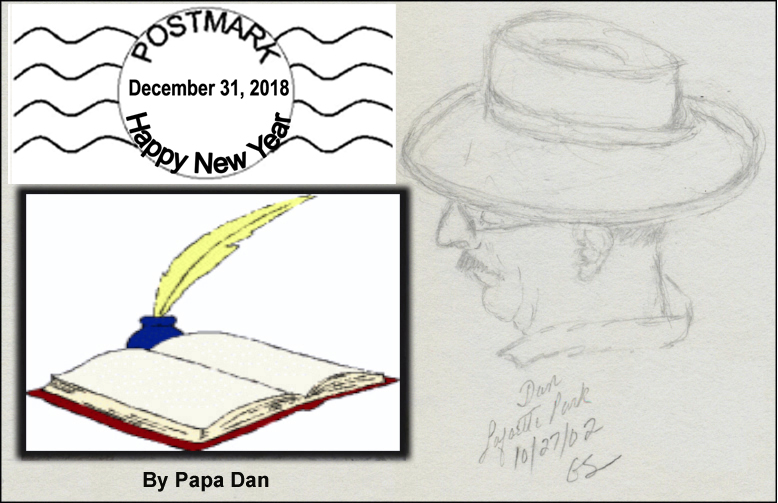
“Those who fail to learn from history;
are condemned to repeat it.”
— Winston Churchill (and others)
=============================================================
There have been many instances in human history when those in authority attempted to build large-scale walls, either to keep “dangerous” people out or to keep oppressed people in. A quick look at the history of such walls might serve as a guide to those considering the merits of walls in the today’s world. First, a general comment from Robert Frost — one of America’s foremost poets and observers of human behaviors and outcomes.

Next, let’s take a look at some famous “Walls We Have Known,” and see if there’s anything we might learn from them.
Walls We Have Known — History teaches that things generally haven’t gone well for wall builders
There are some common outcomes in the history of relying on large-scale walls for survival. Here are some famous examples:
• The Great Wall of China took centuries to build, kept a few nomadic invaders out at several locations, but didn’t prevent the large-scale invasions that actually changed the history of the region. It was 13,000 miles long, counting actual walls, trenches, hills, and rivers, and served as good lookout points. In the end, it was a moderate deterrent but not an impenetrable fortress that was intended. The famous large-sale Manchu invasion was successful because a Ming General decided to switch sides and let an army in.
• According to the story in the Old Testament, the Israelites defeated The Wall of Jericho by assembling an army of blowhards (they blew their trumpets and shouted). Prior to that failure, the natural hills surrounding Jericho were more effective. If the story is accurate, it doesn’t speak well for the effectiveness of walls. If the story is an allegory, perhaps that was the intended message.
• The Sumerians’ built their “Amorite Wall” during the 21st-century BCE to keep out the Amorites. It stretched over 100 miles between the Tigris and Euphrates Rivers in what is now Iraq. It succeeded for a few years, but after a single generation, the Amorites and Elamites defeated the wall by breaking through it in places or simply walking around it. As a result, while relying on the wall for survival, the city of Ur was destroyed around 2000 BCE and the Sumerian culture vanished from history
• Athens, one of the most powerful cities in ancient Greece, built a series of 100-mile-long barriers, known as “The Long Walls of Athens,” to create a siege-proof supply-line to the harbors of Piraeus and Phalerum around 461 BCE. It worked for a while during the Peloponesian War with Sparta, until their Navy was defeated and the Spartans dismantled it. In hindsight, it was the Athenian navy that protected the wall, rather than the other way ‘round. The wall was rebuilt and the Romans destroyed it again in 86 BCE. Turns out that the attackers of these walls thrived much better than either of the civilizations that built them.
• Around 122 A.D., Emperor Hadrian ordered a stone wall to protect Roman Britain from the “barbarians” of northern England and Scotland. Hadrian’s Wall was 10 feet wide, 15 feet tall, and featured a series of ditches and gates a mile apart. It enabled the flow of personnel and the collection of taxes, but ended up being mostly a symbol of Roman power, until Rome left the scene. After the departure of Rome, the “barbarians” from the north successfully overcame and dominated Britain anyway. The Wall, then, became more of a symbol of failure. Turns out that symbols can be dangerous.
• The Byzantine city of Constantinople (modern Istanbul) flourished for over a millennium thanks in part to its 14 miles of walls. The most famous, the Theodosian Walls, included a moat, a 27-foot outer wall, and a 40-foot-tall inner wall that was 15 feet thick. Troops on the ramparts rained arrows and a type of napalm called “Greek fire” on any enemy. The walls turned back attackers from the Arabs to Attila the Hun, but they were finally defeated in 1453, when the Ottoman Empire besieged the city with a new weapon—the cannon. After blasting holes in the walls, the smarter Turks poured through and captured the city, toppling the Byzantine Empire.
• The Berlin Wall, modern history’s most infamous wall, was erected to separate East and West Berlin in 1961. Communist leaders claimed the barriers were designed to keep out fascists and other enemies, but their real function was to prevent East Germans from defecting to the West. More than 100 people were killed while trying to escape through the maze of 12-foot walls, guard towers, and electrified fences. Thousands more defeated the wall, tunneling underneath it, and flying over it in ultra-light aircraft and hot air balloons. The “Wall of Shame” stood for 28 years before it was opened on November 9, 1989. Berliners celebrated, and demolished the wall with jackhammers and chisels. East and West Germany were finally reunified less than a year later in October 1990. The Wall became an international motivator for those who wanted to restore freedom. As a result, both East Germany and The Soviet Union have ceased to exist.
As you can see, in the long run, things typically don’t go well for wall builders and their people.
Humans have been persistent and clever in finding ways to overcome walls:
• Using common sense — that is by walking around them, digging beneath them, flying over them, or finding like-minded people on the other side to help them.
• Using technology — inventing canons, finding clever ways to pass under or through walls, crafting homemade devices to pass over walls, or using the wall-builders’ own devices and plans to defeat the intent of walls.
A Popular Definition Applies
Albert Einstein is generally credited for saying
this, but many wise people (i.e., non-wall-builders) have figured it out:
• “The definition of insanity is doing
the same things over and over again, but expecting different results.”
What Can Be Learned?
Winston Churchill (1948), quoted George Santayana (1905) when he said, “Those who fail to learn from history are condemned to repeat it.” So, those who might consider building a wall to preserve something that is important to them — either to keep something out or keep something in — might consider that building walls has a very poor track record in those efforts. History doesn’t look favorably on leaders who convince their people that walls were a good idea. Most didn’t survive to tell their story.
Perhaps there is another way …

Two Guys Speak To Us About Optimism (and other stuff)
<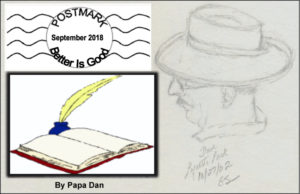
“What can I do to make things better,
not only for myself, but other people?”
— Herbie Hancock
September 3, 2018
“Better is good.”
— Barack Obama
September 7, 2018
84-ConVivio_Hancock_Obama_speak
Herbie Hancock & Barack Obama
Let’s start with Herbie. Jazz enthusiasts of a certain age got to know about Herbie Hancock as a member of the Miles Davis Quintet in the 1960s. Since that time, he has played his piano with a distinguished list of collaborators with energy, enthusiasm, and inspiration. After winning twenty-some Grammy Awards, he is now at an age (78) when performers of “his time” have announced their retirement. BUT, it appears that “his time” still includes the present and the future — he just announced a new album and set of tour dates through 2019 (including one here in the Bay Area). OK, that’s the musical story. But in an interview with Aidin Vaziri of the San Francisco Chronicle on September 3, 2018 (read the complete interview), he had other stuff to say that extended beyond the music. With President Obama’s inspiring speech at the University of Illinois Urbana-Champaign still ringing in my ears from last week (September 7), Mr. Hancock’s answer to one of Mr. Vaziri’s questions got my attention. The question was about “optimism.”
Aidin Vaziri’s Question:
“Given the current climate of the country, are you able to remain optimistic for the future?”
Herbie Hancock’s Answer:
“Yes, because I can see past that part of it. What is happening now and showing its ugly head is not about just one person — namely the president — but with a lot of people that have fears. Fears breed anger. How that expresses itself in many cases is what we haven’t built into our human society, which is the ability to avoid looking for a scapegoat for our sufferings. There’s a tendency for human beings to always point at something outside of themselves. In many cases, there are things outside of yourself that are part of that equation. But it’s more important to take a broader view and realize that if something is happening to me and not other people, what can I do to make things better?”
“In Buddhism, we call that living a life of cause, not a life of effect. It’s easy to point fingers. It’s not easy to see how one is contributing to our own suffering. I think so much of that has been hidden under the rugs anyway. If you really want to clean house, you have to pull the rug back to see it.”
“Well, we’ve had the rug pulled back and now we can see it. What we have to do is not let it become a virus that spreads. We have to pour our compassion and understanding into that and use the best of our humanity to show there’s a better way to find a better life. It’s not the immigrants’ fault. It’s not the Jews’ fault. Or black people’s fault. Or Muslims’ fault. Or the Mexicans’ fault. Or whoever you may be blaming at the time.”
“You have to look first within yourself and think, ‘What can I do to make things better not only for myself, but other people?’ ”
Barack Obama & Herbie Hancock
From PapaDan:
On September 7, Former President Obama gave a formal address at the University of Illinois Urbana-Champaign (Read the complete transcript here.). The occasion was his acceptance of an Ethics in Government award. The audience included students and their families, faculty, and a national television audience. It was a preview of the messages he plans to deliver to the nation during the coming election campaign. He began: “Some of you think I am exaggerating when I say that this election is more important than any in our lifetime. Just a glance at the recent headlines should tell you that this moment is really different … the consequences of any of us sitting on the sidelines are dire.”
Observers described his speech as a “call to arms” to Democrats, especially of the younger generation, to do something they haven’t done in sufficient numbers: –> VOTE. But, I suggest that it was more than that. Still, the most widely reported themes from his speech focused on the dangers to our Democracy —trends in politics and government that threaten the values America has promoted around the world, the behavior of Republicans that have deviated from long-standing Republican values — like their historic opposition to communist tyrants, anti-deficit fiscal conservatism, and preservation of American institutions. “What changed?” he asked. To answer that question, he reminded the audience that only one in five members of the younger generation voted in 2016, and asked, “if you don’t vote, is it any wonder this Congress doesn’t reflect your values and your priorities?” Does it matter? He answered this question by reminding us that, when he was elected, he won some precincts by 5, 10, 20 votes — not percent, votes! Also widely reported was a host of specific criticisms of the Trump Administration and those who support it — on immigration, budget deficits, voting rights, gun violence, women’s rights, corruption ….
–> –> BUT, these are not the features of the speech that are ringing in my ears. The message in the speech that I hope everyone will take to heart, and the message that Herbie Hancock used to justify his optimism for the future of this country, is this — in Obama’s own words:
A key paragraph from Obama’s speech:
“Better is good. I used to have to tell my young staff this all the time in the white house. Better is good. That’s the history of progress in this country. Not perfect — better. The civil rights act didn’t end racism, but it made things better. Social security didn’t eliminate all poverty for seniors, but it made things better for millions of people. Do not let people tell you the fight’s not worth it because you won’t get everything that you want. The idea that, well, you know, there’s racism in America, so I’m not going to bother voting, no point, that makes no sense. You can make it better. Better is always worth fighting for. That’s how our founders expected this system of self-government to work. Through the testing of ideas and the application of reason and evidence and proof, we could sort through our differences, and nobody would get exactly what they wanted, but it would be possible to find a basis for common ground. And that common ground exists.”
“Better is good.”
The Path to “Better” — Observations from PapaDan
Even the important things we consider “better” are usually achieved in multiple steps, not in large, dramatic policy initiatives intended to change the world in one stroke. Changes in the behavior of our government, for example, would require multiple steps to address deficiencies in all three branches of government. That, in practical terms, would require multiple election cycles at all levels of society — starting with local governance upward to the national. It would also suggest significant educational efforts to restore attitudes and values across the generations — values regarding topics like immigration, race, public education, economic security, healthcare, and individual rights. History tells us that these values have been evolving in a fairly singular directional, albeit with alternating periods of back-sliding and recovery, within our social fabric over the past seven decades.
This past week, both the former president and the award-winning musician affirmed three essential messages (there are always three). 1) Progress comes as a result of building on “Better,” not giving up when we are likely to fall short of “Perfect.” 2) They also reaffirmed that a path to “better” must begin with the way we treat each other right now and right here, in our own neighborhoods and in our own families. Finally, 3) Both Herbie Hancock and Barack Obama carried one message underlying their words: Make a Difference. They both described ways we can do that and powerful reasons why it matters. In the final analysis, many of us are not sure that WE can make a difference. If we listen to the wisdom of these two guys, we can come to a conclusion we’ve heard before: Can we make it better? “Yes, we can.”
Optimism isn’t easy.
It isn’t sufficient (neither optimism nor jazz).
But both are required.
Oh, yes, and … well … by the way … vote.
–> And listen to some Herbie. <–
![]()
La Belle Epoque: Just a Moment in Time
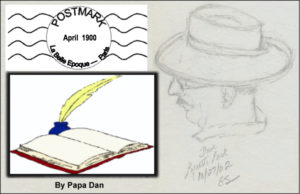
A time of optimism, regional peace, economic prosperity, the apex of social order, and technological, scientific, and cultural innovation.
I wonder what it felt like to be there, then? La_Belle_Epoque_ConVivio_Aug30_2018
On a slow-moving Tuesday afternoon in Carmel, California, Liam found himself wandering along Ocean Avenue staring into the front windows of the dozens of art galleries that brightened this otherwise foggy neighborhood. What was he doing there? The factual answer was that the company he worked for had sent its senior staff for a week-long conference by the sea to re-think some of its marketing strategies. Apparently, a secondary plan was to force the group together in an unfamiliar setting to promote some personal team building. The boss wasn’t satisfied with the way the group was functioning together and he figured that a week by the ocean in a relaxed setting with some good food and wine might loosen them up a bit. The schedule called for an agenda that sat them down in a conference room over breakfast and lunch to go through a list of issues. They had the rest of the day off. The hope was that they might spend the afternoons getting to know each other.
It didn’t sound like a bad plan, but the underlying reason the group didn’t function well together was that, at every opportunity, their conversations descended into their strong and differing opinions about the national news and politics of the day. For this little company, like so many others with an international clientele, these factors had a negative effect on their business. As a result, they had developed an unhealthy dislike for one another. So, Liam found a way to escape and wander downtown to get away from the … uh … “heat.”
Turning the corner onto Dolores Avenue, Liam found himself staring at a group of paintings in the window of one of the many neighborhood galleries. Two particular paintings had captured his attention the day before; so he returned to take a closer look. Each one was a street scene in the rain. People carrying umbrellas wound their way among horse-drawn carriages under street lamps lit early in the afternoon because of the drizzly darkness. Another painting featured a similar rain-soaked street, only the traffic consisted of turn-of-the-century automobiles. He was struck by how well the impressionist had rendered the effect of the rain on everything in the scene using oil on canvas. He found himself trying to imagine what it would have been like to walk that street at the turn of the twentieth century. A few moments later he found himself inside looking at a room full of similar images by the same artist. As a man approached him from a room in the back, Liam caught his eye and asked, “I’d love to know how he does that?”
“Sir?”
“The rain. How does he do it? I feel like I’m walking on that street and the rain is all around me. I can hear it sloshing in the street. I can almost feel the water.”
“You are very kind. I have been trying to master ‘water’ for years. I think I’ve finally gotten the hang of it. Paris around the turn of the twentieth century is my favorite time and place and she seems to look her best in the rain, don’t you think?”
“Oh, MY. YOU are the artist? An honor to meet you.” He offers his hand. “My name is Liam.”
“The pleasure is mine. My name is Edouard Cortes. [Shakes his hand.] And, yes, these are my work. If I’m not mistaken, you were in here yesterday. I appreciate your comments. And your question about the water — it turns out you can’t really paint water. Either you try to imitate how it distorts things you see through it or you try to capture things reflected in it. Otherwise, water is pretty much invisible.”
“Oh, now that you mention it, I can see that. I hadn’t really appreciated that before. I guess I hadn’t noticed. I promise not to tell anyone your secret.”
“Oh, it’s not much of a secret; but I appreciate a person willing to keep some things to themselves. You’d be amazed the kinds of things people babble about when they come in here.”
“Well, I am in a business that tries to keep some of its ideas private, ideas of a proprietary nature, if you will, so it’s not new for me.”
With a grin, “And your business is …?”
A similar grin, “Uh … private.”
And a wider grin, “Of course.”
“Mr. Cortes, I don’t want to intrude on your time; but I’d love to know what has attracted you to Paris at the dawn of the twentieth century. What is special about that time and place?”
“I don’t mind at all. It is one of my favorite topics.”
La Belle Epoque
“La Belle Epoque, in English, “The Beautiful Era,” is recognized in Western history as the period from the end of the Franco-Prussian War in 1871 to the outbreak of World War I in 1914. It was a period identified by its optimism, regional peace, economic prosperity, the apex of social order, and technological, scientific, and cultural innovation throughout Europe and America. At its peak during the first decade of the Twentieth Century, the arts flourished, especially in Paris, where many masterpieces of literature, music, theater, and visual art gained recognition. I am quick to point out, however, that “La Belle Epoque” was named in retrospect, when held in sharp contrast to the forces that led to the horrors of World War I. Nobody thought of it that way during that golden age. For a pair of generations, it was merely ‘the way we are’ and it was unconsciously expected to continue indefinitely.”
Edouard pointed at two of his paintings, Café de la Paix and le Théatre — “I hope you can see those features in the faces of the people in my paintings and feel it as the rain washes the face and streets of Paris.”
[Click to view paintings by Edouard Cortes, esp. Café de la Paix, le Teatré, Saint Denis. https://www.google.com/search?q=paintings+by+edouard+cortes&tbm=isch&tbo=u&source=univ&sa=X&ved=2ahUKEwiIssSRlZXdAhVE54MKHXPDC7IQsAR6BAgDEAE&biw=1281&bih=919]
With some effort, Liam resisted the impulse to express his distaste for the current “epoque” here in the twenty-first century and compare it to the artist’s description of La Belle Epoque, not wanting to spoil the mood. Instead, “Sir, here I can see the feelings you have described in the faces of ladies walking across the intersection in their fashionable clothes, in the posture of people going about their business, and the dignified gentlemen walking toward us here. They are clearly living in a time and place that is quite unlike my own. My own visits to Paris did not do her justice, and I believe I am seeing Paris, here, in a way I have not seen her before.”
The artist did not look away from the painting as he went on, “Twilight has always seemed to me to be the best time for Paris to show her ‘Belle Visage’ during this time in her history, whether during the Winter snows of La Madeleine or the Spring rain on Des Champs Elysées.” The orange glow from the cafés and the moving splashes of sheen in the puddles of rain on the street are not fabrications, sir; and I hope you can see them.”
Liam examines them a while. “I cannot help but wonder, Mister Cortes, how an artist like yourself, living here and now, can capture Paris of La Belle Epoque, more than one hundred years ago, with such confidence. I must add it to the list of things I don’t understand. I guess I just have to accept it as a wonder.”
The artist paused a long moment to notice the emotion in the face of his guest and, tilting his head to one side as if to get a clearer view, seemed to make a decision about him. Finally, “Sir, I have been working on another, larger piece in my private studio,” pointing to a door at the back of the gallery. “I wonder if you might be interested in taking a look. Since it has some rather unusual features, of a proprietary nature, as you say, perhaps I could show it to you.”
A Work in Progress — More Than Meets the Eye
Cortes escorted Liam to the back wall of the gallery. With a jangle of keys, he unlocked a door nearly hidden behind some shelves, gestured for him to enter, and closed the door behind them. The dark room came to life when the artist flipped a wall switch that lit a pair of spotlights embedded in the ceiling. The two beams illuminated a single painting that dominated the room. It was about six feet high, half again as wide, supported by a solid wood frame propped against the wall. The artist struck a pose with a grand sweeping gesture presenting a street scene in the rain. “It’s not quite finished, but I think you can get the idea — La Belle Epoque: Paris in 1900 in the rain. I haven’t settled on a name for it, but it depicts Porte Saint Denis.
Liam couldn’t quite see what was ‘unfinished’ about it, and it gave him the distinct feeling that the water on the street in the foreground was likely to splash onto the studio floor.
The imagery reminded him of the impressionism he was so fond of from the early twentieth century, not at all typical of the contemporary works he had seen elsewhere in other galleries on this street from his own decade. The street was littered with papers, and shiny blobs of water reflected the puddles the rain had deposited on the uneven streets. Horses pulled wagons — from tiny one-person carts to larger one-horse coaches to heavy four-horse cargo wagons. Crossing the intersection in front of him was a varied collection of Parisians — wealthy ladies dressed in the latest fashions, a baker carrying a box of baguettes to his customers, and businessmen looking important in the substantial coats and prominent hats of the day. A woman was walking toward us escorting a child across the street passing a man huddling inside a thin cloth coat against a cold, wet day. The sidewalk was quite crowded, nearly everyone wore hats — some briskly hurrying to get out of the rain, others taking their time, perhaps enjoying this important Parisian neighborhood at the height of its prosperity and peace.
Liam felt privileged to be in the company of the artist and wanted very much to say something ‘well-informed’ and appropriately appreciative. “The light! I’d love to know how you are able to show me the light shining off all of these different surfaces.” Before the artist could interject with his artistic technicalities, he continued, “but, to tell the truth, your technique is not really something I can appreciate, and I wouldn’t ask you to reveal your secrets. I am more interested in the feelings I believe I see in the faces of these people. Are they aware that they are living in this great city at such a peaceful, prosperous time? Oh, and the glow from the cafés — I’m thinking of the lives that are happening inside behind those glowing windows.”
The artist seemed pleased with Liam’s assessment. “Well, sir, you’ve hit on an important idea. These people, rich and poor like, are living at a sweet time. The poor had reason to be optimistic about their future and the rich had good reason to feel self-satisfied and secure in their privileges. Most of them had no idea of the turmoil and upheaval that was going to surround them in just a few short years that would change their lives dramatically.”
“Wouldn’t it have been sweet to stand there among them, walk those streets, hear the sound of those horses, join them in those lively cafés? I’d have some questions — how does it feel to be there on the streets of Paris during that time of such calm and stability? Do they have any sense of what is to come in just a short time? Oh, my, the light you provide in this painting makes me feel like I could be there with them.”
A Secret
Once again, the artist paused a long moment to examine the face of his guest and he seemed to confirm a judgement he had made about him. “Well, sir, I would like to invite you to do just that. There are “secrets” of a proprietary nature, as you say, that you must promise to keep to yourself. May I trust you to do that?”
“Well, yes, sir, you have my word — but I don’t know what I could possibly …”
“Here, you will need to carry this,” and the artist handed him an umbrella, picked one up for himself, put his sketchbook in a plastic bag, and gestured toward the painting. “You must step over the wood frame; and be careful, the street may be slippery. You’ll have to trust me on this. Here …” gesturing for Liam to follow him, the artist climbed over the wood frame and stepped onto the wet intersection in the foreground of the painting. Liam followed his lead and found himself standing in the crosswalk of Saint Denis. He could hear the clop of the horses strutting beside him and froze in his amazement. The artist took his arm and coaxed him across the street, over the curb, to the safety of the sidewalk. Before Liam could express his astonishment, Edouard asked him, “Do you speak any French?”
“Well, … uh … a little. I recall some from a year of college French, but …”
“That should be sufficient, we won’t be here long. The most important thing is to observe the faces and body language of the people around you. I think you will see the answers there to some of your questions.”
It was all so much to take in. Liam noticed the flowers on the corner, the woman he remembered from the painting crossing the street, the baker with his box of baguettes, and a waiter staring at the passersby from inside the café on the corner. The sign in the window said “Ouvrir.” Edouard opened the door and they walked into a warm, orange-lit café with tables set for lunch. The waiter who had been watching from the window ushered them to a table looking out on the sidewalk. He greeted them, “Bienvenue, Messieurs,” and handed them menus.
“We should order something.” Liam opened his mouth to answer, but closed it again, not quite knowing what to say. The artist spoke to the waiter, “Soup a l’oignon, un sauvignon de Bourgogne, pour deux, s’il vous plait.” And to Liam, “a little French onion soup and a white burgundy, OK?”
“Sure. Uh … “
“I know, it’s a bit much all at once. Just watch the faces and tell me what you see.”
Trying not to stare, Liam noticed two couples at the table beside them, as the waiter brought the wine and the soup. On the other side, a table with four well-dressed gentlemen who looked to be earnestly discussing business. Hats, scarves, and coats hanging on a rack beside each table. Liam and Edouard spent some time with their soup, before Edouard said, “Take your time. You wanted to know about these people. Study them. When you’ve finished your wine, we can talk about what you see.”
So, they ate their soup, drank the wine. Liam watched, thinking it over — another glass of Bourgogne. The couples came and went, replaced by two elderly ladies who had patisseries and tea. The businessmen lingered over cognac and seemed to have abandoned their business discussion and drifted to lighter topics.
Liam and Edouard spent a long afternoon watching, thinking it over, trying to take it all in. As the afternoon turned to twilight. Edouard took out his sketchbook and drew the lamppost outside the window. The rain had stopped. Finally, he paid the bill — “It’s time for us to go.”— and they walked out into the gathering dusk. “We need to find our way back and step back into our own time. But first, what did you learn?”
What Is There to Learn?
“Well, from what I could make out of their conversations, here was no politics, no economics, no troubled commentary. Faces were serious at times but nothing made them frown. Nobody seemed surprised at what they saw around them. I saw faces of people enjoying each other, not a care in the world.”
“And the ‘proper’ gentlemen?”
“Confident. Sure of themselves. On top of their game.”
“That’s a lot to derive from four hours of eavesdropping.”
“That’s true; but I’m comparing it to what I’ve experienced of four hours of my own time. What I hear consistently is disappointment, shock that things could have drifted so far wrong, surprise at what passes for ‘normal’; violence in the news every day, worry about an uncertain future — and the tense expressions on faces who have grown accustomed to all of that. I didn’t hear that here, didn’t see that.”
“Is it possible that you were looking for that result? Did you simply fulfill an expectation?”
“Sure. That’s possible. What do you think?”
The artist thought about it a while. “Well, it’s certain that most did not expect the hard times that were approaching. What you’ve described is surely a list of the differences between their time and yours. That much is well documented. I had hoped that my paintings would convey those conditions.”
Liam: “Can we bring some of it back with us?”
Edouard: After some thought … “Certainly not by merely stepping back out of my painting. You are the only one in this scene who could make such a difference — when you return.”
Returning to the rainy intersection, they stepped out of the painting, back into the studio. After standing silently for a moment, they exchanged pleasantries and thanks. Liam walked out of the gallery, giving the paintings a last glance and said “I hope to return.” He turned back to the corner of Dolores Avenue and was gone.
Returning on Friday
Friday at 2:00 pm, his week-long conference finally concluded — and with … well … moderate success — Liam hurried back down Ocean Avenue, turned at Dolores, and entered the gallery hoping to see Edouard Cortes once more before returning home. Today, however, as he walked past the paintings of Café de la Paix and Le Théatre just as they were on Wednesday, a younger, taller gentleman greeted Liam warmly. “Welcome. You are our first visitor since our remodeling project. It took longer to reopen than I had hoped; but we’re back now. Thanks for your patience.” He had a nametag reading “Alain Miller, Gallery Manager.”
“Sir, it is pleasure to be back again. I had the pleasure earlier in the week to meet Mr. Cortes,” pointing at his painting. “I have to return home today and I had hoped to say goodbye and wish him well. Is he here?”
“Well, Sir, we are indeed privileged to have two of Edouard Cortes’ originals here in our gallery. There are not many on the West Coast. I think I understand your feelings — spending time with his masterwork must surely give one the feeling of meeting him in person.”
“No, Mister Miler, I spoke to him here in your gallery and back there in his … uh …” Gesturing at the back wall, Liam was shocked to notice that the door in back wall of the room was not there where he remembered it.
The manager, with a grin — “Well, sir, I share your interest, surely; but Mr. Cortes has never been here in the U.S. He passed away in 1969 in Lagny-sur-Marne, in France, where he spent his entire life.”
For Liam, there were no words.
![]()
My Favorite Movies
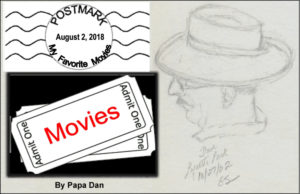 “[He’s] one of what we all are, Pelly,
“[He’s] one of what we all are, Pelly,
less than a drop in the great blue motion
of the sunlit sea.
But it seems some of the drops sparkle,
Pelly, some of them do sparkle!”
— King Arthur (Camelot)
“It’s quality work, and there
are simply too many notes, that’s all.
Just cut a few and it will be perfect.”
— Emperor Joseph (Amadeus)
Click for a PDF of this post:
82-ConVivio_My_Favorite_Movies_Aug2_2018
Where did this come from?
Six weeks ago, I published a piece on ConVivio called “Greatest Songs of All Time” (https://convivio-online.net/greatest-songs-of-all-time-2018/). It was inspired by a regular customer at The Flying Pig named Carl. We were talking about songs from “my era” (the 60s and 70s) and he asked me, “What songs are important to you?” So, I mentioned a few off the top of my head and … well, it caused me to rethink a list of The Greatest Songs of All Time that I had posted a few years before. So, when I made a new list and invited others to make their lists, I discovered that there are some talented list-makers among ConVivio readers. Fast-forward to this week and I was talking about those lists of songs with my son Will (one of the proprietors of The Flying Pig), observing how much attention that list-making exercise had attracted. The conversation turned to a favorite movie of mine, which Will’s brother Ben (the other Flying Pig proprietor) recently reminded me of. The movie, “2001 — A Space Odyssey” featured some music that I had accidentally omitted from my “Greatest Songs” list. The movie was a huge favorite during my senior year in high school and is currently getting some attention on its 50th anniversary. Will suggested, “What about a list of ‘Greatest Movies?” I mentioned a particularly dramatic pair of lines from a climactic moment of the movie
— So, this is the result …
PapaDan’s List
Below is my list of my favorite movies. Unlike my “Greatest Songs” list, I did not feel qualified to identify the “Greatest Movies of All Time.” Turns out that “All Time” is beyond the scope of my expertise. SO, my list consists of just the movies I liked best (at least as of today). As a bonus, I include a quote I remember from each one. I invite you to reply, if you like, with:
1. Your own list, as short or as long as you wish, of your favorite movies.
2. You are also invited — though not required — to include a quote that you find memorable from one or more of them (or not).
3. You are welcome to send comments like “How could you possibly leave out ________ from your list?” or “How could you include a dumb movie like _________ ?” All are welcome.
—> A few words of caution — I intended to make a list of ten movies. BUT, that turned out to be impossible. A struggle with painful cutting brought it down from 25 to 17. So, if you decide to make your own list, all of your good intentions to keep it short may be futile. I also could not list them in order of “favoriteness.” Just couldn’t. So, they are in alphabetical order. I also ignored the winners of the most recent Academy Awards, since I wasn’t familiar with many of them anyway. I also did not consider whether “my” movies received any awards in their day.
I hope you, at least, find this exercise interesting.
Here is my list:
My Favorite Movies — August 2, 2018
1. 2001 — A Space Odyssey
• Dave: “Open the pod bay doors, HAL.” HAL 9000: “I’m sorry, Dave. I’m afraid I can’t do that.”
• HAL 9000: “This mission is too important for me to allow you to jeopardize it.”
2. Amadeus
• Emperor Joseph, to Mozart: “My dear young man, don’t take it too hard. Your work is ingenious. It’s quality work. And there are simply too many notes, that’s all. Just cut a few and it will be perfect.”
• Salieri: “This was a music I’d never heard. Filled with such longing, such unfulfillable longing, it had me trembling. It seemed to me that I was hearing the voice of God.”
3. American Graffiti
• “I don’t like that surfin’ shit. Rock and roll’s been going downhill ever since Buddy Holly died.”
4. Butch Cassidy and the Sundance Kid
• Butch: “If he’d just pay me what he’s spending to make me stop robbing him, I’d stop robbing him.”
• Etta: “I’ll do anything you ask of me except one thing. I won’t watch you die.”
5. Camelot
• Arthur (speaking to Pellinore of the newly knighted Tom of Warwick): [He’s] one of what we all are, Pelly, less than a drop in the great blue motion of the sunlit sea. But it seems some of the drops sparkle, Pelly, some of them do sparkle!”
6. Chicago
• Roxie: “I’m a star, and the audience loves me, and I love them, they love me for loving them, and I love them for loving me. And we love each other. And that’s ’cause none of us got enough love in our childhoods. And that’s showbiz, kid.”
7. E.T. the Extra-Terrestrial
• “I’ll be right here.”
8. Field of Dreams
• “If you build it, he will come.”
• John & Ray Kinsella: “Is this heaven?” “It’s Iowa.” “I could’ve sworn it was heaven. Oh yeah, it’s the place where dreams come true. [Looks around and sees his wife playing with their daughter] “Maybe this is heaven.
9. Forrest Gump
• “Life is like a box of chocolates. You never know what you’re going to get.” “Stupid is as stupid does.”
• “I’m not a smart man, but I know what love is.”
10. Funny Girl
• “You think beautiful girls are going to stay in style forever? I should say not! Any minute now they’re going to be out! Finished! Then it’ll be my turn!”
11. The Graduate
• “I want to say just one word to you, just one word.” “Yes, sir.” “Are you listening?” “Yes, I am.” “Plastics.”
12. Moonstruck
• Ronnie Cammareri: “Loretta, I love you. Not like they told you love is … but love don’t make things nice, it ruins everything. It breaks your heart. It makes things a mess. We aren’t here to make things perfect. Snowflakes are perfect. Stars are perfect. Not us.”
13. Planet of the Apes
• “Don’t look for it Taylor, you may not like what you find.”
14. Saving Private Ryan
• “Earn this.” At the very end of the movie, Tom Hanks says it twice — once to Private Ryan and once to all of us in the audience who have benefitted from the sacrifices of soldiers in World War II.
15. The Sound of Music (and let’s not forget My Fair Lady)
• Maria: “When the Lord closes a door, somewhere He opens a window.”
16. Star Wars I – V
• Yoda: “Do. Or do not. There is no try.” Riyo Chuchi: “To die for one’s people is a great sacrifice. To live for one’s people, an even greater sacrifice. I choose to live for my people.”
17. Wizard of Oz
• “True courage is in facing danger when you are afraid.”
18. Midnight In Paris
• Hemingway: “The artist’s job is not to succumb to despair, but to find an antidote for the emptiness of existence.”
19. Same Time Next Year
• Doris: “Doris”; George: “What?”; Doris: “My name is Doris.”; George: “Your name is Doris?”; “Yes.”; George: “But I’ve been calling you Dorothy all night.”; Doris: “Yes, I know.”
20. The Princess Bride (The Greatest Movie Ever Made — according to me)
• Inigo Montoya (to the Six-Fingered Man): “My name is Inigo Montoya. You killed my father. Prepare to die.”
What’s missing from my list?
I omitted a category of “ancient” movies (like Casablanca and those starring Marlon Brando-types), movies by Alfred Hitchcock (although I enjoyed several of them, notably The Birds and Rear Window), and most “war” movies (notably Patton). I also left out The Ten Commandments (I was ten years old when my parents took me to the drive-in to see it), and Ben-Hur (I was nine when my parents took me to its Premier in Oakland), Raiders of the Lost Ark (not sure why), Schindler’s List (because I don’t like remembering it), and Blazing Saddles (because all the memorable quotes are racist and disgusting).
It’s funny about movies. Looking back, some of the choices of “favorites” can feel quite personal and can represent who we were back when we saw them. But, they’re just movies, right?
I look forward to your comments, maybe even a few lists.![]()
Below is Cary Sapone’s list of favorite movies
— In no particular order (another excellent list!).
Shawshank Redemption
Pretty in Pink
Mrs Doubtfire
Pretty Woman
When Harry Met Sally
How the Grinch Stole Christmas
The Pursuit of Happiness
Back to the Future
Sixth Sense
The Polar Express
Trying To Make It Better
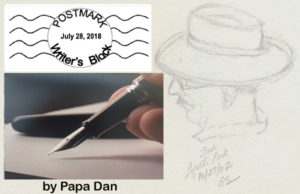
Hey, Jude, don’t make it bad.
Take a sad song and make it better.”
— Paul McCartney
Recently I wrote something called “Interruptions,” reflecting on the continuous drumbeat of tragic stories that emerge from the daily news. Every day, it seems, we hear another new piece of bad news piled on top of the unraveling stories of bad news from previous days. I read “Interruptions” in public at The Whistlestop Writers meeting here in the Tri-Valley. From the reaction, it seemed to have resonated with members of the audience. However, on reflection, I think even my central question — “What should I do about it?” — only made us feel worse about the things happening in our world these days. Gretta asked me, and I had to ask myself, “Was it a good thing to inflict such thoughts of harm and futility on my audience? Were they any better for it? Was I? Or did I just contribute to how bad we all feel about the world around us? One day’s bad news may distract us from yesterday’s bad news – or last week’s. More often, I fear, the accumulation of stories has a “multiplier effect.” In short, did I just make it worse?
Yep. Maybe so. I decided not to publish it on ConVivio.

So, the resulting “Writer’s Block” (pictured here) has me looking for something else to think about and something else to write about. So, here is a quick start — just a start. Just little things. It’s brief. We’ll see if this approach leads anywhere.
Some News That’s Not Bad
Caught on “smart doorbell” camera, kids return wallet with $700 inside.
http://abc7news.com/society/caught-on-camera-kids-return-wallet-with-$700-inside/3835550/
Small American town welcomes refugees with Southern Hospitality.
https://www.today.com/news/clarkston-georgia-home-thousands-refugees-t132421
There’s a new Alzheimer’s/dementia drug that’s showing promise in slowing memory loss in early clinical trials.
https://www.nytimes.com/2018/07/25/health/alzheimers-dementia-drug-treatment.html
A generous anonymous donor reveals her identity. She gave millions to artists without taking credit for the gifts.
https://www.nytimes.com/2018/07/20/arts/design/susan-unterberg-artist-grant.html
A British supermarker chain is introducing a “quieter hour” for autistic shoppers.
https://www.nytimes.com/2018/07/19/world/europe/uk-supermarket-autism-morrisons.html
An experiment with a four-day work week is a surprising success.
https://www.nytimes.com/2018/07/19/world/asia/four-day-workweek-new-zealand.html
Tourist accidentally pays 100 times taxi fare— driver tracks him down to return it.
https://www.goodnewsnetwork.org/when-tourist-accidentally-pays-100-times-his-taxi-fare-driver-tracks-him-down-to-return-it/
Riders of dirt bikes and all-terrain vehicles, illegal in most cities, have found a community.
https://www.nytimes.com/2018/07/25/nyregion/dirt-bikes-bike-life-ride.html
Recovering addict anonymously pays for ambulance crew’s breakfast.
https://www.goodnewsnetwork.org/recovering-addict-anonymously-pays-for-ambulance-crew-eating-breakfast/
Surprising solution: saving a country from wildfires with goats.
https://www.goodnewsnetwork.org/goats-the-surprising-solution-to-saving-a-country-from-wildfires/
There’s a lake of liquid water on Mars.
https://www.nytimes.com/2018/07/25/science/mars-liquid-alien-life.html

A mother duck is caring for 76 ducklings on Lake Bemidji in Minnesota.
https://www.nytimes.com/2018/07/24/science/merganser-ducklings-photo.html
Today, right now, across the world, something good is happening — whether or not we hear about it or acknowledge it as something good. And, as Walter Cronkite used to say at the end of The Six O’Clock News back in the 1960s, “And that’s the way it is.”
And, there’s more …
Your comments on this topic are welcome. ![]()
Today’s ‘New Renaissance’
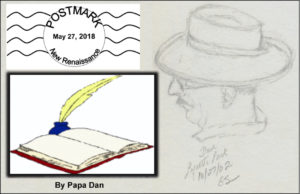
“Eppur si muove” (and yet it moves)
– Galileo Galileo
“There must be some kind of way out of here,
said the joker to the thief.”
— Bob Dylan (“All Along the Watchtower”
sung by Jimi Hendricks)
Is it possible for ‘progress’ to be a good thing
and a bad thing at the same time?
— PapaDan
Click here to download a PDF of this post:
78-ConVivio_New_Rennaissance_May27_2018
= = = = = = = = = = = = = = = = = = = = = = = = = = = = = = = = = = = = = = =
Good News and Bad News
In their book “The Age of Discovery,” published in May, 2016, Ian Goldin and Chris Kutarna defined our current age as a “New Renaissance.” They observed that the forces at work during the period 1450-1550 in Europe (i.e., the “original Renaissance”) were very similar to the forces that are shaping our own time here in the 21st century.
During the “original Renaissance” (the one we learned about in school), Da Vinci, Brunelleschi, Columbus, Copernicus, the Medici, Galileo, Michelangelo, Luther — just to name-drop the top level of superstars of the time — shaped the western world’s understanding of, well, everything.
Newly acquired knowledge and capabilities changed the world through:
• scientific discovery,
• advancements in art and architecture,
• observations and predictions of the behavior of the universe,
• unprecedented global navigation,
• and new views of the relationship of humans to ““the church” (and, therefore, to God).
All these had significant effects on employment, manufacturing and distribution, wealth and poverty, political power, belief and behavior, health and longevity, life and death, and the structure of society.
Oh, yes, and one more thing — arguably the most significant thing — Gutenberg’s printing press. This invention made it possible for people everywhere to KNOW about all of those ‘Renaissance’ effects more quickly and cheaply than ever before and to acquire that knowledge UNFILTERED. Before the use of those small metal letters, oil-based ink, and flat white paper, knowledge was the primary possession of The Church, since it alone had access to The Bible and whatever other knowledge that could be transmitted by written language. Before that time, The Bible and other documents were produced slowly and laboriously in rooms full of monks who copied the text by hand with quill pens, creating the only copies of existing knowledge. Church leaders decided who could see those documents and controlled their contents. Gutenberg’s gizmo changed pretty much everything. The centralized ability to control knowledge and, therefore, to control people, began to diminish dramatically.
Looking back, most people have agreed that these developments — this rebirth and dramatic expansion of knowledge to “the masses” — represent the single greatest combination of human advancement and improvement in the lives of real people in the history of civilization.
Right?
And, of course, as the distribution of paper with little squiggly marks on it increased, it also enabled a dramatic increase in education of all kinds AND an expansion in the ability of people to participate in their governance and political decision-making. Those are good things.
Right?
The Rest of the Story (as Paul Harvey used to say)
Last fall, a column appeared in the Washington Post, written by David Von Drehle. In that piece, he made some simple observations and obvious comparisons that led him to a startling conclusion. He started with our Gutenberg story — how a goldsmith in Germany found a way to reproduce identical copies of important information and distribute that knowledge cheaply and quickly across the world without the control of the “main-stream media” of the time. He observed that nothing was ever the same after that invention.
So, what specific outcomes happened as a result of the use of the printing press? He reminds us:
• Lay people could own and read their own Bibles,
——-> The result was the Protestant Reformation
• Scientists could record their observations to share with other scientists
——-> The result was the Scientific Revolution
• Inventors could share their innovations with other inventors
——-> The result was The Industrial Revolution
• Philosophers could spread their ideas to activists
——-> The many results included one particular document written in a distant European colony that begins, “We the people of the United States, in order to form a more perfect union …”
So, does any of that sound familiar to those of us who are paying attention here in the 21st century? The comparison? Von Drehl asserted, “When Apple unveiled its first smartphone in 2007, the company sparked a communications revolution likely to be as transformative as Gutenberg’s. It’s the nature of such seismic change to shake the institutions of culture and society to the ground.”
So, what happened? The election of 2016 happened. Von Drehl observes that 2016 was the first American election truly dominated by mobile communication and social networking. As a result, information, the ideas that follow from that information, and the conclusions drawn from them were “set free.” This development has made the world a much tougher place for people who have derived their power and influence from an ability to control information, ideas, and opinions, — like the leaders of political parties. So, here comes Von Drehl’s dramatic conclusion:
Steve Jobs Gave Us President Trump
https://www.washingtonpost.com/opinions/steve-jobs-gave-us-president-trump/2017/09/05/f4f487e4-9260-11e7-aace-04b862b2b3f3_story.html?utm_term=.f61b89c59bd2
WHAT??!!!
Did Anybody Warn Us?
Anyone who makes even a cursory study of the process and logic that led up to the writing of the US constitution, finds some awkward words coming from the Founding Fathers. Much of the intent of the constitution derives from ideas found in The Federalist Papers, written by Alexander Hamilton and James Madison, with some help from John Jay, and the discussions that took place during the Constitution Convention of 1789. Much discussion at that convention centered around the need to avoid the pitfalls that had caused previous attempts at democracy to fail by giving too much power to “the people.” Here are a couple of excerpts:
- James Madison wrote in Federalist Paper No. 10: “In a pure democracy, there is nothing to check the [influence of] the obnoxious individual.”
- At the 1787 Constitutional Convention, Edmund Randolph said, “… in tracing the causes of past failures to their origin, every man had found [the causes] in the turbulence and follies of democracy.”
- John Adams said, “Remember, democracy never lasts long. It soon wastes, exhausts, and murders itself. There was never a democracy yet that did not commit suicide.”
- Chief Justice John Marshall observed, “Between a balanced republic and a democracy, the difference is like that between order and chaos.”
In summary — the framers of the constitution were afraid of democracy, the extent to which it gave power to “the people.” As a result, they wrote a number of provisions into the constitution to protect the government from the ignorance and poor judgment of “the people.” The electoral college, for example, was designed as a layer of protection to ensure that the people will not be able to directly elect a president, without the guidance and restraint provided by an elite group of leaders (like themselves). The reasoning — in the words of John Adams, “the people are likely to be easily brought under the influence of a demagogue if given unchecked power.” Wow, did THAT ever backfire! Similarly, the constitution, as originally adopted, provided that members of The Senate would be selected by the State Legislatures for that same reason — that the people are likely to make rash choices in difficult times without “adult supervision.” Similar features are found throughout the document, some of which were later amended.
So today
The mobile communication and social networking made available by the innovations introduced by Steve Jobs (and others) made it possible for “the people” to access unfiltered information — regardless how wise or spurious it may be — to persuade each other in ways that appeared authoritative, and to make decisions that may or may not be in their own best interests or in the long-term interests of the republic. Sounds like that is exactly what the founders feared.
So, here we are.
What do we do? Does this mean that we have overdone this ‘democracy’ thing in America? Is there something we should do to try to reverse some of its effects? If history is a guide— and it usually is — I’d observe that the effects of the “original Renaissance” were more or less permanent. So, perhaps, there’s no going back to a time when information could be owned and controlled? AND I think most of us would agree that we would not want to return to a time when an “establishment” could control information and knowledge — even if WE were part of that establishment. On the other hand, in a world of uncontrolled information, is there a way to give Americans the tools to recognize truth and wisdom when they see it and distinguish that from lies and foolishness? Well, on another “other hand,” is it possible that “the people” stumbled on some wisdom in the Election of 2016 that some of the rest of us are just slow to recognize? Is throwing out conventional wisdom and starting over a good idea? We look back fondly on that achievement when they did that during the “original” Renaissance — back in the 15th century and the times that followed, right? They overturned an oppressive and ignorant time and replaced it with some useful ideas. In the long run, it turned out pretty good for us, here in the future. Of course, it was pretty traumatic at the time for those who had to endure dramatic and disruptive changes, eh? There was a period of pretty serious disorder.
So, was THAT RENAISSANCE a good idea? What about THIS ONE? Is it merely a difficult time we must endure to get to a better time? Can we predict the long-term effects of the changes we are noticing today? What will “the future” think of what we have done? What will our grandchildren say when they are our age? Will they be proud of us?
What do you think?
So, I guess we’re still working on it. We’ll see. ![]()
.
The In Crowd
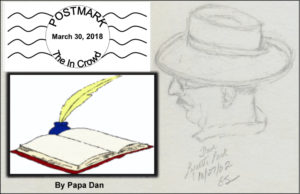
“You ain’t been nowhere
’til you’ve been in
with The In Crowd.”
— Dobie Gray (lyrics by Billy Page
Click here to download a PDF of this post: ConVivio_The_In_Crowd_Mar29_2018
= = = = = = = = = = = = = = = = = = = = = = = = = = = = = = = = = = = = = = = = = =
Last week, a friend of mine lamented the fact that some important content she was interested in was available only on Facebook, Twitter, and other social media. The bad news was that this content happened to be the marketing material from the publisher of her soon-to-be-released book. The problem, in her words, was this: “I don’t do social media and don’t intend to start!”
After some thought, I replied, “It seems to me that everyone assumes these days that we are all is hooked up to these social-media websites; and, if you aren’t, you don’t have a clue what’s going on. It’s like the new ‘In Crowd.’ “
And then a memory popped into my head — “Remember the song from back in the day …”
An Old Song Pops into My Head
Let’s drift back a moment to 1964. Every Saturday morning on radio station KYA, my favorite disc jockey, Emperor Gene Nelson, would count down the “Top 30 Hits” for that week. A lot of new songs were introduced on those Saturdays; and it was absolutely essential for us 14-year-olds to keep up with the latest music. High school was a big change for me. After eight years in the same school, in the same class with pretty much the same faces, the transition from being an 8th grader to being a High School freshman was intimidating.
My freshman class had ten times as many kids as my 8th-grade class had. I knew thirty-some kids and the rest of the 300-some kids in the Freshman class were strangers. But, even as a stranger, like other 9th-graders, I quickly realized that listening to the right music would be required to fit in to my new world. So, I listened carefully — to the Beatles, The Stones, The Supremes, Leslie Gore, The Dixie Cups, The Dave Clark Five, Dusty Springfield — to all the music Emperor Nelson played on KYA.
With all that in mind, one Saturday morning, The Emperor introduced a new song that got my attention. The song was “The In Crowd.” Coming from a school where I had always known everyone, the idea of an “In Crowd” was new to me. The big, bold voice of Doby Gray sounded like a voice of authority.
Here is what the song said:
The In Crowd
By Dobie Gray (recording released December, 1964); lyrics by Billy Page
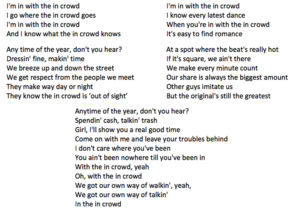
Not all of the ideas in the song were new. I already knew that some 8th graders were considered more “cool” than others (certainly more “cool” than I was); and “cool” usually meant exhibiting behaviors that other kids admired. I remember a friend of mine, Michael Savage, (who had an older brother who could teach him “cool”) showed up one day in the 8th grade with “a new way of walkin’,” like the song said. When he walked across the courtyard at school, with his slow, purposeful gait and aloof expression, he caught the admiring eye of those of us who were “less cool.”
So, back then, I suppose we 8th-graders had a sense that some of us were especially “in”;
but the following year when the song came out, to my 9th-grade ears, some of these “In Crowd” song lyrics revealed ideas that separated those who were “in” from the rest of us. Two examples:
First: it hadn’t occurred to me that some people “know what the in crowd knows” and presumably, those were things that I didn’t know, and
Second: apparently, the chosen few “go where the in crowd goes” and “if it’s square, we ain’t there.”
I wasn’t completely sure what “square” meant — except that I suspected that “square” included attributes that I probably had and included places that I went. (Uh, maybe places like the library or the store where I supplied my stamp collection? I suppose they were “square.”)
As I became more accustomed to high school, some of the lyrics were actually troubling:
the assertion that “our share is always the biggest amount” didn’t sit well with my teenage sense of fairness and I wondered, as an outsider, ‘what earned you that biggest share’ — other than trivial stuff like “our own way of walkin’ ” and “our own way of talking’.” The song assigned behaviors to those of us who were not in “The In Crowd” that I didn’t like:
They make way day or night
They know the in crowd is ‘out of sight.’
Who said I was going to “make way” for anyone?” On reflection (or what passed for ‘reflection’ in a 14-year-old), “Spendin’ cash, talkin’ trash” did not sound like something worthy of respect.
Evolution
As time went on, and this Freshman became a Sophomore, and so on, other bits of evidence confirmed my suspicion (and hope) that there were other ways to earn respect — things like getting good grades, succeeding at athletics, reading books, joining clubs, being a good friend, etc. The music continued to be important to me (and I learned to keep quiet about my Frank Sinatra and Tony Bennett records), but I came to realize that a narrowly defined “in crowd,” that merely imitated approved “cool” behaviors, was not particularly appealing. I considered that a person, even in high school, could be part of more than one “crowd.” One of my teachers had a sign on the classroom wall that I copied into my notebook. It said:
“They laugh at me because I’m different.
I laugh at them because they are all the same.”
Fast Forward to Today
So, as I mentioned, these “In Crowd” lyrics from 54 years ago did not spring into my memory out of nowhere. The pervasive nature of Facebook, Twitter, and other social media seems to have created a new “in crowd.” While digital media was originally promoted as being inclusive; in fact, the “In” and ”Out” feature of digital social media seems to have grown more exclusive. Has Facebook become a new “In Crowd?” We have learned lately that there are things we have to give up to be a member of that crowd.
Looking at this topic through the lens of today, I think we can hear these lyrics in The News that we hear every day. We seem to be surrounded by people who want us to believe that we must be members of a particular exclusive “in crowd” or we are not properly American. Some promote the idea that the survival of that American “in crowd” requires its members to exclude people who are different. Are we being fed an exclusive “In-Crowd-First” philosophy?
The optimist in me wants believe that the kind of exclusive “In Crowd” behavior we saw as teenagers of 1964 eventually disappears with age and is replaced with something more sensible and grown up. There is evidence, however, that my optimism may be naïve. Is today’s “in crowd” mentality growing rather than receding? Is it dangerous? How divisive can it get?
But, I do notice that some crowds are emerging with more inclusive intentions — crowds like “Enough is Enough” and “Never Again.” Some of the most articulate and welcoming spokespersons of those crowds are not much older than I was in 1964 and they are starting to emerge as the “grown-up” voices of our time. And the crowds, just last weekend, have been quite large. Do these “in crowds” offer just another short-lived “new way of walkin’ ” and ” new way of talkin’ ” as they did in my youth?
Or is something more enduring, more inclusive, perhaps more promising, on the horizon?![]()
The Good Old Days?
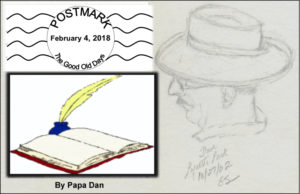
“Nothing is more responsible for ‘The Good Old Days’ than a bad memory.”
— Franklin P. Adams
“These are ‘The Good Old Days.’ ”
— Carly Simon
Click here to download a PDF of this post: ConVivio_DRAFT_GoodOldDays
= = = = = = = = = = = = = = = = = = = = = = = = = = = = = = = = = = = = = = = = =
We’ve All Heard It— Or Said it — Some Version of It
I’ve heard it a number of times lately, in various forms, by people of different ages or with very different points of view — myself included — some version of:
“How did we get here? Things were never this bad back in _____________”
(and here we fill in the blank with our version of ‘a better time’)
Mighta been “back in the 1950s, when I was a kid,” Or maybe “back in my thirties when my kids were little.” Some might offer: “The 1970s, when I was a kid.” Or “at the peak of my career when I was at the top of my game.” Or “back when movies were better” or “back when the government worked better” or “when I could hit consistently from the three-point-circle.” Or how about “when the world (or the country or the city or the neighborhood) was safer (or cleaner, friendlier, easier to understand or had less traffic)?” Or “two years ago, before . . . ”
You know: “The Good Old Days.” You remember.
I suspect each generation can recall a decade or a year (or a month or a day or even a place) when/where the things that are annoying or troublesome or frightening about today were NOT happening (or at least did not seem so annoying or troublesome or frightening in our memory). Do you have a memory of such a time — a time that you remember as being better than today in some way? I bet you have some images in your mind that represent what was better about that time. Were the people better, more reliable, more friendly, smarter? Were the choices available to you more appealing back then? Easier to achieve? Less of a struggle? More fun? Did stuff make more sense to you? Were those times really better?
A Well-Used Example
People my age (the ‘baby-boom’ generation) like to talk about the 1950s and early 1960s, remembering it as a time of stability and simplicity, when music was more harmonious, when post-war America was expanding its prosperity and influence in the world and building lots of shiny new things — cars and highways, and buildings, and corporations, and … stuff. Maybe we remember that we liked our neighborhood better somehow.
Just for fun, let’s take a look at that time, just was an example. We’ve got pictures …
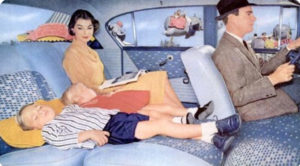


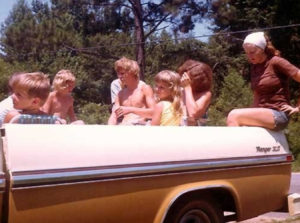
Some of us remember the time before seat belts, riding in the back of station wagons and pick-up trucks. It was a time when there weren’t so many rules; but I guess we don’t want to think about the danger we were in every day. Seat belts started showing up at the end of the 1950s and many of us actually started using them in the mid-1960s.
Other memories come to mind from that era —
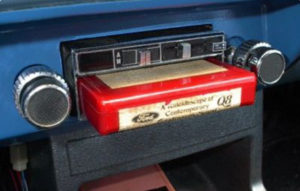

Remember when eight-track stereo (above, left) started showing up in cars about 1964? And when they were replaced by cassette players in the late 1970s? Yes, this was way before CDs (1982). But, we’re getting ahead of ourselves. Here’s what really mattered at the end of the 1950s:
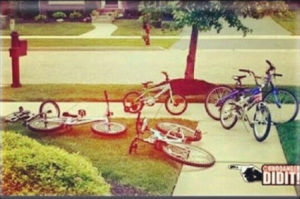
Before any of us cared about cars, here is how you found your friends in the neighborhood in the 1950s. Here, they’re all down the street at Kelly’s (he had a swimming pool).

And do you remember when you (OK, your parents) could drive up to a hamburger place (like A&W or the “Panther Drive-In” in Antioch) and the ‘Car Hop’ would come out to the car (sometimes on roller skates) and serve your food on one of these window trays? (What do you mean you never went to the Panther Drive-In in Antioch? There was a time when it was the center of the universe. Didn’t you know?)
Me? OK, I hung out at Fosters Freeze.

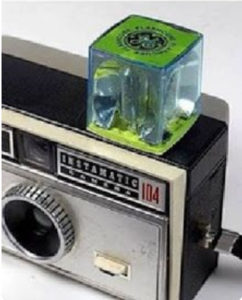

Surely you remember when every business had a cash register like this one on the left? Maybe you started using an Instamatic camera with flash cubes to take photos around 1963? (It used film — remember film?) But, most important of all was the transistor radio, above on the right. I’m sure you, like me, listened to the San Francisco Giants (as described by Russ Hodges and Lon Simmons) on one of these. And, on Saturday mornings, I listened as Emperor Gene Nelson counted down the Top 30 songs on KYA. Then in the late evening on KYA, Big Daddy Tom Donohue played those same songs and read commercials for Clearasil (the Acne Cream). He would sign on at the beginning of his show with these words: “This is your Big Daddy Tom Donohue. I’m here to clear up your face and mess up your mind.” No fooling, he actually said that every night — don’t you remember?
“The Fifties” Come Into Sharper Focus
Those are some of the things that I remember about that era. I claim that “The Fifties,” the fabled time of stability, predictability and good times, lasted from 1950 until November of 1963. After that, troubling, unexpected things started happening — or maybe I just became more aware of a wider world with more complexity and danger than I had seen before. I learned that America was in a mortal struggle against The Soviet Union who, we were told, wanted to kill us all with nuclear weapons because they believed that we wanted to kill them with those same weapons. When we practiced diving under our desks at school in the event of a nuclear attack, I became painfully aware that the wider world was a threat to us right here in my town.
On the evening news, Walter Cronkite starting telling us some very disturbing things including the fact that my hero at the time had been murdered on the streets of Dallas. When I showed up in high school in 1964, I began to learn that wars were brewing all over the world and Americans not much older than me were being sent to fight in those wars. I learned that while I was having my stable and secure childhood in my peaceful California town, others in my own state lived in towns that had bloody race riots. The only people of color I met growing up were the housekeepers who worked for my mother and basketball players who played for Pittsburg High School in the town next to ours. I wondered why there were no Black students in my high school and none seemed to live in my town. It wasn’t until 1968 — about the time that Martin Luther King and Robert Kennedy were murdered — that I learned that a class-action lawsuit had been filed against realtors who had conspired to make sure that no Blacks moved into Antioch. I remember being shocked and embarrassed as I packed up to go away to college.
Every day, it seemed, there was more distressing news and I became increasing aware that my own stable and peaceful life was an exception, not the rule, and I was living in the middle of troubled times across my country and around the world.
Well, so much for my example of “The Good Old Days.”
Waiting? What Might We Learn?
Just as we learn that it’s foolish to look back and wish for a return to “good old days” we think we remember, it also turns out to be foolish to wait for better days ahead. A song I remember from 1971, written and sung by Carly Simon, advises us to invest our energies into making TODAY the best it can be. The song, “Anticipation,” tells us that pinning our hopes on the future is wasteful. She wrote:
Anticipation, anticipation
Is makin’ me late
Is keepin’ me waitin’
She offers this advice:
I’m no prophet and I don’t know nature’s ways
So I’ll try and see into your eyes right now
And stay right here ’cause these are the good old days
These are the good old days. These are the good old days.
These are the good old days.
I take her advice to suggest that we have to invest in THIS day. I observe that there is much to like about today — I am surrounded by people who matter to me and who make my life matter. If today is not what we want it to be, we, along with those close to us, have the responsibility to make it better.
My conclusion? The past and the future are both flawed. THESE are the only “Good Old Days” we get. Maybe they’re only as good as we make them.
![]()
An Optimist Looks At 2018
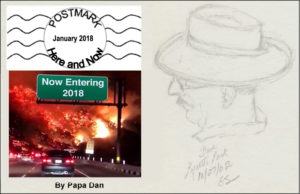
“I’m an optimist. I tend to believe that, at some point, common sense and justice
will prevail, at least for a while.
I was raised to believe that you
can make good things happen.
Let’s face it, nobody gets out of here alive.
So, if today isn’t to our liking, it’s on us to
own it and make it better. We have more than enough people trying to make it worse.”
— PapaDan.”
Click here to download a PDF of this post: Optimist_looks_at_2018_FINAL
= = = = = = = = = = = = = = = = = = = = = = = = = = = = = = = = = = = = = = = = = = =
2017 was a strange year
An optimist might be hard pressed to use 2017 as a guide for deciding what to expect from 2018. Events in 2017 were certainly not predictable from evidence provided by 2016. For most of the year, how many predicted the outcome of the election, the reversal on the Paris Climate Accord, the childish name-calling that emerged in public discourse, a disparaging attitude toward the victims of natural disasters, and the threat of war around the world. Nobody expected that 2017 would be a year of women’s empowerment with a long list of male celebrities falling from power and influence after revelations of sexual misconduct. And, those stories are NOT over yet. None of them. An optimist has to look elsewhere to make predictions.
This Optimist’s Predictions for 2018
So, with 2017 as an unreliable body of evidence, how can we decide what to expect from 2018? Here are some things that this optimist expects are possible.
We’ll start with the important stuff:
The Academy Awards: “The Post” will win the award for Best Picture. How could it miss — it highlights the value of courage, the importance of the press in holding the powerful accountable, and the indispensable role of a woman pushing against daunting obstacles — the perfect messages for our times — AND it stars Meryl Streep and Tom Hanks! Bet the farm on it. (OK, so I predicted “La La Land” would win last time; and I was right for about 30 seconds.)
The Grammy Awards: I haven’t the faintest idea, since I haven’t heard of most of the nominees. — although the album “Tony Bennett Celebrates 90” sounds promising.
The NBA Championship — The Warriors will win — nuff said. (How many players can share the MVP award?)
The World Series — I can’t comment on the outcome of a World Series between the Yankees and the Dodgers; it violates every principle of “The Optimist Creed” (take a look here) that used to hang on the wall in my Dad’s office. So, I am required to predict that My Giants will win (maybe . . . someday).
The Super Bowl — I really don’t care, except that I hope football will continue to decrease in popularity, starting at the local school-district level and permeating upward. (BUT, Nancy has a terrific Super Bowl Party that MUST continue! — It’s all about the commercials and the wine.)
Now, Let’s Get Serious . . .
The U.S. Economy:
Paid family leave will become increasingly widespread — On January 1st, New York joined California and other states requiring paid family leave in more categories of employment.
The (new) Great American Migration begins — Silicon Valley and Wall Street will follow Amazon’s example and open major campuses in American regions where unemployment is high and real-estate prices and taxes are low. Depending on how fast and how thoroughly this strategy plays out, this migration could change . . . well . . . everything we currently understand about American life from politics to economics to regional culture.
Cost of Living vs Income — Minimum wages are rising in some 18 states at the start of 2018 (ranging from $7.95 in Missouri, to $13.50 in parts of California, to $15.45 around Seattle). The Great Migration mentioned above will strengthen this trend. The U.S. inflation rate is predicted to hover around 3.2% in 2018 (up a bit from 2017); BUT, the coming budget deficits caused by “tax reform,” may dramatically inflate the inflation rate nationally. We’ll have to wait and see.
Home purchases and mortgages — High house prices left over from 2017 are likely to stay high. People who live in places that lose historic industries (say, coal mining) will find it expensive to move where the jobs are and those opportunities are likely to require different skills and more education. With all the rebuilding that will be necessary after the hurricanes and fires, housing will be a challenge for the working class. We’ll have to see how/if the “Migration” works out.
The stock market will continue to rise, and even more sharply as corporate tax cuts take effect. Some will continue to assert (citing “alternate facts”) that profits reflected in stock prices lead to increases in hiring and wages. Economic history teaches that employers don’t hire employees because they receive a tax cut. Hiring has been stimulated primarily by one overarching feature: customers with money in their pockets. Therefore, the factors likely to lead to large-scale hiring are mostly absent from the business outlook for 2018. Instead, the market boom will continue to result in higher dividends for shareholders and profitable mergers that lead to consolidation (read: layoffs). THEN, corporate celebrating will be interrupted by an Autumn sell-off like the one in 1987. Such a sell-off and the above-mentioned migration could confirm the disjointed relationship between the stock market and the rest of the economy. Is that good news or bad news? This optimist predicts the result will be a dramatic election turn-about in November.
“The Mall” vs “Downtown” — A life-and-death struggle is developing between malls, with corporate stores like Macy’s and Nordstrom, and locally owned downtown shops. AND both of these business models are threatened by Amazon-style online shopping. Will online commerce drive local stores out of business? How many? What will happen to the people working in those stores? This optimist makes a two-stage prediction. First, online shopping will continue to strain local stores well into 2018. But, I expect large numbers of people to make the conscious decision to “shop local.” We’ll get tired of sending online purchases back to Amazon because they don’t fit right or don’t look the same as they do online. More shoppers will decide that they want to try on their purchases. Amazon seems to agree, given their purchase of Whole Foods and Target. If that happens soon enough, local stores may continue to be the backbone of local economies.
Optimists are mixed on this. We’ll have to wait and see.
World Events
The Korean Peninsula will begin to show peaceful signs by the end of January, despite the bellicose influence of the U.S. president in the region.
— On January 1st, Kim Jong Un extended an olive branch to South Korea, proposing discussions about the possibility of a North Korean delegation to the upcoming Winter Olympics in South Korea. He expressed the goal of a “peaceful resolution with our southern border.” South Korea agreed to high-level discussions on January 2nd. Prediction: the U.S. will continue to become more isolated in foreign affairs as other nations — in Europe, Asia, and the Middle east — explore solving worldwide problems (like global warming, “a two-state solution,” and European cooperation) without the obstacles created by rhetoric from the U.S. president. This promises to be both a problem (Step One) and a solution (Step Two) as an eventual rebalancing begins.
The Winter Olympics in South Korea — For two weeks in February the world will focus on the games alongside the warlike rhetoric of Kim Jong Un and Donald Trump. Many have suggested that this event is a recipe for disaster in the current international climate (remember the massacre at the Summer Olympics in Munich in 1972?). This optimist has come around to the view that, this time, the Olympics will actually do what they were intended to do — bring people together and lead to better understanding among people who look at the world through different eyes. North and South Korea may come around to find common interests and make their own way without the superpower rhetoric that has kept them apart for the past fifty years.
A Royal Wedding — Prince Harry and American Meghan Markle will be married in May. It will be a day for Brits to enjoy their royal anachronism. As usual, however, America’s top-level weirdness is interfering. Will the Royal Family insist that the sitting American president be invited or will the groom simply invite his buddy Barack and cause another Trump-centered kerfuffle? This optimist predicts that Obama will be invited to the wedding as a friend of the family and Trump will announce his rejection of the (not yet offered) invitation. Most Brits will say good riddance, keep calm, and carry on. Trump will probably announce that the British Prime Minister will not be invited to his Fourth of July tea party at Club Mar-a-Lago.
Domestic Politics
Trump’s Approval Rating will dramatically increase to 25% after he resigns in June. Two possible reasons will be offered for his resignation: 1) for health reasons or 2) “It was always my intention to make Mike Pence President; so, this is another in my long list of successes.”
The American 2018 Mid-Term Election — The November election will decide the control of the House and the Senate. This Optimist predicts that Democrats will win a slim majority in both houses and begin efforts to restore America’s leadership in areas like global climate, science-based energy independence, a two-state solution in the Middle East, income equality, a sensible tax structure, and other urgent policy areas. Prediction: in the short term, they will fail in many of those efforts. The Trump (or Pence) Administration will stand in their way as best they can. But, it will be a first step. The work will continue in statehouses and city councils across America. We’ll find out what we’re made of and it will take some time in the imperfect way we optimists always conduct ourselves.
We’ll see. This optimist expects to be surprised.
Finally,
This optimist believes that the key to a better 2018 will not be found in the national news; it will have to come from the way we treat each other right here in our own neighborhoods and families. While race, class, gender, and religion will continue to be a source of national and international conflict, the way forward must be local — in our selection of the people we choose to emulate — teachers, neighbors, you and me. We can affect change, but we have to be patient. I like a line I read from distinguished journalist Eric Sevareid near the end of his life:
“I’m sort of a pessimist about tomorrow and an optimist about the day after tomorrow.”
And as President John F. Kennedy said near the end of his inaugural address in January of 1961:
“All this will not be finished in the first one hundred days.
Nor will it be finished in the first one thousand days,
nor in the life of this administration,
nor even perhaps in our lifetime on this planet.
But let us begin.”
Yes, the sun will rise in the morning, good people will do the work they do best, be a good friend, be a good parent. a good sister or brother — and oh, YES, drink some good wine. Some will find ways to bring others along with them, helping those who need help and encouraging those who need only encouragement. Optimists will take inspiration from those optimists who have gone before them — like Winston Churchill, who said:
“Success is not final, failure is not fatal:
it is the courage to continue that counts.”
Happy New Year!
![]()
Grace — 2017
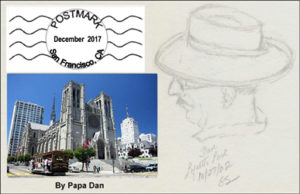
“I do not understand the mystery of grace — only that it meets us where we are but does not leave us where it found us.”
— Ann Lamott
Click here to download a PDF of this post: Grace_ConVivio_2017_LITE
= = = = = = = = = = = = = = = = = = = = = = = = = = = = = = = =
Extending a Tradition of Grace
On Saturday, December 9, 2017, Gretta and I continued our twenty-year tradition by attending an event called “A Cathedral Christmas.” It is an annual Christmas concert of the Men’s and Boy’s Chorus, orchestra, and pipe organ, at Grace Cathedral in San Francisco.
I have written about this annual event before on ConVivio (notably in 2009 and 2015), and each time my goal was to shine a light on the powerful effect it always has on our experience of the holiday season. For us, the tradition starts with its magnificent music, having the ongoing effect on the lives of real people of all types that thoughtful art can have. In addition to the music itself, the venue — Grace Cathedral on California Street in San Francisco — contributes its powerful presence and enduring heritage to our encounter with the holiday season. And last but not least, this event intentionally involves itself in the tenor of the times in which we live — for Grace Cathedral has long served to participate in the life of its broad Bay Area community not only with its Christian Anglican traditions, not only with its music, but also by contributing to the everyday issues and struggles, both diverse and universal, that affect the lives of our society.
The Venue: Grace Cathedral
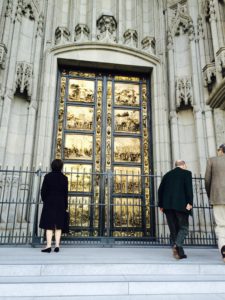 Grace Cathedral has long committed itself to be a house of prayer for all people and a place where all are welcome — prayerful or not. I observe that those two commitments set it apart from many other institutions that seem on the surface to be similar. Over the years I have noticed that the cathedral community provides many gifts, usually without a lot of fanfare, to people of all kinds whether they are part of their faith community or not. I learned, for example, of the hundreds of homeless who have been housed in the cathedral basement over the years. It also has lived up to a well-earned reputation for welcoming members of society who have not always felt welcome elsewhere in the Bay Area and the nation.
Grace Cathedral has long committed itself to be a house of prayer for all people and a place where all are welcome — prayerful or not. I observe that those two commitments set it apart from many other institutions that seem on the surface to be similar. Over the years I have noticed that the cathedral community provides many gifts, usually without a lot of fanfare, to people of all kinds whether they are part of their faith community or not. I learned, for example, of the hundreds of homeless who have been housed in the cathedral basement over the years. It also has lived up to a well-earned reputation for welcoming members of society who have not always felt welcome elsewhere in the Bay Area and the nation.
Left: “Ghiberti’s Doors,” copies of the 15th-century originals residing in Florence, reveal a welcoming heritage — the originals started the Italian Renaissance in bringing great art to everyday lives of real people.

Grace Cathedral: inside and out

Grace Cathedral can get colorful: inside and out
The Music
Usually, the Christmas concert focuses on two principal themes: 1) the joy associated with the birth of The Child — represented by well-known Christmas carols in the first and third segments of the performance — and 2) the peacefulness settling over the ‘Holy Land’ and the world, associated with the hope for peace that The Child would bring – represented by classic choral and orchestral music performed with sweetness and passion throughout the concert. The signature piece of the Grace Cathedral Music Ministry has always been a tune by Hugh MacKinnon called “Sleeps Judea Fair.” Gretta and I always look forward to this tune, in the final segment of the concert, as the highlight of the season. The lyrics and the slow, soft harmony of the voices recreate the joy and peace we expect from the season.

Settling into our usual seats at the acoustic center of the cathedral — one of America’s premier acoustical rooms — the expressions on the faces of the stained-glass figures of the saints all around the cathedral contributed to the warmth, peace, and harmony that we had come to expect. I opened the printed program and was pleased to find our favorite piece listed near the end of the program along with a few others I did not recognize.
The first segment of the concert contained the familiar choral pieces we had come to expect – like John Wade’s 18th-century carol “O Come, All Ye Faithful.” When the Men’s and Boys’ chorus left the altar for an intermission, the organ solo began. The organist’s right hand began by trying to play the familiar tune of “Christ Is Born Today,” while the left hand alternately ignored and ‘drowned out’ that melody with some deep, dissonant, and unfamiliar chords. I took this to represent the deep discord that “The Holy Land,” and much of the world, has been experiencing. We heard in the news that morning of the president’s announcement regarding the status of Jerusalem, which sparked some violent protests there and in Bethlehem itself.
Message received.
The peacefulness that The Child brought to this region centuries ago is not working out so well. I suppose this concert, to be true to its themes, needed to reflect that unrest and discord alongside the hope for peace and harmony that is the focus of so many of our prayers and greetings during this holiday season.
Then, after applause for the organ soloist, the singers returned for the final segment that traditionally conveys the message of peace and serenity culminating in their signature piece, “Sleeps Judea Fair.” It was as beautiful, soothing, and peaceful as always, offering a wish for “grace” — to Judea, to the world, and to us:
“Let the Christ Child, meekly smiling, infant wise all woe beguiling
Grant His grace to thee.”
–> Listen to it here — recorded live in Grace Cathedral:

An Acknowledgement of the Times in Which We Live
After we were treated to that reward, the Episcopal Bishop of California, Rev. Marc Andrus, thanked us all for being there and gave us some words of wisdom for the season. His ministry, consistent with the ongoing mission of Grace Cathedral, is focused on the key issues of our time and place: peace and justice, immigration reform, climate change, civil rights for LGBT persons, and health care. On this night, he reminded us that these are hard times and drew a remarkable analogy for this season. He suggested that “our brothers and sisters of the animal kingdom” tend to slow down and prepare to go to sleep as the cold days and nights of winter approach. We humans, on the other hand, are called to do something different — it is a time for us to wake up, become more energetic, and do more of the things that need to be done, especially for others. He then suggested some specific ways we can do that in our own communities.
With that, the concert concluded with its final choral pieces. The lyrics of one of those, “A Stable Lamp is Lighted,” accompanied by the orchestra and organ, provided the stark reminder that our joy must be tempered with the reality of the hard times yet to come for the child born this day and, perhaps, for us all. Just before the finale, the voices intoned this piece of reality:

So then, we could celebrate: “Hark! The Herald Angels sing: Glory to the newborn king.”
The Message — More than hope for “Grace” during hard times
As we walked out of the cathedral on that beautiful December night, our world remains a place of suffering and danger, walking right alongside an enduring hope and optimism for which we Americans are famous. The message: we are right to be optimistic and hope for peace, harmony, and relief from suffering; but it is not enough to merely admire the problem and hope for the best. Rev. Andrus suggested that we must wake up and become active. We can start in our own families, neighborhoods, and towns, giving each other what we need, when we can, and contributing to organizations that do the work we can’t do on our own — some examples: Planned Parenthood, Reach Out and Read, Boys and Girls Clubs, Sierra Club, Valley Humane Society, American Civil Liberties Union, KQED, The Kidney Foundation, Grace Cathedral, and so many others. All are hopeful, optimistic efforts. We can make a difference, starting right here.
![]()
Yosemite: Change Revisited
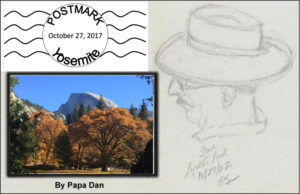
“It is easier to feel than to realize,
or in any way explain, Yosemite’s grandeur.”
— John Muir
“What a treasure to pass on . . .
(but make sure you bring your lunch).”
— PapaDan
Click here to download a PDF of this post:Yosemite, October 17, 2017
= = = = = = = = = = = = = = = = = = = = = = = = = = = = = = = = = = = = = = = =
Yosemite, October 17, 2017
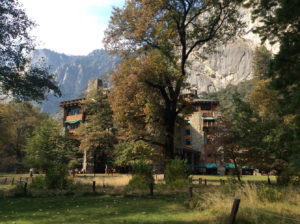 Sitting here in the middle of a meadow, looking up at Yosemite’s venerable Ahwahnee Hotel, it seems different in some way. Since you probably know some of the history of this place, you may ask with raised eyebrow and derision in your voice “Aw-come-on-now, what could possibly be different?” You might point out a few things like: the iconic stone-and-wood edifice in front of me has looked pretty much the same since it opened in 1927; the granite mountain, El Capitan, to the left of this view has looked much the same for, oh, 50,000 years or so; and the squirrels and blue jays who live here have been scurrying and squawking like this since the glacier melted — so, what could possibly be different?
Sitting here in the middle of a meadow, looking up at Yosemite’s venerable Ahwahnee Hotel, it seems different in some way. Since you probably know some of the history of this place, you may ask with raised eyebrow and derision in your voice “Aw-come-on-now, what could possibly be different?” You might point out a few things like: the iconic stone-and-wood edifice in front of me has looked pretty much the same since it opened in 1927; the granite mountain, El Capitan, to the left of this view has looked much the same for, oh, 50,000 years or so; and the squirrels and blue jays who live here have been scurrying and squawking like this since the glacier melted — so, what could possibly be different?
I’ll have think about it — you’ve asked a big question that demands a big answer; but I, of course, have a small answer:
—> It’s quiet. Nearly silent, actually. THAT’S what’s different.
Gretta and I come to Yosemite every April, for our anniversary, and one thing is a constant — Yosemite Falls is always flowing with its usual vigor. The sound is not merely of running water, but of chunks of ice and fragments of logs from the high country crashing down on the rock formations between the peak of the falls and the valley floor. All of that — plus the constant rushing of the water — creates a polyphonic orchestration complete with percussion, and you can hear it everywhere in Yosemite Valley from Half Dome to El Capitan to Glacier Point.
But, in October (for our second yearly visit), North America’s tallest waterfall is completely dry.
And silent. And, the silence of October is more noticeable than the sound of April. 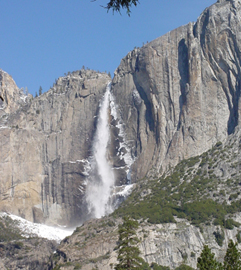
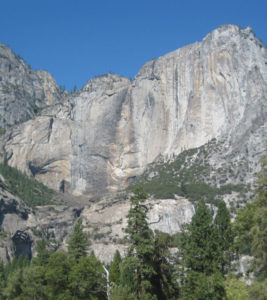
Upper Yosemite Falls (April) Upper Yosemite Falls (October/Dry/Silent)
But, before I claim that everything else around here is permanent, I come to realize that much has changed, and is changing all the time. Some of it matters, and some doesn’t.
The Water
• The water that feeds the Merced River from the opposite side of Yosemite Valley, across from Yosemite Falls (see the images below), originates at the granite dome of Liberty Cap, thunders down at Nevada Falls, sits awhile in the Emerald Pool, rumbles down at Vernal Falls, and ends up meandering through the valley floor in the Merced River. As the seasons change, that river trickles between the boulders at its low point here on October and then swells to a wide, white-water torrent in April. So, at least that much changes; but a wise observer might point out that all of this ebb and flow, the meandering and the raging, the silence and the music of the falls form a never-ending constant cycle in their seemingly eternal alternation between the extremes of life in this valley among these mountains. Yosemite has been here a very long time — longer than the life-span of humans on this planet — and the forces at work here seem to be eternal; BUT those forces are carving a work of art. Each time you look, if you are paying attention, it never looks quite the same as it did the last time you looked.

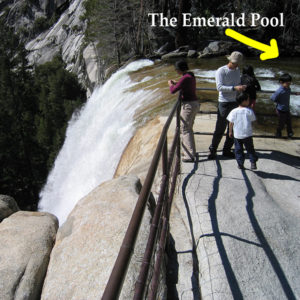

Nevada Falls Top of Vernal Falls/Emerald Pool Vernal Falls
The Granite
• Today, El Capitan slopes at a slightly different angle since last month when a slice of granite the size of an apartment building cracked and crashed down on one of its outcroppings and scattered giant boulders, many the size of automobiles, around its base. Rock falls happen all the time in Yosemite but they are seldom fatal (as this one was) and often not especially noticeable — unless you consider that this entire valley and its surrounding mountains were carved and shaped over thousands of years in precisely this manner. So, Yosemite changes its shape pretty much everywhere you look and pretty much all the time.
The Colors

The colors speak for themselves. BUT, some of us have tried to speak for them — and maybe overdone it in the attempt, or not – like our old friend Mark Twain who tries to give us a glimpse, in words, of trees in the fall that change “from green to red, from red to green, and green to gold. The tree becomes a very explosion of dazzling jewels; it stands there, the acme, the climax, the supremest possibility of art or nature, of bewildering, intoxicating, intolerable magnificence. One cannot make the words too strong.” Or so he said.
Twain’s words appeared in the New York Times in 1876, not as evidence of change, but as evidence of permanence — describing something that has been repeated every year since long before humans were here to observe it. And here, now, in Yosemite, we see it once again.
Trivial Change
Now, if we’re going to make a list, some things HAVE changed here in Yosemite, just in the decades we have known it; but those are caused by humans and, therefore, less important:
• The Ahwahnee Hotel has been renamed The Majestic Yosemite Hotel. Why? — because the previous management of the hotel claims to “own” the name “Ahwahnee” after a coupla decades of association with it. The silliness of that view comes to light when you consider that the hotel was named for the Ahwahneechi Tribe who were associated with this part of the valley since about 600 years ago — long before the United States National Park Service granted a contract for restaurants and hotels (OK, long before the United States existed). So, Gretta and I still call it by its rightful name — The Ahwahnee Hotel.
• The Ahwahnee cocktail lounge, which used to serve excellent food all day long, now serves, well … OS (i.e., other stuff). We tried it for breakfast this time … I didn’t know it was possible to screw up yogurt and granola, but now I know. It has been our habit to enjoy a cocktail and tasty appetizers here in the late afternoon. The “cocktail” part endures as it should but the “tasty appetizer” notion is missing. It also used to feature a delightful piano player in the evening (he played everything from classics to smooth jazz to show tunes to classic rock — request almost anything, he knew it). Now the piano is gone to make room for three more tables and a sound system plays, well … OS.
• The Ahwahnee main dining room used to be a 5-star restaurant that attracted outstanding chefs. Now it is just a lovely high-ceilinged, grand building with an OK restaurant surrounded by breath-taking views, pouring from a mediocre wine list, and serving … well, you know, OS. It isn’t even the best restaurant in this valley.
• Oh, and there’s Degnan’s Deli, which used to be an ideal spot to interrupt a day of hiking by ordering a hand-made sandwich, salad, or soup, crafted with fresh ingredients. Now, it is dominated by a display case full of pre-packaged “gas-station-sandwiches.” And they’ve innovated: you can stand in line to order and pay using computerized kiosks and then stand in another line to pick up your order. This “innovation” succeeded in eliminating four employees who used to make your lunch to order from fresh ingredients and take your money at enough cash registers to avoid standing in line. You can still sit at their outdoor stone tables looking up at a stunning view of Glacier Point, but … my recommendation is that you bring your own lunch. Yes, it’s changed.
So, now I’ll stop whining
and tell you why we must continue to return here twice a year.
We come back for the many wonderful things that remain the same here in Yosemite Valley. Here are a few of those in the words of some of our friends:
• Words from Teddy Roosevelt: “There can be nothing in the world more beautiful than the Yosemite … and our people should see to it that [it] is preserved for their children and their children’s children forever, with [its] majestic beauty unmarred.”
• Words from John Muir: “Climb the mountains and get their good tidings, Nature’s peace will flow into you as sunshine flows into trees. The winds will blow their own freshness into you and the storms their energy, while cares will drop off like autumn leaves. As age comes on, one source of enjoyment after another is closed, but nature’s sources never fail.
• John Muir again: “It is easier to feel than to realize, or in any way explain, Yosemite’s grandeur. The magnitudes of the rocks and trees and streams are so delicately harmonized, mostly hidden.”
• Frightening words of warning from NYT columnist Nicholas Kristof: “I can’t help thinking that if the American West were discovered today, the most glorious bits would be sold off to the highest bidder. Yosemite might be nothing but weekend homes for internet tycoons.”
• Words from Robert Redford: “I spent two summers working at Camp Curry and at Yosemite Lodge as a waiter. It gave me a chance to really be there every day – to hike up to Vernal Falls or Nevada Falls. It just took me really deep into it. Yosemite claimed me.”
• Words from Dave Brubeck: “I used to take my mother to Yosemite. When got my driver’s license, that’s where she’d want to go, so I’d go take her there for two weeks.”
• Words from John Garamendi: “Maybe you weren’t born with a silver spoon in your mouth, but like every American, you carry a deed to 635 million acres of public lands. That’s right. Even if you don’t own a house or the latest computer on the market, you own Yosemite, Yellowstone, the Grand Canyon, Golden Gate National Recreation Area, and many other natural treasures.”
• Words from Ansel Adams: “Yosemite Valley, to me, is always a sunrise, a glitter of green and golden wonder in a vast edifice of stone and space.”
• More from John Muir: “During my first years in the Sierra, I was ever calling on everybody within reach to admire them, but I found no one half warm enough until Emerson came. I had read his essays, and felt sure that of all men he would best interpret the sayings of these noble mountains and trees. Nor was my faith weakened when I met him in Yosemite.”
• And, finally, from PapaDan: “Some years, one or more of our sons bring their families up here during the same week we visit, and we have the privilege of taking our grandchildren to the bank of the Merced River (below, left) or up to the base of Yosemite falls (below, right) and watch them enjoy the spectacle in amazement. What a treasure to pass on to the next generation!”
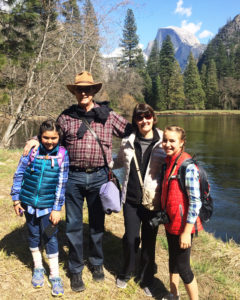

We’ll be back in April!
If you’re interested, click to take a look at a previous post on this topic:
“Of Permanence, Change, and a Sense of Wonder“
A Gratitude Attitude
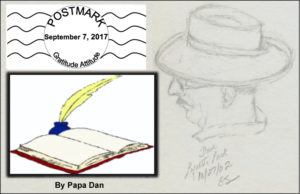
“Thank you, God, for this good life and forgive us if we do not love it enough.”
— Garrison Keillor
“On the off chance
that you won’t live forever,
maybe you should try to be happy now.”
— “Network News” (HBO)
Click here to download a PDF of this post: ConVivio_Gratitude_FINAL_Sept7_2017,pdf
= = = = = = = = = = = = = = = = = = = = = = = = = = = = = = = = = = = = = = = =
Let’s admit it — Americans are having quite a lot of anxiety these days. We could list the reasons, but they are in the news every day; and it is not my intention to trouble you with all of that. I’m thinking that we may have something more useful to do today. I grew up in a generation that acquired the confidence, or at least the suspicion, that we, collectively, have what it takes to solve difficult problems and improve our lives and the lives of others. We have been taught to believe that we can make a lot of progress — in economics, technology, and society. I will speak for myself and say that I was taught to believe in that progress by my parents, teachers, and leaders. For me, that body of belief is summarized in the distinctly 21st-century assertion:
“Yes, we can.”
But, today, we’re not so sure. Such optimism is feeling more and more like hard work.
That “dampening” of our collective self-confidence seems to have happened in a relatively short time. I suppose that uncertainty leads me to look back on my education for an alternate strategy. Just thinking out loud here — I was taught that “despair” was a personal failure. So, “giving up” was not acceptable. I was also taught that lashing out in anger against things I don’t like is not what reasonable, thinking, feeling humans should do. (I was taught that standard by observing what happened to the bully on the fifth-grade playground, when Sister Bernadette hauled him off to the principal’s office when he got too pushy on the tetherball court.) Also, somewhere in my Jesuit education back in the early 1970s, I recall hearing the saying:
“God, grant me the serenity to accept the things I cannot change,
courage to change the things I can, and wisdom to know the difference.”
This is part of what is known as “The Serenity Prayer” written by an American theologian named Reinhold Niebuhr back in the 1930s and passed on to me in a lecture by a Jesuit professor, Father Tennant Wright, at Santa Clara University in 1971. It is typically offered as a prescription for happiness in “the next life” if we accept hardships and trust in God. My observation, however, — at the urging of that same professor — suggested to me that we have opportunities, and responsibilities, to make a difference in “this life” that should not be ignored.
So, what does it mean? Is there a way to bridge the gap between “Yes, We Can” and “Serenity?” Can that “bridge” have some effect on the current anxiety I mentioned?
The Physiology of Gratitude
Really?! Physiology? OK, so I stumbled on a chapter in a book called “The Gratitude Diaries,” by Janice Kaplan. At first glance, as I saw it on the library shelf, I expected it to be mostly about talking yourself out of feeling bad. But, as I looked into one chapter — you know how you grab a book off the shelf and open it to a random page to see what’s inside — I discovered something else. On page 179, I found some very mundane and familiar medical science associated with stuff like bacteria, the body’s immune response to bacteria, the functioning of neurotransmitters, and how white blood cells swarm to the site of an infection and attack the problem by “gobbling up bacteria.” In doing that, the white blood cells leave behind inflammation, which can become dangerous in itself. You knew that; BUT scientific studies aimed at understanding inflammation have uncovered some unexpected and intriguing connections.
So, here’s the really interesting part — turns out that the immune system doesn’t ONLY respond to “germs,” it may also respond to emotions. Kaplan reports that a couple of researchers at Johns Hopkins University and Georgetown’s National Institute of Mental Health observed that worry, anger, or fear activates those same white blood cells. Even though they don’t have anything specific to attack, they leave a trail of dangerous systemic inflammation.
–> Long-story-short — one conclusion from their studies: expressing gratitude could actually inhibit that systemic inflammation effect and prevent our immune systems from causing our bodies to react harmfully to fear and worry.
“A sad soul can kill you quicker, far quicker, than a germ.” — John Steinbeck
SO, the anxiety many of us are feeling about the bad news all around us can actually do physiological damage and inhibit our ability to cope with the world, to make good decisions, and to experience happiness. People are beginning to notice. Friends of mine tell me that they have been trying to avoid watching “the news” because they don’t like the way it makes them feel. Turns out that the intentional expression of gratitude for the goodness we see around us and the people who bring it to us — in place of focusing on the troubling news — can demonstrably counteract those very real effects on our health. The operative word for this effect is healing.
The Gift of a ‘Gratitude Attitude’
Let’s admit it — we have much to be grateful for. The very fact that today’s news is disappointing confirms that we have experienced better; we have been exposed to good people doing generous and kind things for us and for others, both locally and elsewhere. We have enjoyed periods of relative stability and we have survived hard times, both individually and collectively. While we have endured troublesome people (you know who they are), we have also enjoyed people who have lifted us up and brought us kindness when it was needed (and you know who they are). In fact, there have been times when WE have BEEN those people for others. Science tells us that there are positive physiological effects of intentional gratitude; AND we have seen that serving as an example of gratitude to others can make a difference for us all.
“At times our own light goes out and is rekindled by a spark from another person. Each of us has cause to think with deep gratitude of those who have lighted the flame within us.”
— Albert Schweitzer
Heck, some of you have done that for me — and you know who you are — so, thank you.
Obligations?
So, if we acknowledge that focusing on “the bad news” can do real harm, does that knowledge carry with it obligations to each other — and to those who come after us?
If future generations are to remember us more with gratitude than sorrow, we must achieve more than just the miracles of technology. We must also leave them a glimpse of the world as it was created, not just as it looked when we got through with it.
— Lyndon B. Johnson
I have to acknowledge that my generation brought us to the “bad news” state we are in. Some might suggest that this conundrum — the apparent tension between “Yes, We Can” and “Serenity” — strains our impulse to resist the “bad news,” and by resisting, risk allowing that resistance to dominate our daily lives. Shouldn’t we resist? Isn’t that part of the “Yes, We Can” confidence we were taught to have?
Let me suggest that it is not a cop-out to say we must do both — simultaneously. I agree with the urgency of resistance — staying informed of the paths our nation is traveling, putting ourselves in a position to make a difference, contributing to organizations that can help those who are harmed by the “bad news,” and supporting those who want to push progress forward (yes, we call them “progressives”). At the same time, the science suggests that we must support each other by offering our “Gratitude Attitude” wherever we can. I must remind myself, in spite of my disappointment with “the bad news,” that I have a good home in a good community, a family full of successful and talented grown children and smart and curious grandchildren, and a wife who shares my gratitude and appreciates “us.” I have friends who demonstrate their gratitude for the goodness they have and for the time we spend together. I enjoy hearing their expressions of gratitude for their own good lives. I submit that we have an obligation to share our expressions of gratitude with the people in our lives — the people we know well and those we meet along the way. They need to hear our gratitude just as much as we need to hear theirs. OK, it’s hard to do both things at once — to “resist” while also maintaining a “gratitude attitude.” But we must, because …
“Yes, we can.”
America’s Great Anniversary Festival
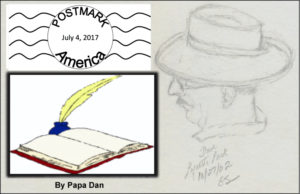
“It ought to be solemnized with Pomp
and Parade, with Shows, Games, Sports,
Guns, Bells, Bonfires and Illuminations
from one End of this Continent to the other from this Time forward forever more.”
— John Adams, July 3, 1776
Click here to download a PDF of this post: The_Fourth_2017
= = = = = = = = = = = = = = = = = = = = = = = = = = = = = = = = = = = = = = = = = =
From a letter from John Adams to Abigail Adams, July 3, 1776
 “The Second Day of July 1776, will be the most memorable Epocha, in the History of America. … I am apt to believe that it will be celebrated, by succeeding Generations, as the great anniversary Festival. It ought to be commemorated, as the Day of Deliverance by solemn Acts of Devotion to God Almighty. It ought to be solemnized with Pomp and Parade, with Shows, Games, Sports, Guns, Bells, Bonfires and Illuminations from one End of this Continent to the other from this Time forward forever more. …You will think me transported with Enthusiasm but I am not. — I am well aware of the Toil and Blood and Treasure, that it will cost Us to maintain this Declaration, and support and defend these States. Yet through all the Gloom I can see the Rays of ravishing Light and Glory. I can see that the End is more than worth all the Means. And that Posterity will tryumph in that Days Transaction, even altho We should rue it, which I trust in God we shall not.”
“The Second Day of July 1776, will be the most memorable Epocha, in the History of America. … I am apt to believe that it will be celebrated, by succeeding Generations, as the great anniversary Festival. It ought to be commemorated, as the Day of Deliverance by solemn Acts of Devotion to God Almighty. It ought to be solemnized with Pomp and Parade, with Shows, Games, Sports, Guns, Bells, Bonfires and Illuminations from one End of this Continent to the other from this Time forward forever more. …You will think me transported with Enthusiasm but I am not. — I am well aware of the Toil and Blood and Treasure, that it will cost Us to maintain this Declaration, and support and defend these States. Yet through all the Gloom I can see the Rays of ravishing Light and Glory. I can see that the End is more than worth all the Means. And that Posterity will tryumph in that Days Transaction, even altho We should rue it, which I trust in God we shall not.”
OK, so John got it sorta wrong. He figured that America’s “Great Anniversary Festival” should be celebrated on July 2nd, the day the unanimous vote was taken in the Second Continental Congress in Philadelphia. But, since July 4th was the day the Declaration of Independence was printed, distributed, and read on street corners throughout the colonies, and, well, that was the date at the top of the paper, so … here we are.
Happy Fourth of July!
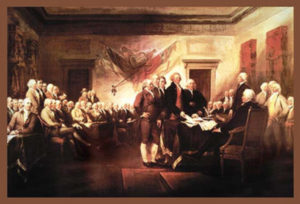
And there’s the famous John Trumbull painting of the ceremony in which the members of the Second Continental Congress signed the declaration on July 4th –> nope, that didn’t happen either. Most members signed the paper on August 2nd at the Pennsylvania State House. Some signed on other dates. The New York delegation was given permission to sign the document by their legislature on July 15th (since NY had abstained on July 2nd). Some signers hadn’t been elected to Congress yet in July.
But, OK, the document we have today (a copy is framed over my workbench) has 56 signatures and it’s dated July 4, 1776. Done and done. A result, at least, of some powerful storytelling.
Happy Fourth of July!

Today, July 4, 2017, we celebrate what has been called “The Great Experiment in Democracy on the North American Continent.” We’ve been working at this experiment for 241 years and it
has required a tremendous amount of sacrifice and quite a lot of very serious compromises,
some we can be proud of, some not so much.
The signers of the document, rich, white, male property owners (many slave owners) with much to lose, pledged to support the declaration with “our lives, our fortunes, and our sacred honor.” The late eloquent American journalist Paul Harvey (Presidential Medal of Freedom, 2009), tells the stories of what those signers had to do to support that pledge. Give it a look; much of it is true and all of it is moving.
https://www.youtube.com/watch?v=SRSHA7F3mIw
———————
So, how’re we doin’?
America had a population of 2.5 million in 1776 — today we number about 326 million — and each of us has a role to play. The challenge of representative democracy as it has come down to the latest generation of Americans has required an evolving recipe of leadership and followership. We expect our leaders to represent us well on national and international stages; we judge them every day on their ability to make us proud, keep us safe, and promote the values we claim to believe in. We, in turn, ask each other to support those values as we exercise what the Declaration of Independence enshrined as our “inalienable rights”: “Life, Liberty, and the Pursuit of Happiness.” Our common expectation, or hope, is that we will find ways to pursue those inalienable rights without stepping on the rights of others; AND we agree that our government will protect the ability of each of us to exercise those rights — or at least not stand in our way.
So, what do we do if we find ourselves disappointed with the outcome of those agreements
– disappointed with the “great experiment in Democracy” on this continent, in our town, in our neighborhood? And, let’s be frank, we often — often — find ourselves disappointed in our leaders, our fellow citizens, and at times, perhaps, even our own contributions to that agreement. What do we do? What should we do? What is expected of us when we expect more? Truth is, few of us will be required to give what the signers of the declaration had to give, as Paul Harvey described; some will, but relatively few. What is our responsibility when we decide that our leaders do not represent our values and ourselves the way we expect? Is it sufficient to carry signs in crowds that express our disapproval? I think most of us believe that more is expected. After all, we’ve got it pretty good, most of us. What’s the line in the book — “Of those to whom much is given, much is expected.” Does the legacy passed on to us by our, largely immigrant, forebears require some effort to carry on the values that were passed on to us?
The closer we look at our history — as we do when we watch the musical play “Hamilton” or “1776” on our theater stages — we find that the founders were, for the most part, fairly ordinary, imperfect people. Not granite statues. Sort of like the rest of us but, perhaps with greater ambition and maybe some particular talents that got them into positions of responsibility. Maybe they did something when they saw a need. Maybe their motives were good, maybe not. Many of us decide: “I think I can find ways to contribute, but they don’t seem sufficient.” For many, on both sides of a number of challenges that we face, we want something to change. I don’t have the wisdom or talent of those who have risen to positions of leadership over our lifetime; but I can recognize some of that wisdom when I see it. I recall many words of wisdom that have been passed down to me — all the way from “nothing to fear …” to “ask not …” to “ask why not,” but, for today, these come to mind: “we must be the change we seek.”
So, here we are. How do we “become the change …” ? I’m not sure any of us can make it happen by ourselves. In honor of “America’s anniversary festival,” we’ve got to figure it out together. Time’s a wastin’ …
For further reading: https://www.nytimes.com/2017/06/30/opinion/fourth-of-july-stephen-fry.html
![]()
And Yet, Optimists Speak
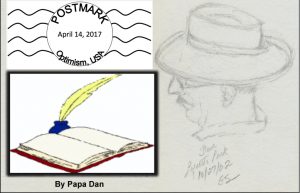
—————–
“In case you thought
optimism was dead,
the average pencil
is seven inches long
with just a half-inch eraser.”
— Robert Brault
—————–
—————–
—————–
—————–
Spoiler alert —–> Yes, it turns out that I am an optimist. Honest. Really. Maybe you are, too?
These days, such a label often elicits an insulting response, such as “How can you be an optimist? Aren’t you paying attention? Everything is going to hell in a handbasket. Just open the newspaper any day of the week.” Or “Anyone with experience knows better than to expect the future to be better than today.” Or “Right, an optimist, but I bet you look both ways before you cross the street, don’t you?”
My father was an optimist and I acquired that attribute from him. In fact, believe it or not, when he was an insurance agent back in the 1950s, he was actually the president of a club of other businessmen in town, called “The Optimists Club.” They had an “Optimist’s Creed,” which they recited at meetings. (Yes, they actually had meetings.) He was an optimist in earnest. As a successful businessman who had not completed the eighth grade and was the son of an illiterate immigrant, it was actually part of his experience to expect positive surprises.
The Optimist Creed was in a frame on the wall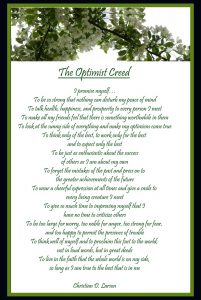
in my Dad’s office
<– <– <– — it looked like this
Why do I remember this? Back in the late
1950s, my Dad kept his office open until noon
on Saturdays; and sometimes he took me to
the office with him. I’d sit in the back of the
office and jam up the adding machine. (I think
I was supposed to be watching him in action
and developing an appreciation for the
insurance business. His plan was to hang a
sign outside that would say “And Son” and I
would one day take over the business.) But,
my actual accomplishment was to jam up the
adding machine. But I digress … why did I
bring this up? Oh yes …
A friend of his, Jerry Bassett, also a member of the Optimist Club, had a call-in talk show on the local radio station (KKIS in Pittsburg, CA). On those Saturday mornings, the show was playing on the radio in the office. One day, Jerry wasn’t getting enough callers; so, he called my Dad during a commercial and told him “I’m dying here, Al. Can you call me up with something interesting to talk about? Whuhduhyuhsay?” So, my Dad took the framed “Optimist Creed” off the wall and called him back.
I was stunned. There was my Dad, sitting at his desk, telling Jerry Bassett about the Optimist Club and why it meant so much to him. He actually read the Optimist Creed over the phone and I sat there and listened to my Dad on the radio — with the confusing five-second delay — talking about what it meant to him to be an optimist. Apparently, others called in and wanted to talk about it; so, I guess it sorta saved the show for Mr. Bassett.
For me, a ten-year-old sitting in my Dad’s office on a few Saturday mornings, while I didn’t acquire an interest in the insurance business, I did develop an appreciation for the idea of being an optimist — just by watching, listening, and observing how people responded to him.
I learned over time from my Dad and from my own observation, that being an optimist meant a number of different things to him and to others. As I read the news and listen to what people say about it all, I grant you that it requires some effort to be optimistic these days (I’m sure I don’t have to tell you that); but it seems that many of us have different views of what that might mean. So, let’s explore some of the different meanings people attribute to optimism — borrowing some words from a few others — and then, let’s try to figure out what it might mean to us to be an optimist today.
Let’s ask around. It seems there are different kinds of optimists.
The Delusional Optimist
This is a guy who falls out of the top floor of a ten-story building. As he passes the floors on his way down (the ninth, then the eighth, the seventh, etc), he says to people on those floors as he flies by on his way down: “I’m doin’ OK so far.”
This is the optimism that gets the most disdain from “realists” who are paying attention to the news (maybe you and me). This delusional optimist doesn’t get a lot of respect. He’s just wrong. In reaction to this rosy view of a harsh world, some pessimists call themselves realists and seek comfort by lowering their expectations:
The ‘Optimism’ of Lowered Expectations
“A pessimist? That’s a person who has been intimately acquainted with an optimist.”
— Elbert Hubbard
Some of us go to great lengths to avoid being called a fool. A pessimist makes clear that the world can be a bad place for real people; and asserts that a fool is someone who thinks it can be otherwise. Others, like Winnie-the-Pooh’s friend Eeyore, try to solve the problem by keeping their expectations low:
“It’s snowing still,” said Eeyore gloomily.
“So it is.”
“And freezing.”
“Is it?”
“Yes,” said Eeyore. “However,” he said, brightening up a little, “we haven’t had an earthquake lately.”
― A.A. Milne
The Patient Optimist: Two versions
“Everything will be okay in the end. If it is not okay; it is not the end.”
— John Lennon (I bet you thought somebody else said that first, didn’t you?)
This is the classic belief that, at some time in the future, something better will happen if you just wait for it.
Lin-Manuel Miranda portrays Aaron Burr as a different kind of patient optimist in ”Hamilton, the Musical.” Burr and Alexander Hamilton are both orphans who have an opportunity to impact history. Burr waits cautiously for the chance to fulfill his destiny in a very tough world and resents Hamilton’s more confident approach. He sings to the audience, “Wait For It” (click here to hear the entire song):
Life doesn’t discriminate between the sinners and the saints,
it takes and it takes and it takes
We rise and we keep living anyway, we rise and we fall and we break
We fall and we make our mistakes.
and if there’s a reason I’m still alive when so many have died,
then I’m willin’ to-
Wait for it …
Wait for it …
In the same show, Hamilton — expecting much more than waiting, says to Burr …
“If you don’t stand for something, Burr, what will you fall for?”
― Lin-Manual Miranda
Hamilton doesn’t respect those who are reluctant to risk making a commitment to something greater than themselves — a criticism he leveled at Aaron Burr, early in their fatal “rivalry.” Burr, wary of commitment, was held back by a feeling that ‘making a difference’ might be futile — or dangerous. In our own time, this very year, some of us fear that the prospects for a positive future are so bleak that there is no point in trying and the challenges we face are too big for us to make a difference. But there are optimists among us who remind us that it is too early to give up and we are pretty useless if we do:
The Resigned Optimist (aka the “No Other Choice” optimist)
“For myself I am an optimist. It does not seem to be much use to be anything else.” ― Winston S. Churchill
And then, some among us feel that we all have some responsibilities to those who will come after us:
The Burdened Optimist (aka “The Future has its eyes on you”)
“There is some good in this world, and it’s worth fighting for.”
― J.R.R. Tolkien
“The future belongs to those who give the next generation reason for hope.”
― Pierre Teilhard de Chardin
And then, some take that responsibility deeper, especially during difficult times (like war):
“Lest I keep my complacent ways, I must remember somewhere out there a person died for me today. As long as there must be war, I ask and I must answer ‘was I worth dying for?’ ” ― Eleanor Roosevelt
Ouch. Eleanor insists that we need to be worthy of the sacrifices others made for us. That brings us back to the need for a plan to make something better and the need to follow through with that plan. Optimism, of this variety, requires action since positive change doesn’t happen by itself. So, in order to avoid being called a fool, a person would have to make something better. You can’t just wait for it. So, this optimist must be bold and forceful, like this guy:
The Determined Optimist (aka “Just try and stop me”)
“My optimism wears heavy boots and is loud.” — Henry Rollins
The determined optimist has to make a show of it and get some attention. But then, that begs the question: ‘What are you actually going to DO to justify all of that stomping around? What are you going to accomplish?” What is worth the risk of being disappointed or being called a fool? From time to time, this brand of optimism can be sufficient, but not always. Some simply take a practical approach and compare optimism to a fruitless alternative:
The Confident Optimist (aka “Look, we know how to do this”)
“Pessimists are usually right and optimists are usually wrong but all the great changes have been accomplished by optimists.” ― Thomas L. Friedman
So, the need to accomplish something rears its (ugly/beautiful) head:
“One thing we know beyond all doubt: Nothing has ever been achieved by the person who says, “It can’t be done.” ― Eleanor Roosevelt, You Learn by Living
“BE the change you wish to see in the world.” ― Mahatma Ghandi
Like Eleanor and Mahatma, some notable optimists in our own time insist that despair is not helpful and we need to take responsibility to encourage others. You know this guy:
“The only thing that’s the end of the world is the end of the world.”
“Yes, we can.” ― Barack Obama
Not all of us are going to run for office, speak to an audience of millions, and change the world. For many of us it may have to be enough to serve as a good example to encourage others — our children, their children, people we meet — to BE the change that is required. Maybe all it takes is a few words of encouragement to younger minds — maybe words like “Yes, we can.” It turns out that some outcomes are possible even if we haven’t seen them before.
The “Who’s Going To Stop Me” Optimist (aka “What do you mean it can’t be done?”)
“Sometimes you have to pass through the fire swamp to get where you need to go.”
“But, we’ll never survive.”
“Nonsense. You’re just saying that because no one ever has.”
— William Goldman, The Princess Bride
Is it often difficult to distinguish the “Delusional Optimist” (you remember, the guy falling out of the building) from the “Who’s Going to Stop Me” optimist, but the difference matters. Many optimists are occasionally intimidated by the enormity of great challenges — finding that important things seem to require great effort, by a great many people. But some wise people suggest the opposite approach: taking small steps in the company of just a few people:
The “Incremental” Optimist
“The secret of getting ahead is getting started. The secret of getting started is breaking your complex overwhelming tasks into small manageable tasks, and starting on the first one.” — Mark Twain
“A year from now you will wish you had started today.” -Karen Lamb
“A small group of thoughtful people could change the world. Indeed, it’s the only thing that ever has.” – Margaret Mead
“Thou hast seen nothing yet.” — Don Quixote de la Mancha (Cervantes)
It turns out that some outcomes are possible even if we haven’t seen them before. Some look at the mixed advice we hear and get discouraged by disappointing outcomes — but some don’t.
The “Maybe this time” Optimist
One thing seems essential — that we do not settle into the extremes of “always” and “never” — that we find an optimism based on the idea that, sometimes, good outcomes are possible. Sometimes. This poem by Sheenagh Pugh reminds me that, whichever variety of optimist I decide to be, on a particular day, there is reason to believe in positive outcomes. They don’t happen by themselves, they do require our efforts, but they happen … sometimes.
And that may be enough. I may be this kind of optimist …
Sometimes
Sometimes things don’t go, after all,
from bad to worse. Some years, muscadel
faces down frost; green thrives; the crops don’t fail;
sometimes a man aims high, and all goes well.
A people sometimes will step back from war;
elect an honest man; decide they care
enough that they can’t leave some stranger poor.
Some men become what they were born for.
Sometimes our best efforts do not go
amiss; sometimes we do as we meant to.
The sun will sometimes melt a field of sorrow
that seemed hard frozen: may it happen for you.
— by Sheenagh Pugh
Sorting Out the Voices
So, what have I learned from all of these voices? My Dad taught me about “sometimes” as his Dad taught him. The other side of “sometimes” is that sometimes we need to stomp around and be “The Determined Optimist,” and march in the street with other determined optimists. Sometimes the best we can be is “The Resigned Optimist” and simply try not to give up. Sometimes we are forced to be “The Patient Optimist and “Wait for It.” Sometimes we can see a middle path and serve as a “Confident Optimist” and contribute to incremental change by contributing to organizations that can accomplish important changes with lots of small donations (examples: organizations like the ACLU, Planned Parenthood, PBS, The Yosemite Conservancy, Meals On Wheels, your local library … you probably have your own list.) Those among us with more imagination and determination may find ways to “Be the change we seek.” Perhaps our task, if we can’t BE one of them, is to support those who do.
![]()
Click here to download a PDF of this article: Optimist_ConVivio_April14
A Guy Walks Into a Bar
Sandburg— 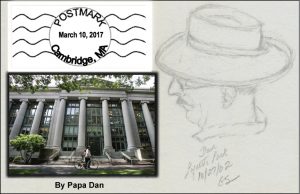 “You teach yourselves the law
“You teach yourselves the law
but I train your minds.
You come in here with a head full of mush,
and you leave thinking like a lawyer.
But … it may not be enough.”
— Professor Charles W. Kingsfield
from “The Paper Chase”
(a movie set at Harvard Law School in 1973)
Sandburg
+++++++
+++++++
Walking down Massachusetts Avenue, on his way back to his fraternity, a first-year law student found himself in the middle of an unexpected downpour without an umbrella. As luck would have it, he was passing a popular watering hole frequented by Harvard Law students and professors. From habit, he mentally acknowledged the weird fact that The Grafton Street Pub & Grille was actually on Massachusetts Avenue; but it was forgiven for its convenient location right beside Harvard Square. Gratefully, he ducked into the dark, leather-appointed bar, since he was clearly unprepared for the inclement conditions outside. He calculated that the storm was likely to continue for just as long as it would take to sit down at the bar with a class of “Maker’s Mark,” and he could be on his way once conditions had improved. Not a bad way to pass the middle of an otherwise worthless afternoon.
Apparently, others had the same idea — the place was packed. In fact, there was just one empty barstool, at the end of the bar next to an older well-dressed gentleman — probably a professor, he reasoned. So, he took his place, and signaled to the barkeep: “Makers’ Mark neat, please.”
As the drink arrived with a bowl of nuts, the gentleman to his left cast a sidelong glance at him without turning his head, “I see you were unprepared for the forecast.”
“Well, I didn’t think …”
“So I surmised,” he said without letting him finish.
“Well, sure, uh, cheers … sir.” He figured he might as well pass the time with some idle conversation. The guy seemed rude but harmless. Start with flattery. “I haven’t seen you in here before. Are you a visiting professor?”
“Visiting? I suppose one could say that. I’ve been away a very long time.”
“My name is Hart. Kevin Hart.” He extended his hand, a courtesy that was not returned. Maybe he didn’t notice, he thought. “Where have you been so long?”
“Well, young man … “ and he finally turned to look at him directly. “I don’t suppose you’ve read any Dante.”
“The Inferno?”
“Il Purgatorio. On my way up and out, hopefully, but it seems I need to pass through here first. Unfinished business, perhaps.”
Kevin didn’t quite know what to make of this. He decided to humor him. No need to be rude; and who knows, he may find himself in this fellow’s classroom one day. “What do you teach?”
“Contracts. Or so I did at one time. Clearly with less success than I had hoped.”
“I had Professor Warren for Contracts. Pretty straightforward, I thought. You say, ’With less success’ than you had hoped … Why do say that?”
“Leaving the impression of ‘pretty straightforward’ doesn’t speak well for a course of that complexity; but I have to say that the evidence suggests that I didn’t do much better. As far as I can see, the notion of ‘Contracts’ hasn’t been well-assimilated in this society. I suppose Harvard Law, AND I, have some responsibility for that failure.”
“Well, [defensively] it seems that Harvard Law has made some significant contributions, wouldn’t you say? I mean, a number of Presidents have come from here. That would seem to suggest at least some success. Obama came from here, as did both Roosevelts and Kennedy … ”
“And both Adams’,” [he makes a face], George W. Bush [sighs loudly and takes a deep drink of his whiskey], Rutherford B. Hayes [his eyes roll] … but I’m quite sure that isn’t the ideal figure-of-merit for an institution that purports to make a difference in society. There are elements of the law — especially contract law — that seem to have fallen into disrepair of late. Not sure Harvard Law, or any educational institution up and down the spectrum, can be proud of that.”
“Well, I feel the need to speak up for my school, I think I am receiving a quality education, yes, in Contracts, and other areas.
“Go ahead. [For just the second time, he turns to look at Kevin directly.] Defend your school. Tell me about Contracts.”
Now he’s on the spot … it feels like an oral exam. He waves to the bartender and points at the two empty glasses on the bar to order another round. He begins. “Written contracts are perhaps the most forceful self-managing tools in our society. We have well-established norms that are clearly enforceable and fairly efficiently litigated. Binding contracts between known entities, signed and witnessed, are … “ [He’s interrupted.]
“Let me ask you, Mister, uh …” [gestures his question as the second round of whiskeys arrives]
“Hart. Kevin Hart.” [Deflated a bit, he was just getting started.]
“Mister Hart. As you teach yourself the law, as ‘straightforward’ as you say it is, perhaps there are questions worth exploring that you, and others of recent generations, may have overlooked. Examples: Are contracts binding only on those present for, as you say, the ‘signing and witnessing?’ Must the specifics of societal agreements be written on a piece of paper? Are there responsibilities by which one generation, for example, should be held accountable to another generation? Are there values, principles, and expectations that should provide continuity and social identity in a society over time?”
In a familiar professorial speech pattern, he doesn’t wait for an answer. “I argue that there are standards of acceptable logic and quality thinking that have historically been accepted, and expected, that have all but disappeared from public and private discourse. Standards for the assumption of truth and accuracy were practiced in my day without the necessity of challenge. I assert that Americans have a collective responsibility to understand how our institutions work and to pass that understanding on to generations that follow us.”
Kevin recognizes the pedantic behavior. “My grandfather told me about a professor who said something like that to him — something about teaching himself the law — he was a tough old bird. He used to ask questions that sounded simple but tangled grandpa in knots. Said the guy made him lose his breakfast one morning.”
Kevin took advantage of a pause while both of them sipped from their glasses. He tried consciously to extricate himself from the feeling of sitting in a lecture hall and the urgent need to be taking notes; but to no avail …
“So, young man, to answer the question that is likely to be on your partially trained mind, I do feel some responsibility, shared though it is with the rest of American education and upbringing, for the fact that the quality of American decision-making has demonstrably diminished in recent years, wouldn’t you say? You pointed out that Harvard Law provided a list of American presidents, albeit of mixed quality, along with other prominent decision-makers and thought-leaders; but I assert that Harvard Law is now contributing more professionals to Wall Street that to the halls of government [rolls his eyes again.], which is not exactly a feather in its cap. I also assert that the current abominable level of intellectual application that has created your current societal disorder is the product of abysmal application of educational principles. The Socratic method of instruction, which I grew up with and which I employed during my career, is useless on an audience without the prerequisite skill in logic, knowledge of factual precedent, means and ends, and the ability to recognize and apply common sense. The absence of those attributes, among both educators and members of society writ large has led to some dismal decision-making. I read your newspaper this morning and could not believe what I was reading. It sounded like a poorly written comic novel.”
Kevin was feeling the need to say something to avoid assenting to the lecturing nature of this conversation; so, “I agree that my country has made some terrible decisions at all levels, in the halls of government, in the voting booth, as well as on the street — heck, I came out today without an umbrella, that’s what brought me in here. But I am in law school to prepare myself to do something useful — to be part of a solution. So, professor, what is your plan to mitigate all of that? You suggest that you have some responsibility to admit and some damage to repair. So, what’s your plan? Have you come back to Harvard simply to admire the problem and confess your culpability, or do you offer a solution?”
For a third time, the professor turns to address the student directly. “I have two answers. First is to attack the crisis in Civics Education. The problem is not just my complaint about Harvard Law School, the deficiency exists at all levels of education. Among the American population, knowledge of the three branches of government, how they work, why they matter, how they balance and check each other is at the lowest point in our history. Even those appointed to the highest levels of government service seem to have a dangerously unrealistic understanding of the scope of a president’s power. Equally lacking is our understanding of the importance of the news media as the backstop to protect against egregious mistakes. A public figure while I was still at Harvard Law, Daniel Patrick Moynihan, famously taught us: “Everyone is entitled to their own opinions but they are not entitled to their own facts.” America has made serious mistakes in our history, but our strength has always been in learning from them and trying not to repeat them. Right now, I warn you, because of the ignorance of our institutions coupled with an inability to recognize facts, there are serious mistakes that you will have to make, and learn from, all over again. Some of those mistakes are beginning to happen right now. Education is the only way to avoid doing that and it’s not going to be a quick fix.
“My second solution is you.” He pauses for effect, keeping his eyes on the student while he drains the last of his whiskey. “I think the best thing I can do is to turn this responsibility over to you. I’ve given you enough to proceed on your own. You have said that you plan to graduate and fulfill some dream of making a difference. We’ve identified some fields you can plow in that effort. Perhaps the challenge can be met in the field of education or rhetoric, or maybe you will be the eighth president to come from this institution. That rests squarely on your shoulders. So, now that I’ve assigned the problem to a qualified student, I think I’ve spent enough time here.” He gestures grandly at the inside of the Grafton Street Pub. “I claim that I have fulfilled the requirements of Dante’s ‘Purgatorio.’ I’m going to call it done. Let’s agree that it’s your responsibility now. Thank you for the drink and try to stay out of the rain. I wish you well Mister . . . what was it?”
“Hart. Kevin Hart. And you, professor? I didn’t catch your name.”
“Kingsfield. Charles Kingsfield.”
Click here to download a PDF of this post: Guy_walks_into_a_Bar_Mar10_2017![]()
For those interested in the need for an improvement in Civics Education in America,
a national initiative with that goal has come out of the Second Circuit of the Federal Court system.
It’s called “Justice for All.”
Take a look here: http://justiceforall.ca2.uscourts.gov/
And It’s Still Just February
Sandburg— 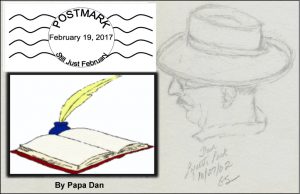
Sandburg
Sandburg
“Five hundred twenty-five thousand
six hundred minutes.
How do you measure a year
in a life?”
— from “Rent”
Sandburg
+++++++
+++++++
Some Years Stand Out
I recently wrote a piece asking “What kind of year was 2016?” Some of you participated by contributing to ConVivio’s “Thirty-Word Challenge” and sent me your assessments of how 2016 will lead to 2017. You sent me some great words. (Take a look: https://convivio-online.net/looking-back-at-2016-ahead-to-2017.) Maybe though, the bigger question is … what difference does a single year make? Is 2017 going to be just a detour or will it be a major turning point?
Over the course of my 66+ trips around the sun, some years stand out in memory — some were good, some bad, and some were turning points in the flow of history. During the first half of the 2017 Super Bowl (while the Falcons were still blowing out the Patriots), I was sitting with an enlightened friend of mine (I’ll call him Judge Danny) and somehow we got to talking about years. At halftime, the TV commentators were talking about other Super Bowl blowouts, like the 49er destruction of the Broncos (55-10) in 1990.
PapaDan: 1989 was a memorable year, too. The 49ers beat the Bengals…
Judge Danny: Then there was the 1989 World Series with the Giants and A’s…
PapaDan: I don’t want to talk about it. [Changing the subject] That was also the year the Berlin Wall came down, and revolutions popped up all over Eastern Europe.
Judge Danny: Right…the end of the Cold War.
From sports we segued to “most momentous years.”
PapaDan: 1969 — Armstrong walked on the moon…
Judge Danny: And returned home. 1963 was unforgettable. It hurt bad. I was thirteen.
PapaDan: Yes, it hurt. 1964 was better, the Beatles and lots of great music. And 1951 was a huge year in baseball. Growing up, I read all about Bobby Thompson’s “shot heard ‘round the world.” Russ Hodges went crazy: “THE GIANTS WIN THE PENNANT! THE GIANTS WIN THE PENNANT!” 1962 was another good year for the Giants, less dramatic but a big thrill.
Judge Danny: I remember; but those were just baseball, right?
PapaDan: Right. So, in our lifetime, what do you figure was the most important year of all?
Judge Danny: We’re the same age, right? We both graduated in 1968. That was the biggest year since we’ve been around. Don’t you think?
PapaDan: Wow. Yes. No question about it. 1968 was a turning point.
We were interrupted by the second half kickoff and the subject of the “most important year” didn’t come up again — we were too busy bemoaning the collapse of the Atlanta Falcons. The next morning, though, after depressing myself with the newspaper, I decided that Judge Danny had been right — 1968 was the single biggest turning point during my lifetime, both for me and for America. There was a lot going on during several years of the turbulent sixties. But 1968 stands out. The title of an important research project on the subject said it well:
“The 1968 Project — A Nation Coming of Age.”
What did we see on the Evening News in 1968?
It was a year of “just one damn thing after another.” President Lyndon Johnson began the year with his State of the Union Address noting that “Our country is challenged at home and abroad,” and the challenges began immediately. One week later, North Korean patrol boats captured the Navy intelligence ship “Pueblo” within their 12-mile territorial waters, initiating a dangerous year-long international crisis. Then, a week later, the Vietcong launched the brutal “Tet” offensive; massive numbers of troops poured out of the jungles and devastated dozens of cities and towns. The surprise invasion of the U.S. Embassy in Saigon and sudden large-scale deaths of American soldiers quickly turned public opinion against the war. Two days later, Richard Nixon declared his candidacy for president. The following week, the Pentagon announced the largest one-week casualty figures of the war and Walter Cronkite, having just returned from a tour of the battlefields, reported that the best America could expect in the war was “a stalemate.” In the White House, President Johnson said privately, “If I’ve lost Cronkite, I’ve lost Middle America.”
–> All that, and it was still just February.
As the year unfolded, the news continued to surprise and distress a lot of people.
— March 12: Senator Gene McCarthy nearly defeated the sitting president of his own party in the New Hampshire primary. Four days later, Senator Robert Kennedy withdrew his support of President Johnson and announced his candidacy.
— On March 31: President Johnson, overwhelmed by anti-war pressure, announced, “I shall not seek, and I will not accept, the nomination of my party for another term as your President.”
— April 4: one week after leading a march in Memphis that turned violent, Dr. Martin Luther King, Jr., was shot and killed while planning his “Poor People’s March on Washington,” sparking riots across the country. Robert Kennedy, hearing of the murder just before giving a speech in Indianapolis, stood up at a street corner and gave an emotional extemporaneous eulogy — pleading with the mostly black audience “to tame the savageness of man and make gentle the life of the world.”
— On April 29, the musical “Hair” opened on Broadway, dramatizing powerful social and political change and a “generation gap” between those who were coming of age in 1968 and their parents’ generation.
— May 6: In Paris, 5,000 students marched in what was soon called “Bloody Monday,” the most violent day of a student revolt. Sympathetic strikes involved nine million French workers.
— June 5: Robert Kennedy won the California Presidential Primary, a victory that all but assured him the party’s nomination. Minutes after his victory speech, he was assassinated.
— July 24: at the Newport Folk Festival, singer Arlo Guthrie performs his 20-minute ballad “Alice’s Restaurant” to rave reviews. (“You can get anything you want, at Alice’s Restaurant.”)
— August 8: The Republicans nominated Richard Nixon to be their presidential candidate.
— August 20: The Soviet Union invaded Czechoslovakia with 200,000 troops.
— August 26: The Democrats nominated Hubert Humphrey for president. Outside the convention, protests erupted and Chicago police arrested nearly 200 people and sent more than 100 others to hospitals with “night-stick” head injuries.
— September 7: “Women’s liberation” groups protested at the Miss America contest in Atlantic City. While nothing actually burned, the phrase “symbolic bra-burning” was coined.
— October 12: The Summer Olympics opened in Mexico City, boycotted by 32 nations to protest South Africa’s participation. Two U.S. medal winners in the 200-meter dash, gave the “Black Power” salute during playing of the Star-Spangled Banner at the medal ceremony.
— November 5: On Election Day, 31,770,000 (43%) voted for Nixon. 31,270,000 (42.7%) voted for Humphrey. 9,906,000 (13.5%) voted for George Wallace.
— November 14: On “Turn In Your Draft Card Day,” young men across the country burned their draft cards and protested the Vietnam War.
— December 12: Robert and Ethel Kennedy’s eleventh child, Rory, is born.
What was it like for those of us watching all of this?
For me and others born in dead-center in the 20th century, 1968 was a singular turning point. We were “The Class of ’68” at Antioch High School. Except for the stories Walter Cronkite told us on The Evening News, the future looked bright. Like most of my high-school friends, I lived in a bubble of stability and certainty. High school was good for me — I got good grades, I played varsity sports, and in May I was accepted to the college of my choice (Santa Clara University). I had a supportive family who encouraged me every step of the way, and I was surrounded by friends who were a lot like me. But 1968 was also the year I got my first look at discrimination, major disappointment, and local cruelty.
Racial Discrimination
I started kindergarten in Antioch in 1955 and it took me until I started high school to notice that there had never been ANY black students in my school or anywhere in my town. The first black kids I met were on the basketball court when Antioch High played Pittsburg High.
That year, Antioch’s foreign exchange student was a girl from South Africa. Apartheid was still in full force there and I remember hearing her speak proudly about “separate but equal.” It didn’t sound right to me.
Then came “the big story.” The parents of a student two years behind me (class of ’70) had moved to Antioch at the beginning of the school year. As new arrivals, they were visited by the city’s “Welcome Wagon” and given a basket with various household products, advertisements for local stores, and advice about the town. The “Welcome Wagon” greeter assured this new family that “This is a nice town full of nice people. And don’t worry, you won’t find any blacks here — the realtors and landlords in town make sure of that.” The new neighbors didn’t like that at all. They asked around and found that others had heard the same thing. Long story short, they filed a class-action lawsuit that gave Antioch an apparently well-deserved reputation for racism. I was stunned — discrimination in MY town!
Optimism, Disappointment, Cruelty, and Regret
Before midnight on June 5, 1968, I went to bed happy. I had turned off the TV following Robert Kennedy’s victory speech after winning the California Primary. “Let’s go on to Chicago and win there,” he concluded. It was one of the last three “school nights” before my graduation on Friday. I was a huge fan of the Senator — my father passed on to me that we were “Roosevelt/Kennedy Democrats.” I wanted very much for RFK to become president and pick up where his brother had left off. I figured Bobbie would end the war (and, therefore, the draft), support the civil rights legacy of Dr. King, and … well … save us from Richard Nixon. In the morning, I was still in bed when I heard my mother come back from retrieving the newspaper and heard her shout, “Turn on the television!” I jumped out of bed and turned on the TV to hear that Robert Kennedy had been shot right after delivering that victory speech. I stared at the TV and cried. I was 18 years old and I cried, hard.
Numb, I went to school. Some kids were stunned, a few were visibly upset, others hadn’t yet heard the news. It was the talk of the hallways by noon. After lunch, I walked into my Journalism class and found one student crying uncontrollably at her desk. She was known to be an extremely sensitive girl and prone to emotional displays. A few kids made it their business to try to protect her from bullies who made fun of her. Before the teacher arrived and before I realized what was happening, a jerk named Michael, one of those bullies who sensed weakness and attacked for the fun of it, went up to her and announced, “Those Kennedys got what they deserved. I say it’s about time. There’s just one left, and we’ll see about him.” She knocked over her desk as she ran sobbing from the room. Michael strutted as he followed her out the door. I quietly righted her desk and walked away as other students began to arrive.
This incident compounded the darkness I was feeling — darkness that got a lot worse before it got better. It took me some time, perhaps mid-summer, before the regret set in. I had never actually punched anyone in my 18 years (or since); and if I had punched Michael, nothing would have gotten better. But I have to say that the single greatest regret that endures all of these decades since my high-school days is that I didn’t do or say ANYTHING. I was the witness to something harmful done to a vulnerable person … and I didn’t do anything.
Moving into a New World
Graduation was fun. It made me feel that the future was bright. But as summer warmed up, I became aware that the “bubble of stability and certainty” that I had lived in was disappearing. I was moving out of a comfortable home and leaving behind a school and a town where I had known sort-of everybody. I realized that I would be surrounded by strangers. So, come September, I had moved into the dorm (with the help of my sister), and life began anew. Shortly after that, my roommate looked at me one day and declared, “A guy’s got to have some hair” and before I knew it, I had grown a mustache that I would have for the next forty years.
College was great! There was terrific music everywhere (that most of our parents hated). Judy Collins performed a concert in my cafeteria my first month at school. Later that year, I spent a weekend with my oldest home-town friend in his dorm at the University of San Francisco; and we saw a free concert with The Jefferson Airplane in the Golden Gate Park Panhandle, (We even got “busted” by the dorm prefect … for drinking beer. Yep, beer.)
Down the hall in my dorm, was Dan Pastorini, our quarterback (a future NFL star) and the cheerleaders were all guys. (Huh?!) Professor Misselbrook inspired me with Robert Frost and Shakespeare, Dr. Bellotti taught my first (and last) Economics class (I had applied as an Econ major), and Dr. Nyquist, the Music Department chairman, stimulated a lifelong interest in Baroque music (who wouldda thunk?). But still, who was I? Where was I going? Would I end up taking over my Dad’s business (the plan) or become a teacher, writer, or something else? How soon would I begin to feel at home … again? As the year ended, the newspaper continued its drumbeat of scary stories — 549,000 troops in Vietnam and a death toll of 17,000, the highest in the war’s history. The day I drove home for Christmas, the “Pueblo,” was finally released. I admit I didn’t notice either story. Suddenly, all of the worldwide uncertainty that I had heard on The Evening News all year, didn’t seem as important as the turning point I was experiencing as an 18-year-old college freshman on my own. I had much to learn about myself and the world around me.
Back to “the future”: 2017
So, fast-forward nearly 50 years. Here we are in 2017, trying to make sense of a year that seems to change every day. In just a month, the leader of the free world:
— Spread a series of “alternative facts” that advisors repeated and the world knew to be false,
— Initiated a potential constitutional crisis and caused chaos world-wide at airports, cities, and universities with an executive order to ban immigrants from seven countries, an order that he said had been implemented “smoothly” until it was blocked by a “so-called judge,”
— Sent a young “senior advisor” out to threaten judicial authority on the Sunday talk shows and clarify that “the powers of the president to protect our country … will not be questioned,”
— Told the Mexican president that he might send troops into his country to “take care of” some of his “bad hombres”; that same day he hung up on the leader of Australia,
— Insulted a long-term African-American congressman and civil-rights icon on the Martin Luther King holiday, calling him “all talk, talk, talk” and calling his hometown of Atlanta a “crime-ridden hellhole,”
— Promoted a political strategist (former Breitbart executive) to the National Security Council, and demoted the Director of National Intelligence and Chairman of the Joint Chiefs of Staff,
— Installed a national security advisor who had an inappropriate/illegal, back-channel relationship with America’s most dangerous adversary, then fired him for it, and blamed his firing on the news media for spreading fake news (“the information was real but the news was fake” and “I didn’t direct him to do it but I would have if I thought he wasn’t doing it.”),
— Responded to accusations of mental instability by saying “I comprehend very well, OK, better, I think, than almost anybody,” and observed that, in his chaotic first month in office, his administration was a “smooth-running machine.”
Commentators, writers, readers, listeners, citizens, others (you know, you and me) are asking questions like these: What’s true and what’s not? How do we know? Who is “we” and who is “they?” Do the things we’ve learned over a lifetime still apply to the present moment? To the future? And most important, what can we do to make sure this year is only a detour and not a turning point?
–> And it’s still just February.
Click here to download a PDF of this post: ConVivio_Just_February_Feb19_2017
— Major thanks to Gretta for good advice and to Lauren for her expert editing —![]()
How Lucky We Are …
 Carl Sandburg—
Carl Sandburg—
Orville Wright1
“Look around, look around,
look how lucky we are
to be alive right now.”
— Eliza Schuyler (from Lin Miranda’s “Hamilton”)
Carl Sandburg
… to be alive right now
These days, like so many others, I am immersed in “Alexander Hamilton.” The musical play has been all the rage — a roaring success on Broadway and now it’s coming to San Francisco! So, in our house, we have been listening to the brilliant hip-hop soundtrack; reading Ron Chernow’s biography of Hamilton (which inspired the musical); reading Lin Miranda’s script and commentary about the creation of the show; AND, yes, we have tickets to the show in May.
When I first heard about the show, I admit to being skeptical — a Broadway musical about the first U.S. Secretary of the Treasury (“the ten-dollar founding father”) set to “hip-hop” music (What is ‘Hip-Hop’? I asked). But once I heard the soundtrack and felt the spirit, I have become a convert. The music and lyrics combined with our founding story and spirited characters are nothing short of thrilling. At its core, “Hamilton” is a classic story of a poor immigrant who showed up at a critical time and made a powerful contribution to American history. In a useful lesson for today’s leaders, he did it by acknowledging his ignorance and educating himself. It is also a story devoid of a ‘Disneyland’ ending (spoiler alert: the hero, the former Secretary of the Treasury, gets killed in a duel by the sitting Vice President of the United States, Aaron Burr, at the dueling ground in Weehawken, New Jersey in 1804, no foolin’).
Twenty-eight years before their duel, as they prepared to join forces in the revolution, Burr gave Hamilton some advice:
“Talk less. Smile more.
Don’t let them know what you’re against
or what you’re for.”
And then, more to the point, in a much faster rhythm:
“I’m with you, but the situation is fraught.
You’ve got to be carefully taught.
If you talk, you’re gonna get shot!”
In the summer of 1776, Hamilton and Burr met in New York as the revolution was in full swing. It was an exciting time. Eliza, one of two Schuyler sisters destined to fall in love with Hamilton (yes, it’s a love story), sums it up:
“Look around, look around
at how lucky we are to be live right now.
in the greatest city in the world!”
How lucky? The excitement and optimism of the time was swirling all around them:
• talk of freedom and independence was everywhere on the streets of their city,
• revolutionary ideas (including the publication of Thomas Paine’s “Common Sense” in January of 1776) were on everybody’s lips (both for and against), and
• it was a time when young people could step forward and make a difference.
It also had a very dark side.
• War was brewing against an empire with the most powerful army and navy in the history of the world, and winter was approaching.
• Slaves were being bought and sold on the streets and wharves of their own city. Slavery had turned out to be the necessary political compromise among the colonies that made the union possible; so, abolitionists like Burr, Hamilton, and their New England compatriots had to swallow hard to believe that they could bend the future to match their principles, but … later.
• New York harbor would soon be flooded with 260 British Navy warships and thirty-two thousand British soldiers. Thousands of their neighbors would be killed in battles fought in their own towns and farmlands. Many would starve during the harsh winter that arrived with the well-fed British army and navy.
So, while these American patriots were optimists, their optimism came at great cost. The King was determined to show no mercy to his disloyal subjects and reclaim his valuable property on the American continent. In the show, the comically mad King George character sings,
“You’ll be back, soon you’ll see,
Yes, you know that you belong to me.
And when push comes to shove,
I’ll send an armed battalion to remind you of my love.”
These revolutionaries knew that many of them would personally suffer the ultimate cost for securing a future for their descendants. And they did.
To be alive right now
How lucky? Fast forward to now — here in 2017. What about us, you and me: the 21st-century descendants of those wild-eyed optimists? What can we learn from reflecting on their experience and ours? Have we preserved their vision of America? Is our vision of the future as bright as theirs? Are our challenges greater? Do we have reason to be hopeful, right now?
• Today, as 2017 dawns, many of our friends, neighbors, and ourselves are doing pretty well. Most statistics say that, overall, our economy is doing OK; the stock market is soaring. Isn’t it?
• Technology and other 21st-century advancements are improving our lives in exciting ways and many aspects of American life give us reason to believe that the future is bright. Right?
• After eight years of an African American President, shouldn’t race relations be encouraging?
• America has the unique distinction of being the world’s dominant superpower. Shouldn’t the founding fathers, and we, be proud and satisfied with the outcome of our revolution?
We are the heirs of the ideals, the optimism, and the governing principles that those brave folks earned for us, right?
–> So, today, can we repeat what Eliza sings early in Act One of “Hamilton?”
“Look around, look around
at how lucky we are to be alive right now.”
Well, sure. That was in Act One. But, before we romanticize the optimism of the revolution, let’s not forget that Thomas Paine had to publish his famous pamphlet encouraging American independence anonymously (see Aaron Burr’s advice to Hamilton, above). The threat was real.
How lucky? Today, as we read the hard, frightening, depressing news of today and listen to each other talk about it, there are growing fears lurking in our future:
• The news media, long the principal vehicle for ensuring an informed electorate, is threatened with access limitations and credibility challenges,
• Long-held American foreign-policy positions and international alliances are now in doubt, apparently without the careful study and decision-making processes we have come to expect,
• The conclusions of science, long held to be the bedrock of our understanding and the foundation of our policy decisions, are being devalued by those taking the reins of power,
• Progress in securing the safety net for retirement income and health care is threatened,
• Human rights, regarding race, gender, and national origin are being weakened by those who seem to have forgotten our long struggle to eliminate discrimination and inequality of all kinds,
• The long-held bipartisan goal of reducing the nuclear danger is now threatened by new leadership that speaks of pursuing a new arms race,
• The goal of government, to support the well-being of all Americans, is now called into question by those who are lining up to run our government for the benefit of the few.
Optimism, Hope in 2017?
In my own fear of what lies ahead, I am reminded to be confident, but patient – in words that Dr. Martin Luther King, Jr. borrowed from a sermon delivered in 1853 by an abolitionist named Theodore Parker, who borrowed it from others before him:
“The arc of the moral universe is long,
but it bends toward justice.”
But patience, while necessary, is not sufficient. Success — as illustrated by Hamilton, Parker, King, and others — is reserved for those who work actively to bend that arc. Those words were used, not at the end of successful struggles but at the beginning of hard times, when success seemed unlikely. Even when we think we’ve made progress, we do not always complete that progress without the inevitable detours. If I try to replicate the optimism of the American revolution, in the face of likely defeat; or try to emulate the hope of abolitionists, in the face bitter compromise; or support the efforts of those pursuing justice, in the face of bigotry; I conclude that 2016 must be considered a detour. It doesn’t have to be a reversal of our progress or an abandonment of the path we thought we were pursuing. We can make it into a detour – but we need to find our way back to that path. The administration of Donald J. Trump is not the end of this story nor the name of a new path to the future; it must be identified as the name of a detour.
OK, I apologize. I thought I could avoid using his name, but I decided that we must name the challenge if we are going to defeat it. We must not speak of Trump like Voldemort (“He-who-must-not-be-named” or “The Dark Lord”) in Harry Potter. The ideas he represents must be faced head-on, opposed, and defeated before we get too far off the path we were on and lose our way. So, as we approach the 2017 inaugural address, let us recall the words of the first inaugural address I watched, from a time in my youth, characterized by more optimism and confidence (and patience) than we might be feeling today:
“All this will not be finished in the first one hundred days.
Nor will it be finished in the first one thousand days . . .
nor even perhaps in our lifetime on this planet.
But let us begin.”
— John F. Kennedy, January 20, 1961
So, now the real work begins.
Along with that work comes some frustration. Those of a certain age remember marching on college campuses and engaging in political action to bring important American values into the light of day — values, among others, like these: equal justice and opportunity under the law, women’s health and reproductive rights, racial integration and civil rights, and decisions about America’s use of military force and the draft. Those battles were successful, in their day. The disappointment, and the reality, is that they must be fought all over again.
So, today — what will it take?
Remember: we know how to do this.
• Some will welcome those who are not welcome, in their own communities.
• Some will contribute time and dollars to help those who will suffer during this detour.
• Some will join movements to influence votes.
• Some will march, when the need arises.
• Those with influence — teachers, lawyers, bartenders, parents, grandparents, neighborhood leaders (you know, you and me) — may find a way to encourage compassion, common sense, and unity in small places among those who will take over when we are gone.
We know how to do this. Let’s start. (The forces on the other side have already started.)
“The only thing necessary for the triumph of evil is for good men to do nothing.”
— Edmund Burke (and others) ![]()
Click here to download a PDF of this article: ConVivio_How_Lucky_to_be_alive_right_now
Thanks to Lauren De Vore for her Editorial advice.
Looking Back at 2016 — Ahead to 2017
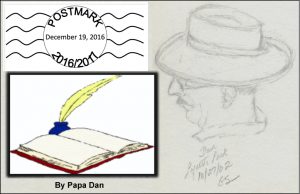
“How wonderful it is
that nobody need wait a single moment
before starting to improve the world.”
— Anne Frank
“The nation which can prefer disgrace
to danger is prepared for a master
and deserves one.”
— Alexander Hamilton
“Yes, we can.
— Barack Obama
2016/2017
Carl Sandburg
What Are Your Feelings About 2016 and Your Outlook for 2017?
(Your responses to the writing challenge: 30 words or less)
Of the fifty-some people who read ConVivio’s “2016” post, ten of you responded to its
30-word writing challenge. I admire the variety of approaches you took: some with a broad national perspective; others with observations focused on their own lives; some optimistic, others not so much; some were quite poetic.
Thanks to everyone who sent a response. Here they are:
==========================================
Overcome the recentness bias this year? I think not.
The election’s outcome could affect us for decades.
Color me cynical and sad for this fine country.
— Katie Walter, Stockton, CA
2016: The rotting corpse of the Democratic Party hopefully saw the error
of moving to the right.
2017: As Daniel said on the series finale of Rectify, “I’m cautiously optimistic.”
— Steve Rubio, Berkeley, CA (typepad.com)
I’m ready to fight against climate change and Trump’s agenda.
— Sonia Faletti, Washington D.C.
Working on myself as an active participant — How can I be more present?
How can I be more aware? How can I be a consistent critical thinker engaging with others?
— Matthew D. Sapone, Aptos CA
Incredible year, many “ups,” one YUGE “down.”
Ups: Changed from large stable company to a startup. Excellent decision!
Loving husband, strong family life, great friendships.
Downer: Won’t say his name.
— Nouanepheng Sapone, Aptos, CA
If you want someone to understand (and adopt) your viewpoint,
you must first listen to and understand theirs.
No more preaching to the choir.
— Lauren de Vore, Livermore, CA
The elections were like a pollution cloud, darkening everything.
Now, every day brings new confirmations of how bad 2017 can be,
for our country and the world. We’re worried.
— Megan Taylor, Bellingham, WA
Unexpected atheism explodes into confidence as the rush of information
restores limbic, and age of majority is reached. Zen heart at 80 beats per
minute while ruffian’s words exile paralysis.
— Jody Tims, Morgan Hill, CA
Daughter Srijana: Nepal, 1998, Scott College August;
her new boyfriend Haaroon: wants medical school;
Me: working CDC with fabulous Director Dr. Frieden;
2 dogs, 2 cats;
Me: nervous re. prez.
— Jean Smith, Atlanta, GA
After the events of the last year, I don’t know how anyone can mount a compelling defense for the theory of evolution. Are we really getting smarter and better? Show me.
— Jeannette Gosnell, Livermore, CA
Men often oppose a thing merely because they have had no agency in planning it,
or because it may have been planned by those whom they dislike.
— Alexander Hamilton, New York, NY
Looking ahead, we always think we are smart enough to predict the surprises.
My hope is that we are wrong; and the surprises will not be the ones we expect.
— PapaDan Sapone, Pleasanton, CA
A PDF of these responses can be downloaded here: Thirty_words_Grace ![]()
What Kind of Year Was 2016?
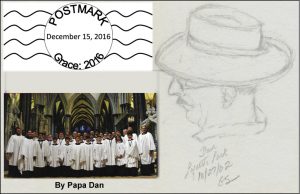 Carl Sandburg—
Carl Sandburg—
Orville Wright
Kitty Hawk, North Carolina
Fall, 1901
If we all worked on the assumption
that what is accepted as true,
is really true,
there would be little hope of advance.
Orville Wright
Carl Sandburg
This time of year, many of us take a moment and ask “What kind of year was this?” Looking back at what I posted on ConVivio at this time last year, the year 2015 was looking pretty grim. Many of us were looking for some encouragement, trying to find an excuse to feel more hopeful. In that end-of-2015 ConVivio post (“Grace”), I described our annual attempt to find some seasonal, yuletide peace, hope, and, well, grace, with the help of Grace Cathedral’s annual Christmas concert of the Men’s and Boys Chorus, Orchestra, and Organ. We followed that same recipe again this year, as we have for two decades.
More on that later.
When we try to look back and decide how we feel about a year, I suppose most of the time we decide that a year was either “terrific,” or “OK” or “terrible” based mostly on how we feel at the moment we are asking the question — near the end of the year. Michael Lewis’ recent book “The Undoing Project” describes the trick that our minds play on us with what he calls the “recentness bias,” in which we are predisposed to use the most recent evidence in drawing our conclusions. We don’t always take into account the entire year. So, I thought — why not try to avoid that “trick” and take a broad look back at some of the things that happened across the entire year and see if we can come up with a reasonable answer. Let’s give it a try and see if it helps. Then, I hope we’ll get to see your answer.
First, the usual stuff that always happens in any year:
The Sundance Film Festival, Super Bowl #50 and Mardi Gras, the Daytona 500, NCAA Final Four, the National Cherry Blossom Festival, the Kentucky Derby, a bunch of Shakespeare festivals, the NBA Finals, the Summer Olympics, the World Series, Albuquerque’s Balloon Festival, and the annual crop of new words entering the our vocabulary— notably: Brexit, Calexit, virtual reality, self-driving cars, fake news … etc. All of that happened as expected.
Second, the “special” stuff that happened in 2016:
In January, an armed militia took over a Wildlife Reserve in Oregon (and dominated the news) for six weeks; we learned that drinking water in Flint Michigan had been poisoning its residents for years; and as the primary elections heated up in March, Hillary Clinton emerged as the Democratic frontrunner causing polls and pundits to agree that her election was all but assured. Two days later, Trump’s campaign was pronounced “doomed” when Mitt Romney called him a “fraud” and a “phony,” saying, “He has neither the temperament nor the judgment to be president.” Well, I don’t have to tell you that … later on … in November … well, you know …
With the coming of a hopeful Spring, marriage equality became a reality in California but also in surprising places like Georgia; the ban on gays in the US military was lifted; and the supposedly paralyzed US Supreme Court struck down a Texas law restricting abortion 5-3. A few large states raised their minimum wage and progress was reported in preserving some endangered wildlife around the world. About that time, Britain did two seemingly contradictory things, perhaps inspired by the 90th birthday of their Queen: they elected the first Muslim mayor of a western city (London) and voted to withdraw from the European Union, reversing a 60-year trend toward European unification.
In June, the Broadway production of Hamilton received 16 Tony nominations, won the Grammy for Best Musical Theater Album, and captured the Pulitzer Prize for Drama
— not bad for a guy of questionable parentage who was killed in a duel 212 years ago.
In two technological triumphs, NASA’s Juno spacecraft entered Jupiter’s orbit after a 1.7-billion-mile, five-year journey to study the planet and a solar-powered plane flew around the world without using a drop of fuel (it took 16 months). Encouraged by the Paris Climate agreement, India reported that 800,000 volunteers worked 24 hours to plant almost 50 million trees on July 11th, beating the Pakistani’s previous one-day record of 1 million set in 2013 — reminding the world that, a month earlier, Donald Trump declared his intention to withdraw the US from the Paris Climate Agreement. (“It’s a hoax. Nobody believes it.”)
Third, some stuff happened that was NOT supposed to happen:
The Cleveland Cavaliers came back from a 3-1 deficit (a historic first), winning their first NBA title by defeating the Golden State Warriors. The National League playoffs between the Giants and the Cubs happened and I don’t want to talk about it. Immediately after that, the Chicago Cubs won the World Series, after waiting 108 years, by beating the Cleveland Indians, who are still waiting after 68 years. (The San Francisco Giants, were supposed to win the World Series this year and I don’t want to talk about THAT either.) Then, Americans elected a president who promised to Make American Great Again by employing a unique strategy … (and we’ve already talked about that too much, haven’t we?) Two weeks later, the Dow Jones responded to doomsday predictions after the Brexit and Trump wins and topped 19,000 for the first time (begging the question “What does it mean?”). Finally, in this “not supposed to happen” category, Gwen Ifill, a longtime PBS News anchor, died at the age of 61. Those who admire real news and respectful discourse mourned.
Finally, two more things happened that mattered to me:
1. I retired from a long career and was given a wonderful party (thank you Jessica & Brytni);
2. The 2016 Grace Cathedral Christmas Concert restored the uplifting and grace-filled themes that have inspired audiences (including Gretta and me) throughout its long and generous history (see https://convivio-online.net/grace/). Grace Cathedral’s musical signature, “Sleeps Judea Fair,” was again reassuring, peaceful, and hopeful — filling that magnificent cathedral with its transformational sound and powerful spirit. The blending of the mature and youthful voices and faces of the men and boys in that chorus, transported us all to a place we came there hoping to experience. The dissonance we heard and felt last December was gone — for now. I must admit that we needed that encouragement to look forward with hope to the year ahead. They came through for us and, for that, I am thankful.
OK, So How Do We Feel About 2016, Really?
Well, now that you’re really annoyed that I left out your favorite “most important” event from 2016 (and I know you were looking for it), it’s time to commit: how do we really feel about the year that’s ending and prospects for the year ahead? Again, I’m trying to avoid that “recentness bias” — you know, trying to ignore the feeling that the events of the past six weeks must completely overshadow our judgement about the whole year and color our anticipation of 2017. The year we’re just now completing suggests the likelihood that 2017 will bring some surprises. So, I offer two things:
One — A Request for 30 words from you: I am asking you (yes, you) to put your thinking hat on (no, not THAT hat) and try to sum up your feelings about 2016 and your outlook for 2017 in 30 words or less and send them to me. It’s a writing challenge — you can do it. Many of you have demonstrated that you are very clever with words. If you take a few minutes and send me your words, I will publish them here on ConVivio (with your name if you give me permission). Thirty words. Can you do it? (Repeat after me: “Yes, We Can.”)
Two — I offer my own 30 words anticipating how 2016 will lead to 2017:
Looking ahead, we always think we are smart enough to predict the surprises.
My hope is that we are wrong; and the surprises will not be the ones we expect.
I wish you all Happy and Hopeful Holidays!
PapaDan Download a pdf of this post: Grace_2016_ConVivio_Final![]()
A Good Man
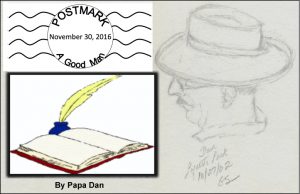
Carl Sandburg—
“The human race has one really effective weapon,
and that is laughter”
Few things are harder to put up
with than the annoyance
of a good example.”
“Forgiveness is the fragrance
that the violet sheds
on the heel that has crushed it.”
— Mark Twain
Carl Sandburg
Occupant
1600 Pennsylvania Avenue NW
Washington DC 20500
January 19, 2017
Dear Sir,
It has come to my attention — well, I guess it’s just starting to sink in — that you are about to leave a job that has kept you constantly in the public eye for the past eight years. While much attention has been focused on the next guy, I was thinking that it would be polite to drop you a note to say . . . well . . . thank you.
People have been talking about the job you did. So, sure, we can talk about that first, if you like; but I have something more important in mind; and we’ll get to that. So, first — how’d you do? Here’s a list of the usual kinds of things — and, as you know, some people consider these successes and others call them failures. You:
- Avoided a deep recession that you inherited when you first showed up for work
- Rescued the US automobile industry
- Ended the US formal combat role in Iraq
- Banned torture and brought Osama bin Laden to justice
- Initiated a program that insures about 20 million people who couldn’t get healthcare
- Appointed Sonia Sotomayor and Elena Kagan to the Supreme Court
- Supported marriage equality
- Initiated heavy investment in renewable energy technologies
- Crafted a multinational agreement to end Iran’s nuclear weapon program
- Led 120 nations to agree to reduce emissions that threaten the worldwide climate
- Opened the US to Cuba
You know, the usual kinds of things. Now, some want to quibble about that list; but as I mentioned, I have something more important to talk with you about.
I want to thank you for being . . . you know . . . A Good Man.
Now, I grant you that being a “good man,” by some agreed-upon definition, has never been a job requirement in your profession. We’ve had lots of the other kind – we seem to vacillate on that score. Over time we’ve had to look the other way on a lot of things. But in your case, sir, we can look you in the eye without being embarrassed.
I admit that all of that economics and foreign policy stuff are all pretty standard for a guy in your profession; but a person in your job has other impacts that are sometimes overlooked. I know it seems like a small thing, but you have had this habit of thinking first before you talk; and after you do that, the things you say come out in complete sentences and paragraphs, which I tend to enjoy. And, when those ideas get translated around the world, those clear sentences can be pretty useful.
I also appreciate that you don’t stomp around and lose your temper, even when they say rude things about you that aren’t true. You seem to have overlooked even the worst of the lies. You don’t seem to get into the “revenge thing” that some others do. I appreciated your comment when some people predicted that the election results were “the end of the world.” You lowered the temperature a bit and quoted Yogi Berra: “I always say that the only thing that is the end of the world is the end of the world.” Even when guys tell gullible people that you weren’t born in the US, I’ve heard you make jokes about it. Oh, yes that reminds me — guys in your profession are not usually good at telling jokes; but you have some real comic timing. I still remember during a debate, Mitt Romney kept making a face and sputtering about “Obamacare” with obvious distaste. You mentioned that it was called “The Affordable Care Act,” but you looked at him and said, “Hmmm. Obamacare, I like it. I think we should call it that.” Even Mitt had to laugh.
I suppose the thing I admire most is that your time on the job featured eight years without a hint of scandal — that’s not normal for guys in your profession. You have been a steady husband and father and have behaved with a combination humor and dignity, even in the face of public insults. Some of us forget that a guy in your job serves as a role model for other people, whether they want to or not, notably for little boys who look around to figure out how grow up to become a man. Other public figures don’t seem to have an eye for that. In your case, we can feel comfortable that little kids might look at you and say to themselves, “I want to be like him.” OK, I know there are those, like Mark Twain, who said “Few things are harder to put up with than the annoyance of a good example.” But, you know, I have grandchildren. I hope they’ve been watching.
So, I want to say ‘Thank You.’ All of that policy stuff is a subject for another day; but today I want to thank you for being a good man on the world stage, personally representing us in a way that made me proud. It’s not mentioned in the news much; but it’s worth a lot to me.
Regards to you and your family,
PapaDan Download a PDF of this post: convivio_agoodman_nov30_2016![]()
Where to? What Next?
My Syllabus
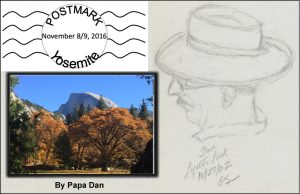
Where to?
Carl Sandburg—
“The people will live on;
The learning and blundering people
will live on.”
“They will be tricked and sold,
and again sold.”
“You can’t laugh off
their capacity to take it.”
— Carl Sandburg
Carl Sandburg
November 8, 2016
As I write this, I am sitting in a chair, surrounded by the spectacular beauty of Yosemite. Looking up from my pen and notebook, the carved granite of Half Dome stands directly in front of me; I can hear the constant roar of Yosemite Falls from my left; and the silent flow of the Merced River drifts downstream ten feet to my right.

Yosemite Falls
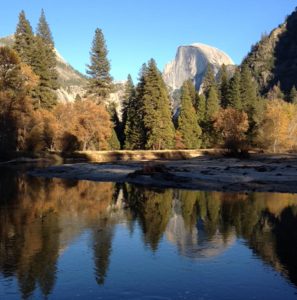
Half Dome

The Merced River
There is a spirit here — a spirit that (or who) inspires big ideas.
Today is a big day. Today is Election Day (outcome yet to be determined); but this piece is not about the election. It is about something much bigger: It is about you and me, you know, America. In the 1830s, Alexis de Tocqueville defined America as “the great experiment in democracy on the North American continent” with grand, historic intentions. And, as I mentioned, America — that is, you and me — is much more than elections; and it is also much more than the good intentions that initiated that great experiment. Henry Ford once famously said, “You don’t build a reputation on what you are going to do” (I read it on my tea bag this morning). We are what we do; and that’s how we must be remembered.
So, what have we done? “We” — that is, America before you and me — built a nation on some important ideas that had been brewing in Europe for quite some time, and “we” applied those ideas in an experiment. “We, the People,” applied them to the lives of some of the people who lived on this continent; allowed lots of people from around the world to come here to participate; and actually welcomed many of them — not all of them, and some more than others. And, while we were doing that, “we” (again, before you and me arrived on the scene) “we” built great things on those big ideas:
- government institutions,
- institutions of justice and law,
- practices in support of banking and commerce,
- transportation systems,
- foundations to encourage the arts and sciences,
- technology to change the world over and over,
- systems to enable a historic level of prosperity,
- traditions for how we treat one another,
- and much more.
Along the way, we fostered an adventurous spirit that expanded the great experiment — America — across the length and breadth of the continent and, by doing all that, we built a reputation that influenced the lives of people around the world.
Yes, that was a lot of doing on which to build a reputation.
Now, granted, the expansion across the continent incorporated/appropriated a lot of land and resources that had for a long time ‘belonged’ to other people; and, granted, the prosperity we created was made available to some of us and not others; and the worldwide influence America wielded resulted in both good and ill; BUT …
Here we stand today — standing on the shoulders of giants (well, OK, some of them were giants and some of us made it to their shoulders). Nevertheless, here we stand, here in the twenty-first century, you and me. We are the heirs of what has been passed down to us and the stewards of all that America IS.
So, now that American IS you and me (yours and mine), what have we done? And what are we doing?
Remember, this is NOT about the election, honest, I promised. Besides, we haven’t actually had the election yet — voting is still in progress cross the land as I scribble these words here beside the river; but we have been doing some things as stewards and owners of America — “We the People,” collectively — that really do define the time in which we live and the variety of experiences that we are all having. Those of us who read and listen have been hearing a lot of the details by which the news media keeps score of how we are doing:
- more people are employed today than were working a year or two ago,
- the average income of Americans has increased gradually in the past year or two,
- the stock market, although fluctuating with the news cycle, is at an all-time high,
- our achievements in science and technology are breathtaking,
- there are more students attending American universities than ever before,
- and much more.
AND, as has always been the case, America and its institutions face more dramatic and difficult challenges than ever before:
- the benefits of American prosperity are shared unevenly, with more wealth at the top and more people at the bottom;
- people less fortunate need more help than ever;
- in spite of historic advancements by people of color throughout our society, more violent incidents of racial animosity are reported in the news almost every day, many of which include deadly encounters between law enforcement and minority citizens.
One observation every American seems to agree with is that “we” are more divided ever.
Technology enables our social interactions to be instantaneously and widely distributed — that’s both the good news and the bad news — allowing us to instantly distribute far and wide the most beautiful and the most vile ideas. We try to use that capability to help us discuss the collective decisions we have to make; and then we have elections — like today.
A famous line, attributed to several of our forebears reminds us that:
“Democracy is that form of government in which the people get the government they deserve.”
As we wait for the results of today’s election, we might well ask, what do we deserve? Whether we like it or not, I suppose we will see the answer to that question in the election returns. Will we all agree that we deserve what we get? Perhaps we will look to those who have gone before us for guidance. We have been warned about what we might deserve.
Thomas Jefferson: “I tremble for my country when I consider that God is just.”
So, do our forebears teach us what to do when we are disappointed? On that subject., one of the most important speeches of our time is remembered by only a few. After losing his challenge of the results of the Florida vote count (he lost by 533 votes) in a decision by the U.S. Supreme Court (on a 5-4 vote), Al Gore reminded us, on December 13, 2000, of the longstanding importance of the peaceful transfer of power:
“Let there be no doubt, while I strongly disagree with the court’s decision, I accept it. It has been resolved as it must be resolved, through the honored institutions of our democracy.”
This week, Al Gore spoke to a ‘get out the vote’ rally: “Every vote counts. Trust me on this.”
So, after listening to the rhetoric over the past few weeks, can we be sure that wisdom passed down to us about the ‘peaceful transfer of power’ will prevail at the end of this day?
So, how’d we do? Tomorrow will tell the story.
November 9, 2016
This morning, we took a walk from Yosemite Lodge across Cook’s Meadow to the bridge on the Merced River. A woman pointed up at a tree, “Look,” she said, “an American eagle!” Sure enough. There he was, perched high in a tree, his large white head turned to one side of his dark torso the way we always see him when he plays his role as the symbol of our nation. Question: was he here to bring a message of encouragement to us up here in the mountains or did he come here to escape what had happened down in ‘the world below?’ OK, silly question — he LIVES up here in the mountains and doesn’t much care what happens down in ‘the world below.’ But for us, the symbolism was strong.

An American Eagle
OK, so we learned what had happened yesterday down in the world below. It was a shock, to say the least. Some were asking, can we survive this? But, as I said, this piece of writing is not about the election. It asks the question – in light of where “we” have been and what we have done to get where we are today, what are we supposed to do now? Regardless of which way the course of human events takes us, what are our responsibilities going forward? Can “We the people” (you know, you and me, America) survive and prosper even when we make big mistakes and when things don’t go the way we had hoped?
Fortunately, there are optimists among our forebears who reach out from their own difficult days to offer hope to us in ours. Carl Sandburg is one of those. Below are words from his poem about what “the people” do in times of crisis.
The People Will Live On — Carl Sandburg, 1936
“The people will live on.
The learning and blundering people will live on.
They will be tricked and sold and again sold
And go back to the nourishing earth for rootholds,
The people so peculiar in renewal and comeback,
You can’t laugh off their capacity to take it.
In the darkness with a great bundle of grief
The people march . . . ‘Where to? What next?’ “
We have begun hearing from people who are concerned about the effects of yesterday’s outcome. A friend of mine, seriously depressed about yesterday’s news, told me in an e-mail that she decided that she must do something. Whining about our disappointment is not enough, she reasoned. She plans to volunteer where she might be needed to help mitigate the effects of what happened yesterday. Another friend told Gretta “I don’t know if I can get over this.” Gretta’s answer: “Maybe we’re not supposed to get over it. Maybe we have to accept it and find something we can do to help. People are going to need help.” Others have suggested that it is time to increase our contributions to organizations that can help those who are going to suffer from the news — immigrants, those who will lose their health care, kids in school programs that will be cut, those who receive necessary assistance from government programs threatened by yesterday’s news, those who had hoped that “we the people” would try to mitigate global warming — you know, you and me: America. There are many choices one can make. As a first step, we have decided to increase some of our contributions. These are some of our favorites: The American Civil Liberties Union, The Natural Resources Defense Council, Planned Parenthood, The Sierra Club, and The Yosemite Conservancy. Many other approaches are available — an organization that supports the homeless? A school district, maybe even one in another town? I suspect that we all have ideas to add to that list.
Yesterday, November 8, 2016, “We, the people” spoke in the form of 290 electoral votes; and today, “we the people” have the opportunity to speak in other ways as well.
Looks like some difficult times ahead for a lot of people.
What must I do to help?
What must you?
Download a PDF of this piece: where_to_what_next_convivio![]()
Decades We Have Known
(and one we’re still getting to know)
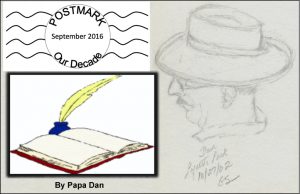
“Yes, here we are
right in the middle of it;
but what should we call it?”
Those of us who went to school around the middle of the 20th century were taught to understand the passing of time in distinct eras, each having its own character and name. For example, the thousand-year period called “The Middle Ages” was a characterized principally by ignorance and short life spans. Following that, it seems, the focus of history narrowed to individual centuries. The 15th century (roughly, 1450 to 1550) is remembered for its intellectual and artistic awakening and discovery and thus called “The Renaissance.” Today, our understanding of distinct definable time periods comes down roughly to decades, both in our education and in popular culture.
So, as I read the news and listen to the pundits of our day, as they attempt to identify the trends of our times, I am driven to ask:
- given the pattern of the decades we have come to know best, what name would a thoughtful person give to the decade in which we live today? How will the 2010-2020 decade be remembered in the years to come?
Of course, since this decade is not finished, our judgments must be preliminary. But let’s give it a try. As a start, let’s review the decades of the most accomplished and truly “American” century of them all, the 20th century.
1900 to 1910 — “The Good Years”
During the first ten years of the 20th century, from an American point of view, the world was mostly at peace. Shirts cost 23¢, but the children who made them earned a mere $3.54 a week. Teddy Roosevelt proposed to strengthen the U.S economy with his Square Deal and sent the U.S. Navy around the globe to introduce the world to the idea of American power. My grandparents, like 3 million other immigrants escaping a crushing depression in Southern Italy, sailed in the belly of big ships from Naples to New York. Last but not least, my father rounded out the decade by being born in Red Jacket, West Virginia on October 10, 1910.
For many Americans, according to a commentator of that time (John Clark), “The future was simple; rewards would go to the virtuous” and Americans perceived themselves to have “the personal material out of which a millennium would grow.” Historians have called this decade “The Good Years” (see Walter Lord’s “The Good Years,” Harper and Row, 1960).
1910 to 1920 — “The End of Empire, War in Europe”
A powerful worldwide upheaval began. In America, much of the population moved to cities and there was a dramatic reduction in immigrants from Europe compared to the mass migration of the previous decade. The world began to see the end of a long-established world order, disintegrated into World War I, and suffered the historically unprecedented destruction and loss of life that went with it. A “new world order” was established once “the war to end all wars” finally … well, so we claimed … ended war itself and, in America, ushering in …
1920 to 1930 — “The Jazz Age” (or “The Roaring Twenties”)
This decade began, inauspiciously, on January 16, 1920 with the onset of Prohibition. It is hard to accept that the alcohol-marinated events of “The Jazz Age” could possibly have begun with a national decision to prohibit alcohol consumption; but as Will Rogers famously said, “Prohibition is better than no alcohol at all.”
Songwriter and philosopher Jacques Brel summed up ‘The Twenties’ this way:
“We must dance because the Twenties roar,
The Twenties roar because there’s bathtub gin,
Vo-de-oh-do and the road to sin,
The road to whoopee and a whole lot more.
Charles A Lindberg, tons of confetti,
Dempsey, Tunney, Sacco and Vanzetti
Black, Black Monday and the market drops
But we keep on dancing, dancing, we can’t stop.”
For many Americans, the party didn’t stop, until …
1930 to 1940 — “The Great Depression”
On the day the Jazz Age ended, the Thirties began: October 29, 1929, with the stock market crash and the beginning of the Great Depression. Unemployment and bread lines became the dominant images. Across the Atlantic, the world darkened further with the growing power of Fascism and Nazism in Europe and the pervasive fear that all of Europe would plunge into war again. The lights went out, virtually worldwide, for the better part of the decade, until …
1940 to 1950 — “World War II, Victory, The Seeds of Prosperity”
The Forties arguably began on September 1, 1939 with Hitler’s invasion of Poland, formally starting World War II. Many Americans, led by Charles Lindberg and other vocal isolationists, insisted that America should stay out of the troubles in Europe and focus on our own economic challenges. While most remember December 7, 1941, as the day that got America into the war, it was actually December 11 – the day that Hitler declared war on the U.S. and Russia. That gave President Roosevelt the clear justification to actively enter the war. The disastrous unemployment of The Great Depression was “solved” with the massive ramp-up of industrial production to support the war effort, which put Americans back to work (although the war killed 60-80 million people worldwide.
1950 to 1960 — “Stability, The Cold War, and Prosperity … for Most of Us”
Looking back as someone born in 1950 into a middle-class community, the Fifties was a period of stability and order, a large-scale expansion of the American middle class, and the re-establishment of a calm and mostly prosperous domestic life for much of America that hadn’t really been seen since the start of the century. A new brand of celebrities like Allen Ginsberg and Maynard G. Krebs introduced Americans to the new vocabulary of “The Beat Generation.” But …
The Cold War started. It began with the Berlin blockade on June 24, 1948, or maybe with the establishment of NATO on April 4, 1950, or perhaps with Joseph McCarthy’s “Wheeling” speech on February 9, 1950. Domestically, the uneven (mostly white) prosperity of the Fifties, coupled with the return to ghettos of many returning U.S. soldiers, the Fifties surely germinated the seeds of the turmoil that burst forth in the next decade.
1960 to 1970 — “The Age of Aquarius”
The Sixties began with a sense of optimism and inspiration epitomized by the election of an eloquent and youthful president, but those hopes were dashed dramatically on November 22, 1963. While the polarization, cynicism, and youth rebellion often associated with the Sixties is traced back by many to the Kennedy assassination, the Era of Rock and Roll as well as much of the colorful wildness and anti-establishment post-Woodstock psychedelia and self-actualization associated with the the Sixties really didn’t come into full flower until the early 1970s. In the middle of the decade, discontent among those who did not benefit from the prosperous “normal” of the Fifties (i.e., African Americans) erupted violently in cities all across America as a reaction against brutal racism and income inequality. Others marched in the streets to protest a war that those who grew up in the Fifties did not understand; once they did understand it, they liked it even less. THAT Sixties was not colorful, prosperous, or peaceful (and 50,000 U.S. soldiers did not come home from that new war).
1970 to 1980 — “The Me Decade”
The Seventies really began on June 17, 1973, even though few people noticed at the time. Five associates of the Committee to Re-Elect the President (yes, known as CREEP) were apprehended while breaking into the Democratic National Committee Headquarters in the Watergate office complex in Washington D.C. In spite of efforts by the president to “make one thing perfectly clear,” one thing led to another and introduced some enduring phrases into the American lexicon: “The Plumbers Unit,” “The people need to know that their president is not a crook,” articles of impeachment, a resignation, and, perhaps most lastingly, the suffix “-gate.” Some would argue that American politics would never be the same. Others argued that “the same” was exactly what it was … and continued to be.
1980 to 1990 — “The Beginning of Fact-Free American Politics”
The Eighties began on January 20, 1981, minutes after the presidency had passed from Jimmy Carter to Ronald Reagan and Iran released the 52 Americans who had been held hostage for 444 days. The decade that followed featured the distortion of American conservatism, from a moderate notion of limited government (actually practiced by Republicans from the 1950s through the era of Watergate) to the excessive expansion of government under the Reagan administration. (Surprised? Look up the numbers – highest Federal budgets per GDP, most Federal employees in history, widespread international intervention, etc.). And all of this took place amid the simultaneous “Small-Government” rhetoric of…well…Ronald Reagan.
1990 to 2000 — “The Best Decade Ever” (so reported by the WSJ and the NYT)
The Nineties were characterized by the rise of multiculturalism, the collapse of the Soviet Union, and the spread of capitalism in that vacuum. In American politics, the Nineties were dominated by a battle between the centrism of the Clinton administration and the politics of personal destruction perfected by the other party, later named RINO by the fictional Will McAvoy of Newsnight (for “Republican In Name Only”). The American economy grew at a strong 4%, median household income rose by 10%, the poverty rate fell from 15% to 11%, the U.S. murder rate declined by 41%, the federal government ended the decade with a budget surplus, the Stock Market quadrupled in value, and the wearing of neckties in offices began to diminish. But,
On the world stage, wars broke out in the Congo, the Persian Gulf, Chechnya (twice), Kashmir, Kosovo, Yugoslavia, Croatia, and Bosnia, to name only a few, and a host of civil wars redrew maps on at least two continents. However, apartheid in South Africa came to an end. The Nineties also featured an unprecedented explosion of the Internet and computer technology (although these advances were soon to be dwarfed by a greater explosion of the Internet and computer technology just around the corner).
2000 to 2010 — “The Rise of Terrorism and The Great Recession ”
The Oughts, the first decade of the 21st century was initiated by the arrival of large-scale terrorism on American soil. This heinous crime was followed by a panicked attempt to combat terrorism through the dismantlement of civil liberties at home and a misdirected military response against a country and a dictator who had nothing to do with 9/11.
Oh, yes, the U.S. had a historic period of anti-intellectualism, manifest in the depletion of education budgets and leadership of a president “misunderestimated” for his lack of interest in intellect, let alone possession of it (stimulating an all-but-forgotten quote from Garrison Keillor: “Who needs a fifty-dollar haircut on a fifty-cent head?”).
The housing finance and stock market investment disaster during the Dubya era sent the U.S. economy into a tailspin. Recession and unemployment were stopped just short of a Depression by an infusion of fiscal stimulus and government regulation (who wouldda thunk it?).
2010 to 2020 — “Whah?”
Well, that brings us to the present decade, of which we stand approximately in the middle and the question that I started with:
• What should we name this decade? More precisely, what are we likely to call it when this decade is done? So, let’s explore what we know about this current decade, so far.
The ?????
- The West’s war against terrorism becomes terrorism’s war against The West.
- The end of “carefree” in America and the avoidance of crowds.
- A generalized paranoia, growing gun ownership, and gun violence.
- A gradual, but dramatically uneven increase in prosperity.
- A decline in the power of labor unions and a decrease in the size of the middle class.
- The re-emergence of racial tension, especially between minorities and law enforcement.
- The maturing of “Fact-Free Politics” and the trend toward “voting against” in which nobody believes fully in the available choices.
• I invite you, dear reader, to send us your suggestions. What should we call this decade we inhabit today? I am interested in your ideas. ![]()
Download a PDF of this post: convivio_decades_sept2016_final
For fun, below is an added bonus for those who, like me, identify decades with music …
The Soundtracks of the Decades
(The most popular songs listed on U.S. Billboard)
The Tens:
When You Were Sweet Sixteen (1900)
Stars & Stripes Forever (1901)
Bill Bailey (Won’t You Please Come Home) (1902)
In the Good Old Summer Time (1903)
Sweet Adeline (1904)
Give My Regards to Broadway (1905)
Yankee Doodle (1905)
Auld Lang Syne (1907)
My Gal Sal (1907)
Take Me Out to the Ball Game (1908)
I Wonder Who’s Kissing Her Now (1909)
Swing Low, Sweet Chariot (1909)
The Teens:
Let Me Call You Sweetheart (1910)
By the Light of the Silvery Moon (1910)
Alexander’s Ragtime band (1911)
When Irish Eyes Are Smiling (1913)
By the Beautiful Sea (1914)
Carry Me Back to Old Virginney (1915)
I Didn’t Raise My Boy to Be a Soldier (1915)
O Sole Mio (My Sunshine) (1916, Enrico Caruso
Over There (1917)
For Me and My Gal (1917)
Rock-A-Bye Your Baby (With a Dixie Melody) (1918)
I’m Always Chasing Rainbows (1918)
The Twenties:
Swanee (1920, Al Jolson)
My Man (1922, Fannie Brice)
Yes! We Have No Bananas (1923)
Rhapsody in Blue (1924. George Gerschwin)
California, Here I Come (1924, Al Jolson)
Sweet Georgia Brown (1925)
Ain’t She Sweet? (1927)
Stardust (1927, Hoagy Carmicheal)
Ol’ Man River (1928)
Mack the Knife (1928)
Ain’t Misbehavin’ (1929)
Tip Toe Thru’ The Tulips With Me (1929)
The Thirties:
Happy Days Are Here Again (1930)
Dream a Little Dream of Me (1931)
It Don’t Mean a Thing (If It Ain’t Got That Swing) (1932, Duke Ellington)
Stormy Weather (Keeps Rainin’ All the Time) (1933)
Brother, Can You Spare a Dime? (1932, Bing Crosby, others)
On The Good Ship Lollipop (1935, Shirley Temple)
Summertime (1936, Billie Holiday)
They Can’t Take That Away From Me 1937, Fred Astair)
Blue Moon (1935)
Sing, Sing, Sing (With A Swing) (1937, Benny Goodman)
September in the Rain (1937)
Thanks For the Memory (1938, Bob Hope and Shirley Ross)
Over the Rainbow (1939, Judy Garland)
God Bless America (1939, Kate Smith)
Back in the Saddle Again (1939, Gene Autry)
The Forties:
When You Wish Upon a Star (1940)
In the Mood (1940, Glenn Miller)
Blues in the Night (1942)
White Christmas (1942, Bing Crosby)
As Time Goes By (1943)
Don’t Fence Me In (1944, Bing Crosby)
This Land is Your Land (1944, Woodie Guthrie)
The Christmas Song (Chestnuts Roasting on an Open Fire) (1946, Nat King Cole)
Some Enchanted Evening (1949, {Perry Como)
All I Want For Christmas is My Two Front Teeth (1949 Spike Jones)
Rudolph, the Red-Nosed Reindeer (1949, Gene Autry)
La Vie En Rose (1949, Edith Piaf)
The Fifties:
How Much Is That Doggie in the Window (1953, Patti Page)
Mister Sandman (1954, The Chordettes)
Sh-Boom (Life Could Be a Dream) (1954, The Crew-Cuts)
Three Coins in the Fountain (1954, Four Aces)
Mambo Italiano (1954, Rosemary Clooney, yep George’s mom)
Stranger in Paradise (1954, Tony Bennett)
Sixteen Tons (1955, Tennessee Ernie Ford)
Rock Around the Clock (1955)
Heartbreak Hotel, All Shook Up, Hound Dog, Don’t Be Cruel (1956, Elvis Presley)
Que sera sera (Whatever will be will be) (1956, Doris Day)
At the Hop (1957)
It’s All in the Game (1958, Tommy Edwards)
Johnny B Goode (1958, Chuck Berry)
All I Have to Do is Dream (1958, Everly Brothers)
Venus (1959, Frankie Avalon)
The Sixties, Seventies, Eighties, Nineties, Oughts, etc
YOU KNOW THESE, DON’T YOU?
For a these songs and more – check out: http://tsort.info/music/ds1930.htm
Click here to download a PDF of this post: ConVivio_Decades_SEPT2016_FINAL
Back To School: 2016

This past month,
as my grandchildren head back to school,
this former ‘pencil pusher’ reflects:
How has “Back to School” changed?
Back to School: A ‘Pencil Pusher’ Looks Back
Who’s Your Daddy?
Growing up in Antioch, a middle-class California town, in the 1950s, the boys I knew competed on the school playground in the same ways, I assume, that boys did in other places. Hierarchies were established, often starting with a conversation like this one:
“Hey, you can’t cut in front of me, I’m up next.”
“Well, I called it.”
“What do you mean you ‘called it?’ You can’t just call it!” (Remember when you could call it, you know, “I got dibs.”)
“Nobody wants you to bat with runners on base. You never hit the ball out of the infield. You’re an automatic out.”
“Oh, YEAH? (then comes the big one at this early stage of the argument):
“And you throw like a girl.” (It didn’t get much more personal than that in 1959.)
Next comes the appeal to fairness. “You gotta wait your turn.”
Fairness fails and is trumped by an appeal to personal strength. “Who’s gonna make me, YOU?”
Up to that point, that’s pretty standard stuff; but, unless the boys were willing to throw punches or were stopped by some external interruption, the argument could move completely outside of the playground into more sensitive territory.
“You’re as wimpy as your dad.”
So, where did that come from?
Antioch was a serious factory town in the 1950s. We had a DuPont plant, two Fiberboard plants, a Crown Zellerbach paper mill, a Glass Containers factory, Fulton Shipyard, Continental Can, Kaiser Gypsum, Union Carbide, Dow Chemical, a rubber mill, two canneries, Dexter Hysol out on Bailey Road, the Redwood Manufacturing Lumber Yard, and a U.S Steel plant just outside of town on Loveridge Road. Turns out that a major percentage of the dads in the vicinity worked in one of these facilities. (By the late 1960s, about one-third of the local moms also worked outside the home, but in Antioch back in the fifties it was mostly dads – just like a script from TV shows we watched like “Father Knows Best” or “Leave It to Beaver.”) So, when a guy was challenged on the playground, some portion of his status was wrapped up in his dad’s occupation; so the next level of insults could take a new direction, refining the playground hierarchy:
“I bet your dad’s the smallest guy at Fiberboard.”
“He doesn’t work at the stupid Fiberboard plant; he drives a forklift – the big one that hauls tons of stuff.”
“Tons of what? Peaches at the cannery? My dad works at U.S. Steel. They make steel for cars and airplanes and big stuff.”
“Big deal! My dad’s a foreman. He orders guys like your dad around all day long.”
“Yeah, well . . . “ he searches for something to top that –> and here it comes,
“Your dad doesn’t do REAL work, he’s just a pencil pusher.”
What’s a ‘Pencil Pusher?’
If these boys were lucky, the inning ended or the bell rang or Sister Bernadette showed up with her uncanny ability to sense when boys were heading for trouble, so it seldom escalated to an actual fistfight. But those of us watching from outside of the argument were left wanting to know: What’s a ‘pencil pusher?’ What kind of job was that? It was made to sound pretty insulting. Guys, and gals, were wondering: was my dad a ‘pencil pusher?’ If he was, just how embarrassed should I be? Was that as low on the totem pole as the kid on the playground made it sound? Did that insult win the argument? It would have been instructive — to us fourth-grade bystanders at least — if the exchange had been allowed to run its full course and we could find out who won the argument in the only definitive way we knew: which one ended up on the ground crying and which one walked away with all of his teeth?
Of course, one way or another most of us who cared eventually learned, or decided for ourselves, what it meant to be a ’pencil pusher.’ To those who used it as an insult, it meant a job that didn’t require physical strength and skill to build things — the work that made someone a ‘real man’ in a factory town like this one. After all, as we were all taught by our ‘Greatest Generation’ parents and teachers, the post-war economy was built on production of things like cars and trucks and refrigerators and all the other things that TV commercials told us we needed to buy. Those products, the stuff they were made of, and the containers they came in were produced with physical labor in factories like those in our town. Many Antioch dads did that work.
But gradually, as the 50s turned the corner into the late-60s, we baby boomers were presented with other choices. To some, a ‘pencil pusher,’ it turned out, was someone who used his brain to plan or organize or communicate the ideas and processes that made the manufacturing economy successful. He might have been an accountant or insurance broker, a union leader or a lawyer, a newspaper reporter or a manager. AND, increasingly, gradually, pencil pushers turned out to be women, as well (a feature that distinguished the 1960s and beyond from the 1950s).
My dad, who worked in the steel mill after completing less than a junior-high education in the Santa Clara Valley, went to night school to become a pencil pusher (i.e., an insurance agent). So, from my earliest memories, my dad made clear to me that I was going to college so I could become a pencil pusher of some kind. He never used that word, but there was no question that he didn’t want me to work in one of the Antioch factories. Increasing numbers of us who graduated from that playground, later graduated from high school and went to college fully intending to become very good at pushing a pencil and, eventually, using other ‘labor-saving devices’ like typewriters, telephones, calculators, and much later, computers. Pencil pushers, it turned out, helped turn many kinds of labor jobs into well-paying union careers and provided opportunities for promotion that broadened the middle class and made it increasingly prosperous as the 1960s matured in our town.
Boing! With the 1960s, athletics begin to dominate
The ‘Pencil Pusher’ conflict of the late 1950s, which I observed mostly as a bystander, didn’t have much of an effect on me personally, since it was all about competition on the playground; and I was not perceived as competing with anyone. I was a kid who carried around a leather briefcase that my father gave me to carry my books. Reading was the ‘sport’ that he encouraged every way he could. On the playground of the 5th and 6th grade, I was pigeonholed in the category of the “uncoordinated,” which kept me safely out of competition with other boys. I was picked last when teams were picked (when I HAD to play baseball in PE), I found that if I gravitated to tetherball, while it was technically a ‘sport,’ it seemed to keep the competitive forces of the playground at a distance. But then, as I went back to school in the fall of the 7th grade, everything changed. EVERYTHING. During the summer and fall of 1962, I grew six inches.
As I described in an earlier story on ConVivio (https://convivio-online.net/a-moment-in-the-sun/ ), the basketball coach (in conspiracy with Sr. Bernadette and my mother), forced me to join the 7th-grade basketball team — VERY much against my will.
At first the others on the team seemed amused when I showed up; but to my (and their) surprise, I did pretty well without embarrassing myself too much. I got a bunch of rebounds, blocked some shots, threw the ball down court to Gary to start the fastbreak, and helped the team win. For the others, it was no longer amusing when the coach made me one of the starting five. Then it became serious; but some of them got used to having a formerly uncoordinated kid become one of them. After a few weeks of this, one day Tom Augustine — an all-sport athlete — gave me a nickname. He said, without malice, just stating the facts, “You’re not really any good, are you, you just have ‘BOING,’ right? You know, like a spring.” We were friends, so I took it well. He was right. I didn’t have the usual set of athletic skills. I had ‘boing.’
As a result of some coaching and persistent practice in my backyard, by the time I showed up in high school, I was a real-live starting high-school basketball player, with all of the privileges and respect that went with it. No foolin’. Apparently, by the last half of the 1960s, the fact that my dad was a ‘pencil pusher,’ no longer did me any harm. Perhaps that stigma had begun to disappear, even in a factory town like Antioch, and we had to earn our own respect (or lack of it).
In High School — What next? The ASVAB Test
So, at Antioch High School, basketball wasn’t going to get me much more than a little respect on the basketball court; it was time to take the next step, whatever that turned out to be. The next step, as my guidance counselor informed me, was to find out what I was good at to prepare myself to go to college. She had spoken to my dad and, she told me, ”He made some things clear – you are going to college whether you like it or not, you know that don’t you?” I hadn’t heard it put quite that way exactly, but it wasn’t a surprise. And she said something more: “He also told me that he was hoping that you would take over his insurance agency after you graduate. You know, ‘A. J. Sapone Insurance And Son’ and all of that.” So she told me, “I advised your father that he would have to wait and see if that turned out to be what your son is good at. He may have other skills and other interests that he’ll figure for himself. So, he may end up taking a different path.” She told me that she didn’t think he would be thrilled with that outcome, but he seemed to accept that as a possibility. She also suggested a strategy. “The Armed Services Vocational Aptitude Battery (ASVAB) of standardized tests was going to be offered in a few weeks,” she told me. I want you to take that test and we’ll see what it tells us.”
“I won’t have to join the army, will I . . . because, you can for… “
“No, everybody gets to take it. It tells us what kinds of professions you might be best suited for, based on your interests and talents. It might help.”
So the test came and went and we waited for the results. The background: by 1967, the values of popular culture began to be influenced by some recognizable themes. Appreciation for the outdoors, for individualism, for public service, and other attributes that came to us from music and TV resulted in some predictable answers to questions designed to identify personality traits. So when the results came back and were reported to us, I learned that I was most suited to becoming a forest ranger. The wonderful joke was that more than half of my friends learned that they had the same destiny. One saw me holding the familiar envelope and said “Forest ranger, right?”
“Right.”
When I asked my counselor about it she confirmed the glitch in the data analysis, “Yes, I guess you’re going to have to figure it out for yourself.” That, of course, had been her real advice all along. So, “back to school” had new meaning. I went off to college with that question: did my future have an “And Son” sign hanging on it, or was there something else I had to choose?
As my grandchildren head back to school at various stages of their education, perhaps they are in the middle of a similar process.
With the 2016 Version of “Back to School,” What has Changed?
Looking back across the decades that followed, many things changed. The education I receive prepared me for a long career as a ‘pencil pusher’ — a writer and editor. Pencils began to take a back seat to other tools that dramatically accelerated the advancement of ‘pencil pusher types’ of an increasing variety. As the 20th century passed into memory, in an equally dramatic reversal, the middle class itself has begun to shrink as many labor jobs — jobs that were so well esteemed on my playground in the 1950s — began to draw a diminishing share of the benefits of the increasingly globalized and technology-driven economy.
As an older guy recently retired from my career as a ‘pencil pusher’ — a guy with seven grandchildren growing up on very different playgrounds — I have some questions:
- Are the conversations on their playgrounds different today?
- Does the occupation of their parents play a greater or lesser role than it did on my playground?
- What will be the shape of the middle class that they will graduate into? What will it take for them to access the quality of life that was made available to me?
- Will the education available to them prepare them for the world they will meet when they graduate?
My grandchildren seem to have some advantages — they all seem to be smarter than I was at their age; they all have university-educated parents; they have access to vastly more technology that I had (I had a transistor radio, and electric train, and a bicycle and they have . . . well, other stuff), and they are exposed to much more cultural diversity than I was (my town and my playground had none). The technology they have at their fingertips provides them with information and answers that my generation had to dig for by going to the library. Is their instant access to information an ‘advantage’ or does it bypass some of the learning experiences I had? Will they be sufficiently prepared in subjects related to 21st-century science and technology? AND — equally important to this ‘English major’ — will they have a solid foundation in the Humanities necessary to be a well-rounded human being?
I think they will. The evidence for that optimism is my observation that their parents (our children) are providing them with experiences that expose them to reading, science, the arts, and personal interactions that are helping them develop into curious, confident observers of the world around them and smart thinkers. I see those parents actively involved in their children’s school, extracurricular music and arts programs, and sports teams. And the kids are proud of the things they do. So, I am optimistic. Still, I suspect that there are things we older folks can do here in this 21st-century ‘back-to-school’ season to help them succeed.
As for the conversations they have on their playgrounds – I guess I’ll have to ask them.
Download a PDF of this post: convivio_backtoschool_sep7_2016 ![]()
Snow Globe

I read the news this morning. Yet another shooting, this time, police ambushed in Baton Rouge. Even as my heart wrenched, my cynical (benumbed?) mind wondered what it would be tomorrow—civilian or law enforcement? terrorist or home-grown? individual or mass? As horrid as these events are, we must bear witness to them. We must talk. We must act. Otherwise, nothing changes.
====================================================================
Snow Globe
A shot, a siren.
A siren, a shot.
Does it matter which is first?
Either way someone’s dead.
One life ended,
Others destroyed—
The shot, the shooter,
Those left behind.
The act, the image.
The image, the outrage.
Marches, protests,
Funerals.
Pulpits, airwaves
Fill with eloquence,
Prayers and pleas
And vows for change.
Yet where’s the outrage
When nothing changes?
Black skin, brown skin,
White skin, tan,
Blue jeans, badge,
Crescent, cross, six-point star.
Does it matter who bleeds first?
Either way blood is spilt,
Hands are stained,
Souls are rended.
Vengeance, justice,
Someone tell me,
What’s the difference?
Shake a snow globe,
Glittering flakes in fury swirl,
Slacken, then subside.
A shot, a siren.
A siren, a shot.
Yet again a life is ended.
Yet again the globe’s upended.
Yet again nothing changes.
(Lauren de Vore, July 17, 2016)
Download “Snow Globe” in PDF: ConVivio_Snow_Globe_DeVore_7_17_2016
Where Do I Start? Where Do You?
“Unless someone like you
cares a whole awful lot,
nothing is going to get better.
It’s not.”
— Dr. Seus
This week in Dallas, in the depth of despair, once again, we heard the President of the United States tell us that we must reject the despair we see all about us. He said, “Scripture tells us that in our sufferings, there is glory, because we know that suffering produces perseverance; perseverance, character; and character, hope. Sometimes the truths of these words are hard to see. Right now, those words test us because the people of Dallas, people across the country are suffering.”
Words of hope — but the words are hard to hear. Despair and suffering speak with loud voices that can drown out words of hope, making it difficult to move past suffering and get all the way to “perseverance and character” before getting to hope.
And he said, “I understand. I understand how Americans are feeling. But Dallas, I’m here to say we must reject such despair. I’m here to insist that we are not as divided as we seem. And I know that because I know America. I know how far we’ve come against impossible odds.”
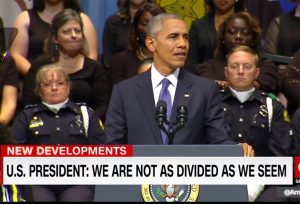
A big challenge — bold words delivered to an audience in mourning. He told us things we know, but things that are hard to hear while we’re in the middle of the suffering.
And he said, “The pain we feel may not soon pass, but my faith tells me that they did not die in vain. I believe our sorrow can make us a better country. I believe our righteous anger can be transformed into more justice and more peace. Weeping may endure for a night but I’m convinced joy comes in the morning.”
He reminded us of the promises made to Ezekiel I the old testament: “ ‘I will give you a new heart,’ ” the Lord says, ‘and put a new spirit in you. I will remove from you your heart of stone, and give you a heart of flesh.’ ” The President cited examples of those with such new hearts who had made progress possible, right here in Dallas. But still, we mourn.
Much earlier in my lifetime, a man I admired (who would not become president) stood on a street corner on the back of a flat-bed truck and talked about a terrible thing that had happened that day. Robert Kennedy told a small gathering of Africa Americans in Indianapolis that Dr. Martin Luther King Jr. had just been murdered. What was promised that day was wisdom, the same promise made to Ezekiel.
Quoting an ancient Greek playwright, Senator Robert Kennedy said,
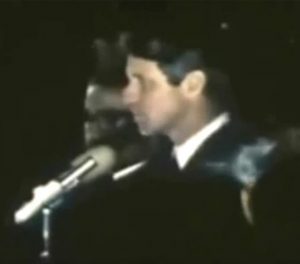
“Even in our sleep, pain, which cannot forget
falls drop by drop upon the heart until,
in our own despair, against our will,
comes wisdom
through the awful grace of God.
— Aeschylus
Paste into your browser and watch:
https://youtu.be/GoKzCff8Zbs
The pain that day did not go away, nor — as of this writing — has the promised wisdom arrived. In fact, two months later, June 6, 1968, two days before my high school graduation, Robert Kennedy was himself the victim of violent hatred. That was 48 years ago. And, across this nation, still we have not yet seen the wisdom nor the new heart.
What do we learn? If we’re paying attention, we earn that waiting for the wisdom and the new heart has not worked. I suppose that means that we have to do it ourselves, somehow. And, this week, we heard some suggestions – President Obama said,
“we can learn to stand in each other’s shoes and look at the world through each other’s eyes.”
And he said, “we can abandon the overheated rhetoric and the oversimplification that reduces whole categories of our fellow Americans, not just to opponents, but to enemies.”
And he said, “those protesting for change will guard against reckless language going forward.”
And he said, “police departments will acknowledge that, just like the rest of us, they’re not perfect. That insisting we do better to root out racial bias is not an attack on cops, but an effort to live up to our highest ideals.”
And he said, “we can worry less about which side has been wronged, and worry more about joining sides to do right.”
And, to bring us back to where he started, he said, “It turns out we do not persevere alone. Our character is not found in isolation. Hope does not arise by putting our fellow man down, it is found by lifting others up.”
These prescriptions for change sound simple. But, with the number of times we have tried to teach ourselves these lessons, and failed — that’s where the despair comes from — one can only hope that these things do not turn out to be impossible.
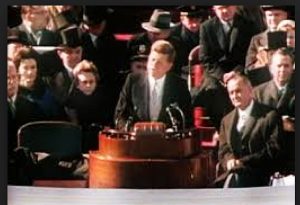 BUT, if we can persevere, we have been offered hope. Also in my lifetime, we were given another list of prescriptions for change that seemed daunting in their time. On January 20, 1961, President John F. Kennedy confronted the nation with such a list and summarized the challenge this way:
BUT, if we can persevere, we have been offered hope. Also in my lifetime, we were given another list of prescriptions for change that seemed daunting in their time. On January 20, 1961, President John F. Kennedy confronted the nation with such a list and summarized the challenge this way:
“All this will not be finished in the first one hundred days. Nor will it be finished in the first thousand days, nor even perhaps in our lifetime on this planet. But let us begin.”
Maybe the success is in the starting, not in the finishing. I suppose the “us” these leaders spoke of must be assembled one person at a time. So, where do I start? Where do you?
What answers can we offer? Even if they see too small and the challenges seem too great, let’s say them right out loud. “… let us begin.”
Download a PDF of this article: ConVivio_Dallas_July14_2016
![]()
American Independence Day — Brexit Number One???

“It ought to be commemorated,
as the Day of Deliverance
by solemn Acts of Devotion
to God Almighty
. . . solemnized with Pomp
and Parade, with Bells,
Bonfires, and illuminations
from one end of this continent
to the other.”
— John Adams, July 1776
It’s here, America’s national birthday! Flags are flying, there will be fireworks, concerts, and parades all across the land. Our national anthem will be played by bands and sung by soloists at every opportunity, and well it should be! For our red, white, and blue flag and the nation for which it flies has endured through hard and confusing times – beginning at its founding in the turbulent 18th century through to the present hard and confusing times here in the turbulent twenty-first. Congratulations to us all!
These two hundred forty years haven’t been easy. Of course, like most of the major inflection points remembered along the span of our history, this one is remembered with a focus on winning a war – the war for independence from the British Empire. OK, yes, the cleverest among us are welcome to call it The First Brexit, well, the exit from Britain by the British colonies of North America.
As such, the military victory itself was a bit of a surprise. Military buffs may be interested to know the details of the strength of Washington’s American army that defeated the powerful military force of what was arguably the largest empire the world has ever known. What did it take? On May 12, 1776, General Washington reported the Duty Roster of the Continental Army in a dispatch to the Congress as follows:
- Commissioned officers 589
- Non-commissioned officers 722
- Present and fit for duty 6,641
- Sick but present 547
- Sick but absent 352
- On furlough 66
- Absent without leave (AWOL) 1,122
That was the total strength of the American army. Stunning, eh?! How did it happen? Well, lots has been written about the war . . . but . . . the short answer is . . . well:
The French helped us. (Shhhhhhhh. Don’t tell anybody; some are still embarrassed.)
The Declaration
Even though our national anthem doesn’t mention it, we all know, of course, that Independence Day commemorates more than just winning a war. There were powerful ideas at work that made it happen. The ideas that flowed from the pen of Thomas Jefferson are still revered today, across America and in many parts of the world. A declaration published for all the world to see enumerated twenty-eight major grievances against the British King and eloquently proclaimed the necessity “for one people to dissolve the political bands which have connected them with another, and to assume among the powers of the earth, the separate and equal station to which the Laws of Nature and of Nature’s God entitle them.” In the document, the king was defined as a tyrant “. . . unfit to be ruler of a free people.” Finally, after claiming the right “to do all other Acts and Things which Independent States may of right do,” the fifty-six signers of the document pledged their fealty to the values they held most dear: “And for the support of this Declaration, with a firm reliance on the protection of divine Providence, we mutually pledge to each other our Lives, our Fortunes and our sacred Honor.”
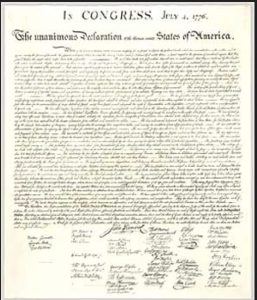
The debate in the Second Continental Congress on whether to adopt the declaration was vigorous and required some significant compromises – including what many refer to the ‘Original Sin’ of the American experiment in democracy. In Jefferson’s original draft, he included the following statement among his grievances against the king:
“he has waged cruel war against human nature itself, violating its most sacred rights of life and liberty in the persons of a distant people who never offended him, captivating and carrying them into slavery in another hemisphere, or to endure miserable death in their transportation hither. this piratical warfare, the opprobrium of infidel powers, is the warfare of the Christian king of Great Britain. determined to keep open a market where MEN should be bought and sold …”
This clause caused a loud uproar among the southern slaveholders (of which Jefferson was one). To prevent the southern colonies from walking out of the Congress, this clause in Jefferson’s original draft had to be removed. So, the required unanimous vote of the thirteen colonies to separate from England as a new nation required a commitment to slavery. John Adams predicted to Benjamin Franklin (his actual words) “Mark me, Franklin. If we give in on this issue, there will be trouble one hundred years hence. Posterity will never forgive us.” Remarkably, his ‘prediction’ (the Civil War) came true almost ninety years later. Formal recognition of equal rights for the descendants of American slaves wasn’t enshrined in law until a hundred years after that.
And, yes, we’re still working on it.
The Fourth of July
Finally, the solemn celebration of the historic day the Second Continental Congress voted unanimously to approve the declaration formally breaking away from Britain (Brexiting?) has taken place for the past 240 years on July 4. Once again, John Adams predicted how this occasion would be celebrated (again, his own words in a letter to his wife Abigail on July 3 1776):
“I am apt to believe that it will be celebrated, by succeeding Generations, as the great anniversary Festival. It ought to be commemorated, as the Day of Deliverance by solemn Acts of Devotion to God Almighty. It ought to be solemnized with Pomp and Parade, with Shows, Games, Sports, Guns, Bells, Bonfires and Illuminations from one End of this Continent to the other from this Time forward forever more.”
So, did we get it right? Well, almost. Adams was talking about the day the declaration was approved in the Second Continental Congress. The day to be celebrated? July 2nd, 1776.

Adams’ letter to Abigail, July 3, 1776 (the quote is top of page three)
Happy Independence Day!
Click to download a PDF of this article: ConVivio_July4_2016 ![]()
P.S. Why did the date July 4 appear on the declaration as it comes down to us today? While the vote was taken on July 2 (the actual event to be celebrated), July 4 was the date the document was printed, distributed, and read from street corners, churches, and other meeting halls throughout the colonies. An aside — the 56 signatures that appear on the document took several months to be actually penned. Congress made a rule that no one would be allowed to sit in the Congress without affixing their name to the founding document; so, some of those names represent people who were not present on July 2.
Chasing the Shade
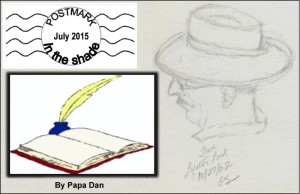 I am sitting at my desk staring at the tip of my fountain pen, hoping for some inspiration; but the words are not coming — not an unfamiliar experience for me. Ideas, of course, come and go in various stages of completeness, sometimes stimulated by world events, other times from personal experience or reading, and most often from observing other people.
I am sitting at my desk staring at the tip of my fountain pen, hoping for some inspiration; but the words are not coming — not an unfamiliar experience for me. Ideas, of course, come and go in various stages of completeness, sometimes stimulated by world events, other times from personal experience or reading, and most often from observing other people.
Among those ‘other people,’ I have had the privilege of being exposed to some terrific writers over the course of my lifelong education, people like Wilder and Poe, Hemingway and Fitzgerald, Steinbeck and Twain, Frost and DeVore. Some of them made a habit of offering advice to other writers. So, at times of ‘drought’ like these, I’ve dutifully looked to them for guidance.
Staring again at the tip of this fountain pen trying to write my own story, I find that those writers offer a wealth of advice that sometimes seems to be aimed directly at me. Hemingway, the writing teacher I will quote today, is particularly generous with what sounds at first like such simple advice. He compares himself to other writers to provide guidance on the use of language: “Poor Faulkner – does he really think big emotions come from big words? He thinks I don’t know the ten-dollar words. I know them, alright, but there are older and simpler and better words, and those are the ones I use.” That sounds reassuring: use simple words, tell simple stories about real people.
But then, sometimes he can also be a powerfully intimidating teacher of what it takes to be a writer. “All good books,” he wrote, “are alike in that they are truer than if they had really happened; and, after you are finished reading one, you will feel that all that happened to you and afterwards, it all belongs to you; the good and the bad, the ecstasy and the remorse and sorrow, the people and the places, and how the weather was. If you can get so that you can give that to people, then you are a writer.”
Oh. That’s what I have to do?! Can I do that? Seems like such a tall order! At least I can emulate his occasional use of long sentences.
I think he tried to be comforting with simpler advice when he wrote: “The most essential gift for a good writer is a built-in, shock-proof shit detector. This is the writer’s radar and all the great writers have had it.” And then, he offers more comfort: “I write one page of masterpiece to ninety-one pages of shit. I try to put the shit in the wastebasket.”
And then, he provides specific guidance from his own process: “Write drunk. Edit sober.”
Having gotten the specific advice out of the way, I look for examples to imitate and I find one – simple instructions for improving one’s mood, again from Hemingway, no shit for the wastebasket, strung together into a single long sentence:
“As I ate the oysters with their strong taste of the sea and their faint metallic taste that the cold white wine washed away leaving only the sea taste and the succulent texture, and as I drank their cold liquid from each shell and washed it down with the crisp taste of the wine, I lost the empty feeling and began to be happy and to make plans.”
From the small and simple details of taste and texture can come powerful feelings that can make a difference. Hemingway sneaks up on you. I look up from his words and say to myself. “I could have written that.” But I stare at the fountain pen and acknowledge the equally simple truth: ”But I didn’t.”
Staring again at the tip of my fountain pen, my mind wanders from Hemingway’s sentence to two simpler, shorter, and more powerful sentences than anything I could have written. These came from two friends of mine, both of whom have been fighting cancer – one for a short time, one for a long time. Katie had shared her feelings in an email shortly after her diagnosis. She wrote about her attempt to bring back the comfort of the time before the cancer. She described an afternoon in the backyard with a task that seemed simple — walk out to the Adirondack chair and sit in the shade with a book and a glass of cold chardonnay. Seeking comfort in the backyard turned out to be a search for a respite from too much of even a good thing like sunshine. A few feet away a lemon tree was providing shade; so the next task was to seek the protection of the stationary tree from the glare of the sun.
As she positions the chair under the tree and gets comfortable in its shade, it didn’t take long to confront the illusion. The shade seemed stationary; and yet, in the words of Galileo (as an apology for having saved himself by denying the truth) “eppur si muove” “and yet it moves.”
We always seem to seek that illusion of permanence, don’t we — that the sunshine or the shade, whichever we prefer at the moment, will stay put, right where we want it? After some experience, we know better, don’t we? Is it merely the subconscious hope that something comfortable, stable, and safe, can be captured and held close to us? Maybe we eventually learn that growing up is the act of admitting to ourselves, and accepting, that everything in the universe, everything in the world, everything in ourselves, is moving. After that ‘simple’ observation, we try to anticipate that motion and move the chair to the place where the shade will end up, and we experience the further truth that nothing really moves in a straight line.
Damn. It was looking simple there for a while.
And then, there’s my oldest friend Lew. We met in the dorm at Santa Clara University in 1968 and I have watched him fight cancer for years in one successful battle after another, and then again more recently, leading to a series of treatments that concluded just before flying off to Europe for our long-planned vacation to Italy and France. On the train in Italy, Lew, his wife Rita, and Gretta and I joked that Italian food and French wine were probably the most powerful weapons he could wield against the disease. It was a great trip: the sweetness of Varenna on Lake Como, the bright warm sunshine of the French Riviera, and the calm pastoral setting of the wine country of Provence – a series of ‘treatments’ as healing as anything one could imagine.
Now for the simple, powerful sentences I promised —
A few days after returning to California came the lab tests and an appointment with the doctor to learn how effective the treatments had been. And our phone rang. It was Lew with as simple and powerful a sentence as anything Hemingway might have written: “My PSA is zero and they can’t find cancer anywhere in my body.”
Back to Katie in the Adirondack chair, after getting test results from her doctor, it became simple once again. “There’s news,” she wrote, “I’m clean; I’m clean.”
And now, with all of us back in the shade once again, I’m ready to put the pen to the paper …
Download a PDF of this post: Chasing_The_Shade_ConVivio_July22_2015
Yosemite: Of Permanence, Change, and a Sense of Wonder
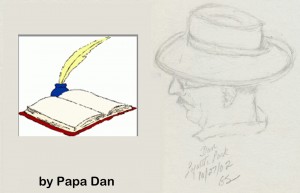 Even (maybe especially) after a few dozen visits to this magical place, a powerful sense of wonder is always present. I am sitting near the back of the Ahwahnee Hotel’s Great Room in Yosemite Valley, accompanied by the family artist (Gretta), a glass of Sonoma County Pinot Noir (from Flowers Winery), and an iPad; my eye drifts up to the gigantic ceiling, built in 1927 and festooned with an Ahwahneechi tapestry, woven deep red, blue, gold, and black, above the six-by-ten-foot fireplace and illuminated by four immense iron candelabra, electrified only in recent decades.
Even (maybe especially) after a few dozen visits to this magical place, a powerful sense of wonder is always present. I am sitting near the back of the Ahwahnee Hotel’s Great Room in Yosemite Valley, accompanied by the family artist (Gretta), a glass of Sonoma County Pinot Noir (from Flowers Winery), and an iPad; my eye drifts up to the gigantic ceiling, built in 1927 and festooned with an Ahwahneechi tapestry, woven deep red, blue, gold, and black, above the six-by-ten-foot fireplace and illuminated by four immense iron candelabra, electrified only in recent decades.
The view from here, positioned behind two thickly covered grand pianos, speaks of enduring elegance, respectfully built on ancient Native American roots, offered here for those who would take their place where presidents, magnates of industry, backpackers, and parents with children on Spring Break have quietly relaxed since before anyone knew there would be either a Great Depression or Great Recession from which to recover. A crew of uniformed servers quietly prepares the afternoon tea-and-cookies service for those who drift in from their day in the woods.
 From recent experience, I know that the grandest of the pianos will be uncovered soon, to be employed with the collaboration of Mozart and others to set a mood that alternates between quiet contemplation and festive revelry. Remarkably for those of us mired in the 21st century, the wood-carved sign at the entrance to this Great Room, reminding those who enter to be on their best behavior, is respected and obeyed, evident in the obviously coached youngsters who speak in hushed (for them) tones as they enjoy surroundings that even they know deserve some respect.
From recent experience, I know that the grandest of the pianos will be uncovered soon, to be employed with the collaboration of Mozart and others to set a mood that alternates between quiet contemplation and festive revelry. Remarkably for those of us mired in the 21st century, the wood-carved sign at the entrance to this Great Room, reminding those who enter to be on their best behavior, is respected and obeyed, evident in the obviously coached youngsters who speak in hushed (for them) tones as they enjoy surroundings that even they know deserve some respect.
Today is a surprise. Yosemite has not been immune to the ravages of California’s four-year-and-counting drought, demonstrated by weaker-than-usual waterfalls, above-average temperatures, and NO recent snowfall. But today, April 5th, is different — today we all woke up to falling snowflakes as big as cottonballs and the low temperatures that Yosemite’s regular visitors had come to expect this time of year. So, the snow clothes and smiling faces began gathering in front of the giant fireplace by mid-afternoon.
Precisely at four, a well-dressed gentleman arrives, wheels in his own particular chair, uncovers the piano, becomes comfortable before the keys, and changes entirely the color and flavor of the giant room, using his own particular brand of concentration, without need of sheet music. Activity in the room, however, does not change — gentlemen wearing baseball caps still relax on colorful sofas, dads in snow clothes still wheel baby strollers into the space in front of the fire, accompanied by moms directing toddlers and school kids to their appointed places to divest themselves of wet clothes, carefully hung to dry on the hearth, revealing the activities of the season — gloves and mittens that had been throwing snowballs, stocking hats that had kept ears warm but not dry, boots that had been crunching across the first (and last?) thick snow of Spring, and snow pants that had been crawling on the snow as the older children rolled big balls of ice to create the torsos of snowmen. The music rises to the rafters, not needing volume to command the attention of the room, but not interrupting the business of families doing what they came here to do.
Chopin makes an appearance, again without benefit of sheet music – the gentleman lost in his own enjoyment — not limiting himself to the first movements of pieces most may recognize, but retelling masterworks in their entirety. The room is now filled with the dual majesty of the music inside and the mountains outside. People from multiple generations, classes, and ethnicities read their books, discuss their topics, sip their teas and wines, draw their pictures, and yes, write their words — all under the watchful eyes of Half Dome and Yosemite Falls, peering in through the high windows on opposite sides of this magnificent room.
The multiple personalities of the Spirit of Yosemite make their presence known, even through those high windows — Half Dome, out one window, stands as a dark chocolate truffle, sprinkled with powdered sugar that someone cut in half to see if it’s the one with a raspberry inside. It’s not, but worth the cut to find out. Out the opposite window, Yosemite Falls, diminished in volume by a drought-ish and warm winter, pours its modest goodness into a splash of mist just visible between tall, straight evergreens and bare, spreading oaks.
 Tchaikovsky appears, as does sheet music for the first time, as a young girl slides up to look over the gentleman’s shoulder at the piano. She steps progressively closer as the music gets more animated, eyes wide, alternately staring at the sheet music and at hands on the keys, all the while bouncing with her hands and arms, revealing some experience of her own at the keyboard. At the end of the piece, he leans back, points at the sheet music, and says to the girl, “Look. It’s not that hard. You could do it.”
Tchaikovsky appears, as does sheet music for the first time, as a young girl slides up to look over the gentleman’s shoulder at the piano. She steps progressively closer as the music gets more animated, eyes wide, alternately staring at the sheet music and at hands on the keys, all the while bouncing with her hands and arms, revealing some experience of her own at the keyboard. At the end of the piece, he leans back, points at the sheet music, and says to the girl, “Look. It’s not that hard. You could do it.”
This is, of course, just a snapshot, a small glimpse in time and space. We can wander from this room to stand before — or even atop — other great natural wonders of our continent: Vernal and Nevada Falls, Mirror Lake, the Merced River, Glacier Point, and rock faces carved by forces we humans cannot duplicate and that we do not live long enough to witness in our collective lifetime on this planet. A snapshot is all we have ever seen; but we continue to imagine the part of the snapshot cropped out of our view, before and after the time and space we occupy.
Why do we come here? Is it for the mountains – appearing larger and more permanent than anything that has surrounded us anywhere else? Or is it the water — to see what it can do when it arrives with power from far above us? Do we come here to be in the presence of creatures — bears and deer, birds and coyote, and their compatriots — not familiar in our neighborhoods back home? Maybe, without realizing, we come to experience the simultaneous work of permanence and change: two illusions who conspire to fool us into thinking we understand the rhythm of this life, only to surprise us by revealing things and ideas hiding in plain sight, that have always been there waiting for us to discover them anew. Are we proud to see that we can erect what we believe to be enduring human elegance, like this grand hotel, amid the seemingly transitory elegance that pours out of the granite for moments and is then gone — over and over, across millions of years that we believe we can count but can really only imagine? Do we come here to listen to the voices that remind us that the things we consider ‘permanent’ are not so permanent to Yosemite — that permanence and change might just be two sides of the same stream? Do we come here to escape the hopelessness we read in the newspaper, which I am reminded to put away when I enter this cathedral of nature? Does our presence here expose a glimmer of hope that parents still bring their children here — as an investment in the future? Perhaps it is that same ever-present sense of wonder, with which I arrived, that brings me back and back again.
Grace — What Child Is This?
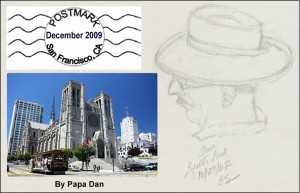
San Francisco, CA — This time of year, as the temperature drops and the earth gets ready to rest for a season, we find ourselves preparing feverishly to celebrate the holidays. For some, holiday celebrations are comforting in their permanence — many among us maintain family traditions, often religious, that remain unchanged for generations.
For others, each new emerging generation brings its own sense of celebration to the season — the tastes and smells, sounds and images, rituals and stories. And so, for many of us, our experience of the winter holidays changes over time.
For us, Papa Dan and Grandma Gretta, an enduring tradition is a day focused on the inspiring music of Grace Cathedral, at the top of San Francisco’s Nob Hill. There is much that has drawn me to Grace cathedral. First and central is the music of the annual Christmas Concert of their Men’s and Boys’ Chorus (all volunteers), orchestra, and pipe organ. Under the current direction of Benjamin Bachmann, the music is a fabulous celebration of Christmas —surrounding their signature piece, Sleeps Judea Fair, with tunes that span the space from the Flemish traditional Cradle Song, to the 16th-century Latin Gaudete, 18th-century Mendelssohn (Hark, the Herald Angels Sing), 19th-century French traditional (Masters in This Hall), to mid-20th century compositions and arrangements by the famous John Rutter (like The Holly and the Ivy) — most of which you would recognize when you heard them. At the mid-point of the evening, while the young and old voices take a rest, a string quartet performs something familiar, usually a classical holiday piece from Mozart, Handel, or the like. This night, however, we were treated to a version of What Child Is This? that got me to thinking about what really draws me to this music and this cathedral at this time of year. More than just the birth of a particular baby 2000 years ago; more than the attraction of a modern cathedral built as an integration of “Gothic” architecture and the humanistic tidal wave of the Italian Renaissance 500 years ago; plunked down 100 years ago in the middle of a very secular, very humanist West Coast city. This holiday at this cathedral is much more.
The cathedral community itself is devoted to a remarkable motto: “We believe in one God, known to us in Jesus Christ, also known by different names in different traditions. We seek to challenge and transform the world, beginning with ourselves, and to celebrate the image of God in every person. We are a house of prayer, worship, and service for everyone, welcoming all who seek an inclusive community of love.”
What does this say to me? It says that the Grace cathedral community believes in a God that is known to them in a certain way, embodied in a particular person with a long tradition, AND at the same time recognizes that others believe in a God that may have different names, different traditions, and is great enough to be included in a much wider community. This particular community calls itself “a house of prayer for all people.” While it is the cathedral church of a particular diocese of a particular Protestant denomination in California, it takes responsibility for being a destination for tourists and pilgrims, a focal point for the community during times of celebration and mourning, a parish church to a vibrant, inclusive resident congregation, and “home” to hundreds — hundreds — of homeless people who sleep in its basement every night— every night — of the year. It is a place that has hosted preachers from Bishop Pike to The Reverend Dr. Martin Luther King Jr. It is a living repository of great art, from the “Art in Glass” of its famous storytelling windows; to Ansel Adams’ unique Grace Cathedral series of photographs, to the “Bible in Bronze” of its front door —the world’s second copy of the famous Gates of Paradise (so named by Michelangelo), the 15th century masterpiece by Lorenzo Ghiberti that began the Florentine Renaissance at the cathedral of Santa Maria del Fiore, ‘Il Duomo,’ in Florence. Ghiberti’s doors are significant in that they depict scenes that are shared by the three world faiths of the west; Judaism, Christianity, and Islam.
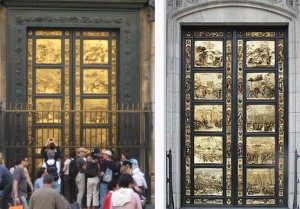
Ghiberti's Doors: Florence (left) and San Francisco (right)
But I digress . . . What does all of this have to do with an unusual rendition of What Child Is This? that I was talking about a few paragraphs ago? Let’s review it and give it another listen. After an energetic, but fairly traditional, first run-through of the very familiar “Greensleeves” tune, a second rendition of the melody seemed to ask a very different question. The original song that we all grew up hearing asks in amazement what kind of child can attract such attention from three wise men from the east, shepherds and their flocks, stars pointing the way, and angels singing. The answer it has always offered is that “the babe, the son of Mary” “is Christ the King.” The second time through, however, these four talented musicians, playing three violins and a cello, used the Jeremy Cohen arrangement, which dropped down into a minor key, leaving behind the certainty of the original piece and giving the cathedral audience a more questioning, inquiring, wondering impression.
So, after twenty centuries, do we here and now understand “what child” can come to the rescue of a weary and troubled world? Does the song, rendered in this way, ask us only to look back in awe at a child born so long ago to in troubled time and troubled homeland? Is it possible that the child — the children — that are our salvation and our hope in these troubled times are those children born to our young parents right here and right now in our own cities across the world?
I recall when Father Jim Keeley, years ago, preached in church that we should focus on “the reason for the season,” which in our own religious tradition was so obvious to us back then. I can’t help but think that, for me, Papa Dan, just another average grandfather to five little ‘hopes for the future,’ perhaps ‘the reason for the season’ can take on a broader, more familiar, more hopeful face.

A 'Reason for the Season,' like yours, just one of mine
My wish for all of you, so generous with your time to read this little page, whether for you it is Christmas, Hanukkah, Al-Hijira, Kwanzaa, Winter Solstice, or Festivus (for the Rest of Us), is that your own ‘reason(s) for the season’ will be happy, healthy, and safe as you summon traditions — old and new — to prepare the way for the coming of the future that will be in their hands.
∞ ∞ ∞ ∞ ∞ ∞ ∞ ∞ ∞ ∞ ∞∞ ∞ ∞ ∞ ∞
For more information about the history and art of Grace cathedral as it begins its 100th year, take a look at:
http://www.gracecathedral.org/content/arts/ghiberti/
![]()
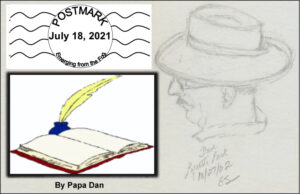
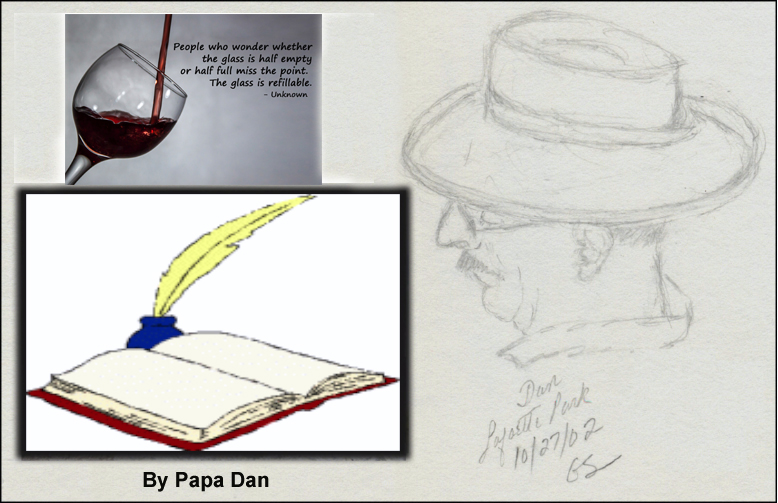
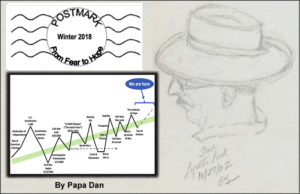
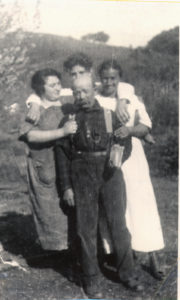 We’ve been taught to hope by people with a lot of experience.
We’ve been taught to hope by people with a lot of experience.
